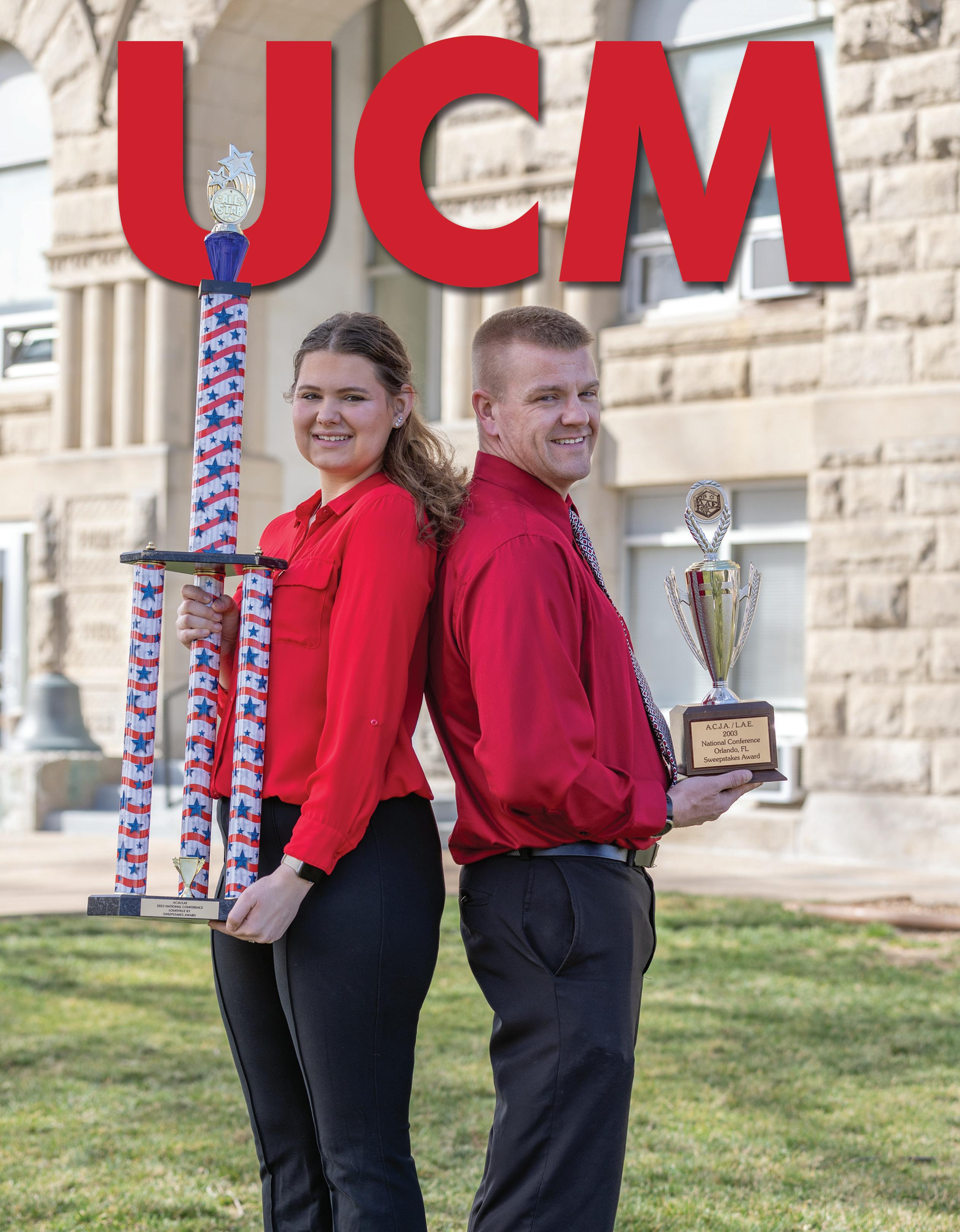
SPRING 2024 SPRING 2024 The Justice League UCM Criminal Justice Sets Standard of Excellence Ways to Prevent 7 Ways to Prevent 7 The Justice League UCM Criminal Justice Sets Standard of Excellence Cybercrime Cybercrime
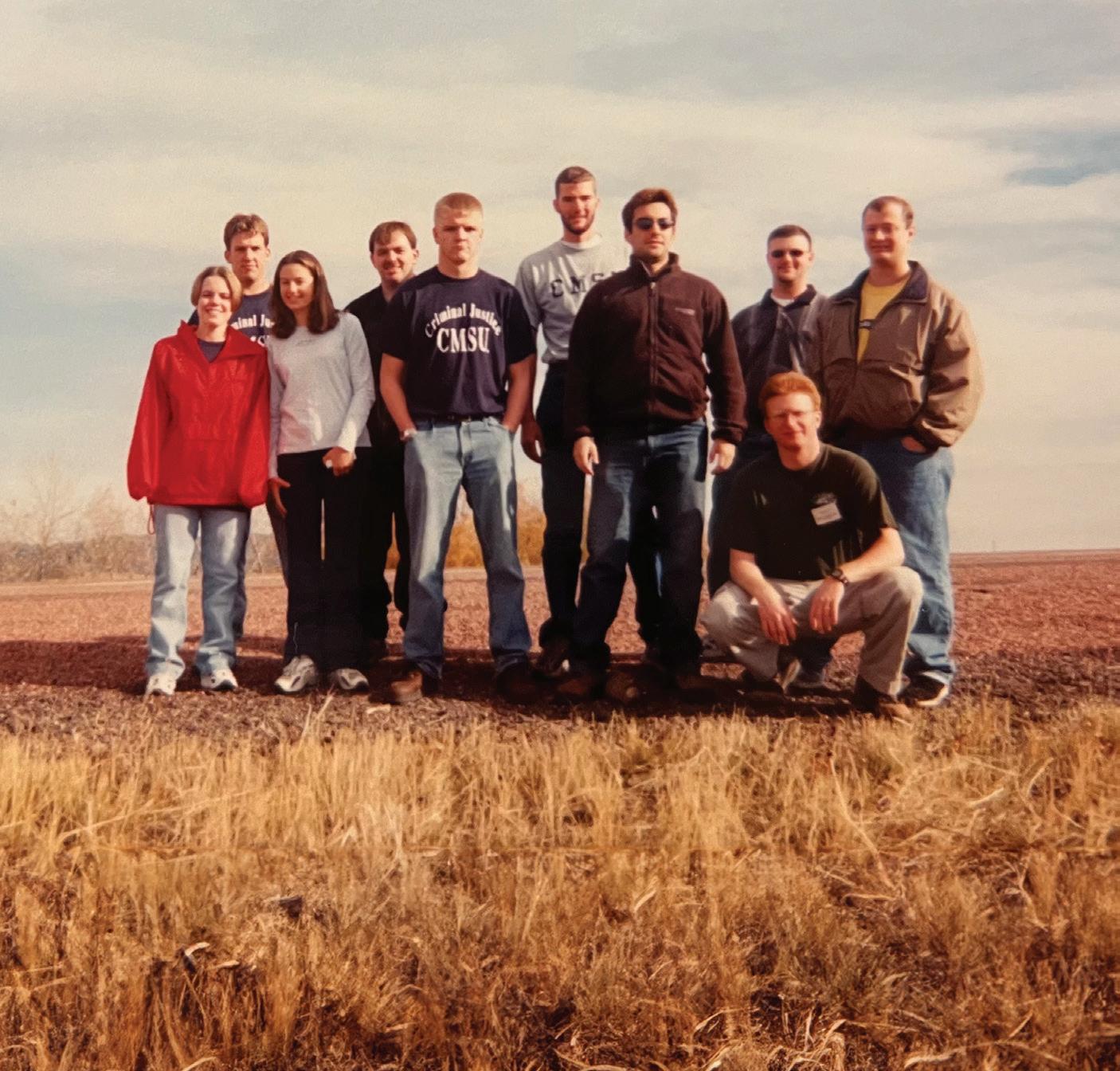
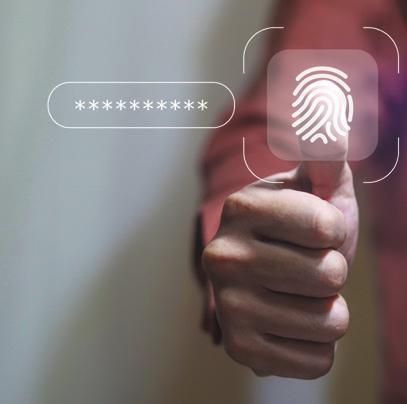
Cybersecurity Threats and Solutions
“The Privacy Professor” shares 7 tips for protecting your privacy online.
Plus, a UCM student fights cybercrime on an international stage with the U.S. Cyber Team. Page 19
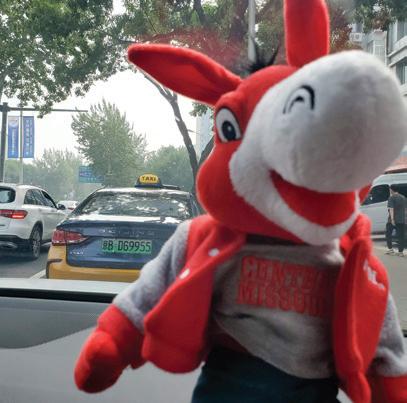
Mo Goes Global
Mule mascot travels the world with UCM’s international recruiters to find the next class of Mules and Jennies.

Exploring Artificial Intelligence
In this installment of UCM News, faculty weigh in on AI in higher education. See if you can spot the differences between a nostalgic photo of the student union and an AI-modified version.
INSIDE THIS ISSUE
A Reputation for Justice — Then & Now
Meet the students and faculty who keep the UCM Criminal Justice and Criminology program at the pinnacle of excellence in the classroom and in national competition.
Plus, starting in fall 2024, UCM is offering an interdisciplinary mental health certificate that will give students and professionals, including those in law enforcement, practical approaches and a better understanding. Page 7
On the cover: Emma Klein, 2023–24 president of UCM’s Lambda Alpha Epsilon (LAE) student chapter, and Professor Scott Chenault, a member of the 2003 chapter, show off their trophies spanning a 20-year national winning streak. Photo by John Kennedy
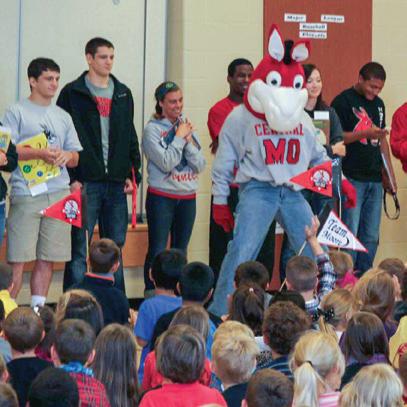
Hughes’ Legacy Continues
UCM’s Multipurpose Building is now the Jerry M. Hughes Athletics Center, and student-athletes get national recognition for continuing the Literacy Team he started 32 years ago.
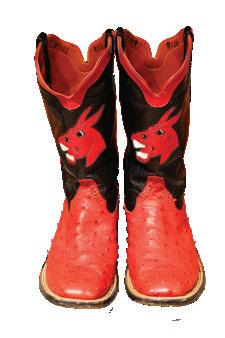

Breaking Barriers
Alumni couple creates a UCM scholarship for Kansas City students who participated in an Operation Breakthrough program funded by Travis Kelce’s Eighty-Seven and Running Foundation.
Share letters to the editor and story ideas at ucmmagazine@ucmo.edu.
1 President’s Message 20 Philanthropy News 28 UCM News 31 UCM Athletics 34 MuleNation News 36 Class Notes 38 Planned Giving 40 In Memoriam 44 Parting Shots DEPARTMENTS FIND US ONLINE UCMFOUNDATION.ORG/MAGAZINE @UCMALUMNIFOUNDATION @UCM_ALUM @UCM_ALUM EMAIL US AT ALUMNI@UCMO.EDU @ 2
14 22 28 31 38
WE WANT
FEEDBACK!
YOUR
UCM’s team at the 2000 LAE Regional Championship.
UCM
MAGAZINE
SPRING 2024, Vol. 23, No. 1
EXECUTIVE EDITOR
Kathy Strickland
ART DIRECTOR
Linda Harris, ’91, ’24
CONTRIBUTING STAFF
Eric Boedeker, ’14
Tiffany Cochran, ’05, ’23
Tyler Habiger, ’24
Darice Heishman
Jackie Jackson, ’09, ’12
John Kennedy, ’92, ’13
Jeff Murphy, ’80, ’95
Cloe Pohlman
An Quigley, ’94
Jenny Ramsay, ’15, ’19
Travis Seek, ’16
Jessica Tart
Jace Uchtman, ’24
Brittan Williams, ’15
© 2024 by University of Central Missouri. All rights reserved. Views and submitted content do not necessarily reflect the opinions or policies of UCM Magazine, the UCM Alumni Foundation or the University of Central Missouri. Find us online: ucmfoundation.org/magazine.
Submit address updates at ucmfoundation.org/update, by email at alumni@ucmo.edu or by phone at 660-543-8000.
UCM Magazine is published biannually by the University of Central Missouri, Warrensburg, MO 64093. Printed by Walsworth, 803 South Missouri, Marceline, MO 64658.
POSTMASTER: Send address changes to UCM Magazine, Smiser Alumni Center, University of Central Missouri, Warrensburg, MO 64093
To view the University of Central Missouri’s Nondiscrimination/Equal Opportunity Statement, visit ucmo.edu/nondiscrimination.
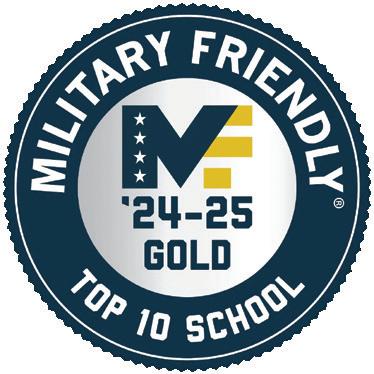
UCM was ranked third among large public universities in the U.S.
UCM GRADUATES READY TO MAKE A DIFFERENCE AMID GLOBAL CHALLENGES
A
s we conclude another academic year, we have much to be grateful for at the University of Central Missouri. The daily creative, innovative and academically rigorous work of our dedicated faculty, staff and students results in not only prestigious recognitions for the university throughout the year but also notable moments of personal achievement.
It is gratifying to see this work culminate in the graduation of our students as they experience what comes next, knowing they are prepared to perform on a world stage as a result of their time at UCM. So many will be tackling some of the nation’s and the world’s most pressing issues. One of the great challenges facing our modern society, for example, is the existence and persistence of crime, particularly crime that is exacerbated by bad actors who are turning the technology we rely on every day into tools to carry out misdeeds for their own benefit.
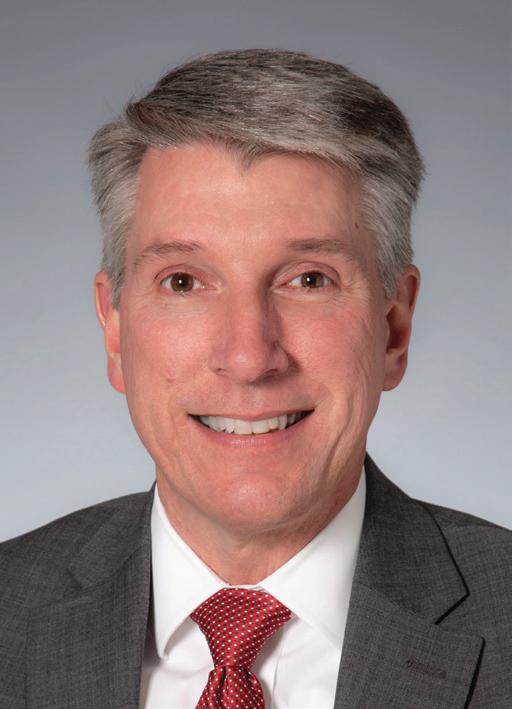
True to our “Education for Service” motto, students, faculty and alumni from the UCM Cybersecurity program — which is a National Center of Academic Excellence in Cyber Defense — continue to demonstrate they are up to this critical task. Additionally, the need for cybersecurity professionals is highlighted by an alumna with years of experience, who goes by the moniker “The Privacy Professor,” as she shares critical tips for us all.
In this issue of UCM Magazine, we also highlight the UCM Criminal Justice and Criminology (CJC) program, one of the oldest and best in the United States. You will learn about students and faculty in the Gamma Epsilon Delta chapter of the American Criminal Justice Association who have enjoyed decades-long success in the Lambda Alpha Epsilon competitions against teams from universities across the country. They demonstrate the skills they learn in UCM’s CJC program through crime scene investigation, physical agility, firearms and academic contests.
In the UCM News section of this issue, faculty members from several departments chime in on artificial intelligence (AI), an emerging technology that raises concerns but holds tremendous promise for higher education and beyond.
As you peruse this issue, we hope you enjoy the engaging photos our international recruiters have taken on trips around the world with a plush Mo the Mule, spreading the word about a one-of-a-kind university community in the middle of the U.S.
In the Athletics section, you will learn about the Jerry M. Hughes Athletics Center dedication and how Mules and Jennies student-athletes are taking up the work of literacy ambassadors at local schools, maintaining a tradition started by the late athletics director.
Thank you for staying connected to the University of Central Missouri! Your connectedness and support are key reasons we continue to redefine what’s possible for our students, faculty and staff.
 Roger J. Best, Ph.D. UCM President
Roger J. Best, Ph.D. UCM President
University of Central Missouri Magazine 1
Justice League The
By Kathy Strickland
Itwas 2003, and a van full of students was on its way to Orlando, Florida. There would be no fairytale welcome when they arrived; they were headed to the scene of a homicide.
But that was just one thing on their minds. There would also be shooting, which is why they were glad to have sharpshooter
Major Richard Gillespie, ’02, on their side. Not to mention hundreds of other young people like them from across the country, whom they would have to take on face-to-face.
“I was in class at the academy with people who had no college experience, and learning the basics of criminal justice really gave me an advantage.”
they arrived at the crime scene, Chenault and two of his top teammates were briefed on the situation. They slid on their latex gloves and shoe coverings, then pushed open the door to the room where the homicide had taken place.
– Erin Pape, Criminal Justice and LAE Alumna
Scott Chenault, ’02, ’04, was their leader, in his first year of graduate school in the Criminal Justice program at what was then Central Missouri State University (now the University of Central Missouri). He’d learned the ropes as an undergrad, and he was sharp as a tack. He’d cracked cases like this before, taking home badges of honor in the most nerve-racking tests of crime-fighting prowess and physical agility.
Chenault and Gillespie took turns driving through the night. When
Standing in the doorway, they took in every detail, making note of things that were awry — questions they’d need to ask witnesses, objects and surfaces they’d want to test for fingerprints, debris left behind that they would send off to the lab — in short, everything they would do if they were real crime scene investigators.
CMSU was a small fish in a big pond, with much larger teams from schools across the country — including doctoral universities — competing for the American Criminal Justice Association Lambda Alpha Epsilon (ACJA-LAE) national title. They did not yet have official team practice sessions, but these students had one of the nation’s best Criminal Justice programs as their training ground in Warrensburg.
Spring 2024 | ucmfoundation.org/magazine


 Members of the fledgling team at the 2000 ACJA-LAE Regional Championship in Sheridan, Wyoming: from left, Erin Pape, Greg Roman, Melissa Bauer, Eric Doerflen, Scott Chenault, Chris Peterein, Johan Nystrom, Brian Lick, Josh Peery and Jordan Hargove (kneeling).
Students who led UCM’s LAE team at the 2000 Regional Conference: Scott Chenault, vice president; Erin Pape, secretary; and Darrell Schmidli, president.
Members of the fledgling team at the 2000 ACJA-LAE Regional Championship in Sheridan, Wyoming: from left, Erin Pape, Greg Roman, Melissa Bauer, Eric Doerflen, Scott Chenault, Chris Peterein, Johan Nystrom, Brian Lick, Josh Peery and Jordan Hargove (kneeling).
Students who led UCM’s LAE team at the 2000 Regional Conference: Scott Chenault, vice president; Erin Pape, secretary; and Darrell Schmidli, president.
The Criminal Justice Students Who Launched a 20-Year Winning Streak
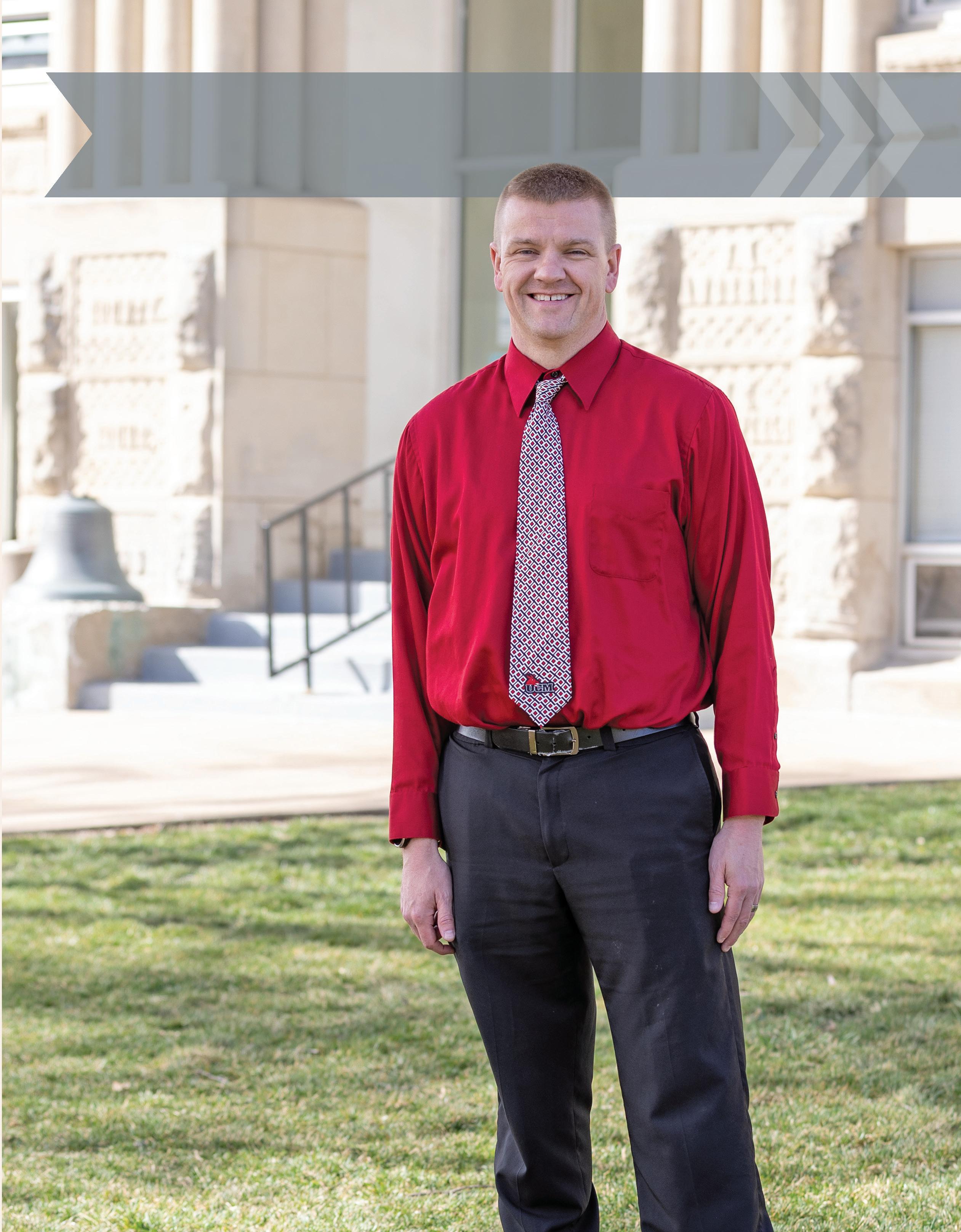
“ Whether we’re talking about higher education or vocational training, the single best and most sure way to get ahead, to rise above whatever circumstances you’re from, is education.”
— Scott Chenault, Criminal Justice and Criminology Professor and CJ/LAE Alumnus
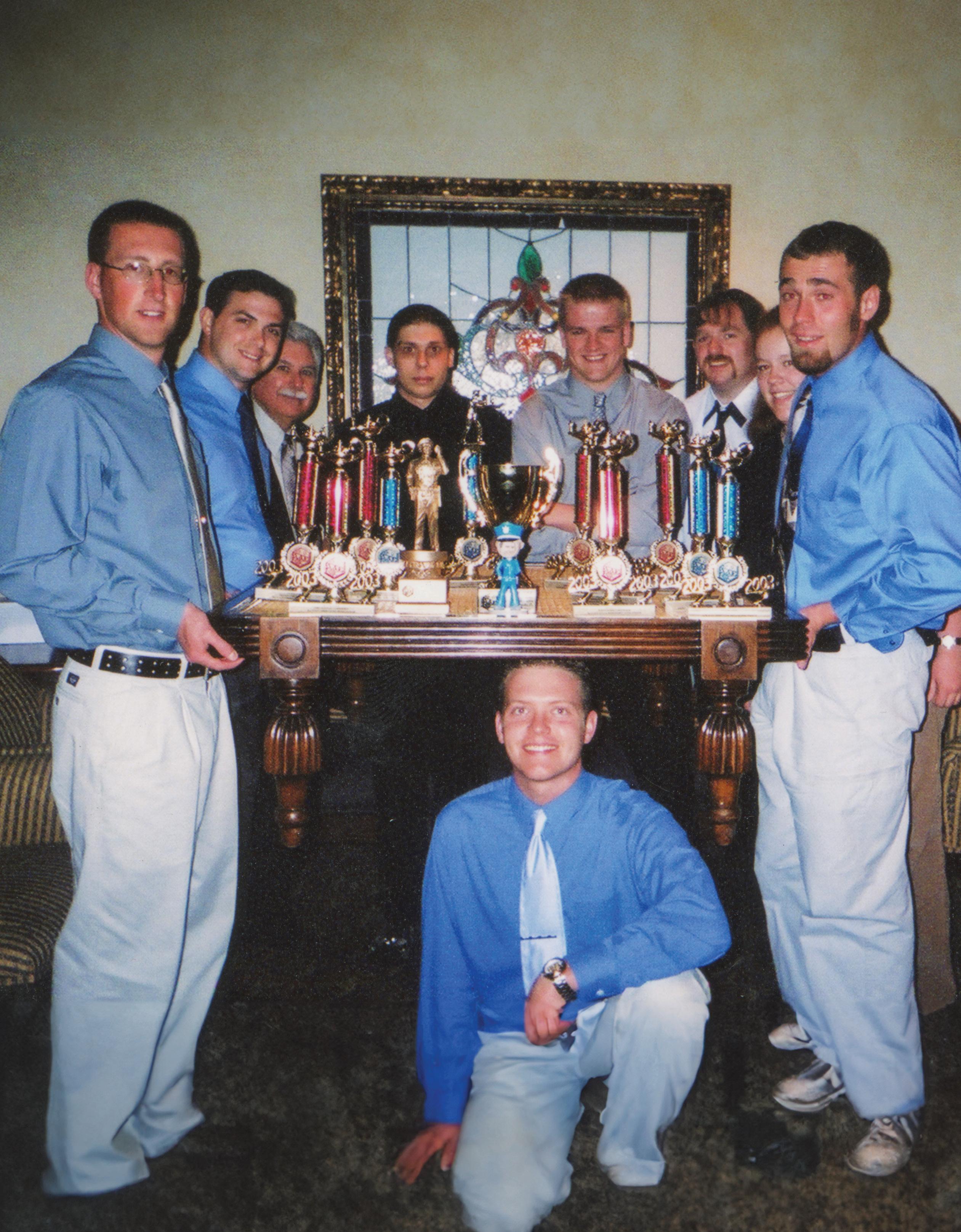
“Very few teams just went out there and competed with what knowledge they learned in the classroom,” says Josh Peery, ’03, one of the students who helped revive CMSU’s team in the early 2000s and now serves as deputy director of the Northern Parole Region for the Kansas Department of Corrections. “We weren’t anticipating coming back with so many trophies and had to make room in the van.”
Instead of a van, students in the university’s LAE Gamma Epsilon Delta (GED) chapter now take a bus to the competition. A roster of fewer than 10 has grown to more than 30 members who practice two to three times a week. But what hasn’t changed is the level of education that gives them a solid foundation in the knowledge and skills necessary to rival teams from even the most prestigious universities in the LAE national conference.
Real-Life Learning
In addition to faculty members with decades of experience in the field, what continues to set UCM’s Criminal Justice and Criminology (CJC) program apart is students’ exposure to different branches of the criminal justice system.
The Missouri Court of Appeals has been holding oral arguments on campus for 25 years, thanks to Professor Emeritus Dane Miller, ’77, who taught at the university from 1977 to 2015. The annual event has since been carried on by Associate Professor Benecia Carmack. Classes regularly welcome guest speakers and visit courts, jails, police offices and juvenile facilities in the region.
It was during a trip to the Kansas City Police Academy as a student that Davenport Police Corporal Erin (Whitney) Pape, ’01, ’09, says her career path “just clicked.” Her education and experience gave her an edge when she got a job in her home state of Iowa and was sent to the police academy. “For me, going to the academy was like a review because I’d already learned all of this,” says Pape, an LAE member at the start of the team’s winning streak. “I was in class

the Shannon River in Ireland.
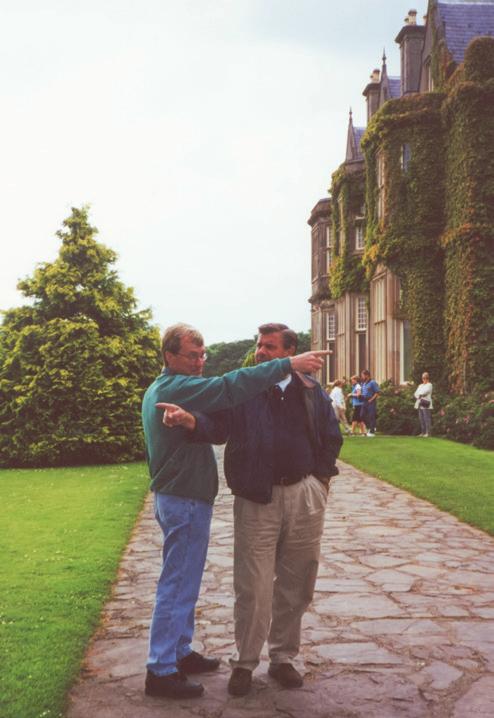

at the academy with people who had no college experience, and learning the basics of criminal justice really gave me an advantage.
… [At CMSU] it wasn’t just sitting in the classroom; they gave us a lot of opportunity to see real-life stuff, and that really helped.”
CJC has taken more students abroad than any other academic program at UCM, sponsoring international trips since 1999.
Miller and Professor Emeritus Don Wallace,
who also joined the faculty in the late 1970s, were instrumental in getting the study tours started.
In 2002, Wallace launched the Journal of the Institute of Justice and International Studies, which was published annually at the university through 2014. The department also sponsored the International Corrections Symposium, bringing 19 scholars, judges and practitioners to Warrensburg,
University of Central Missouri Magazine 5
In 2000, the CJC program led its first in a series of study tours, visiting the University of Limerick’s campus along
Above left: Don Wallace, left, and Dane Miller demonstrated their conflicting sense of direction on the CJC program’s study trip to Ireland in 2000. Above right: The group visited the Garda Police Academy.
Left: The LAE-GED team that launched the 20-year national winning streak in 2003.
11 of whom traveled from Wales, the Netherlands, Hungary, Ireland, Taiwan or Sweden. The symposium happened to start on Sept. 11, 2001, a day etched in the memory of every speaker and attendee.
“This three-day symposium was open to the entire campus community, and there could not have been a more uplifting place during those tragic days in September of 2001,” Wallace recalls. “As one of the scholars from the Netherlands voiced in her remarks to
the audience, the symposium was about ‘finding common denominators for humane treatment that will sustain, instead of destroy, the ethical standards of us as a society.’”
In May 2002, Pape, Chenault and Peery visited prisons, courts, police departments and universities in Hungary on a study tour. Chenault flew to Hungary straight from the wedding of his friend and former roommate, Darrell Schmidli, ’01. (A few years later, Peery would be the best man at Chenault’s wedding, and Chenault would officiate Peery’s.)
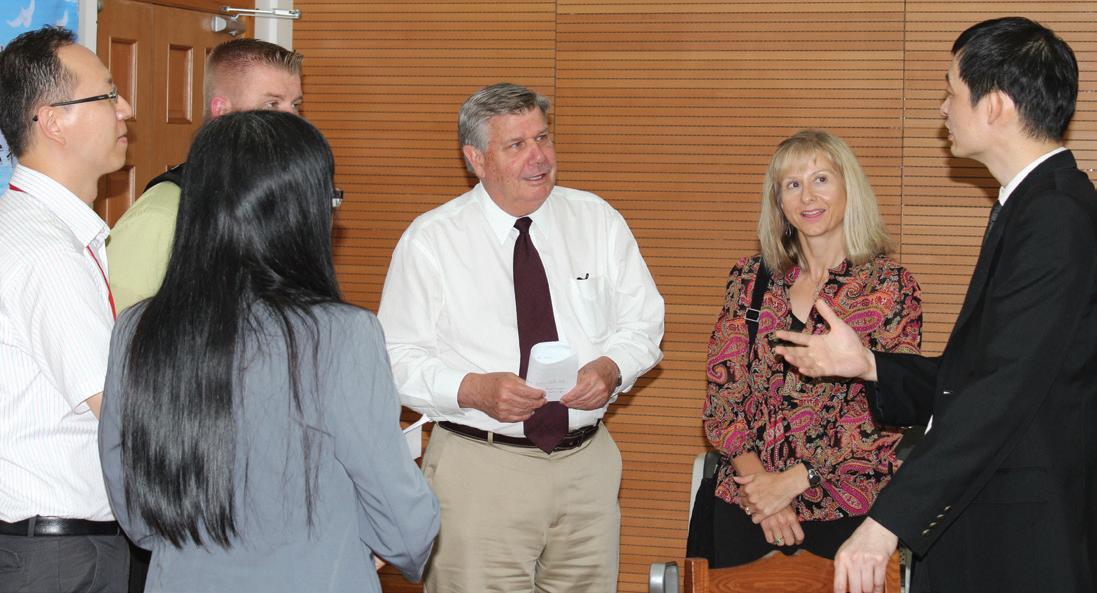

Schmidli was LAE-GED president and Chenault was vice president in 1999 when the team won its first regional competition in Liberal, Kansas. Both Schmidli and Chenault were first-generation college students, and Chenault was also the first in his family to graduate high school. Schmidli’s father and brother were police officers, and he says getting a degree and participating in LAE made him much better prepared for the academy and his career.
“The thing that helped me the most was the people skills — just getting comfortable talking in front of people, meeting new people,” says Schmidli, who is now patrol captain for the City of Independence, Missouri. “We’re not all from the same walk of life, but we all walk in the same line of work.”
Chenault went on to earn his Ph.D. from the University of Nebraska
at Omaha and has been a CJC professor at UCM for 13 years. He is now a mentor to first-generation students and one of the faculty members leading experiential learning opportunities like the ones he benefited from as a student.
In 2014, Chenault, Miller and Betsy Kreisel, ’92, ’94, traveled to Shanghai and Beijing as guests of the East China University of Politics and Law, visiting the People’s Court and meeting with Chinese judges and prosecutors. Before becoming associate dean of UCM’s Harmon College of Business and Professional Studies, Kreisel served as a CJC professor and department chair. She was one of the faculty members who accompanied Chenault and his fellow LAE members to Hungary in 2002 and has since traveled with him as a colleague on trips to Belize, Spain, Italy and France.
“To see how students who have never been out of the country blossom and experience other countries is amazing,” Kreisel says.
Chenault now serves as executive director of the Consortium for Transatlantic Studies and Scholarship, which offers a semesterlong study abroad opportunity for students from any major at the Universidad de Alcala near Madrid, Spain. He credits LAE with helping him expand his horizons and build a professional network.
“Those relationships, that networking, is incredibly valuable, even if our students don’t realize that now,” he says.
Along with professional skills and connections, Chenault and his teammates from the early years of LAE-GED’s winning streak built lifelong friendships. Although their careers have taken them to different locations, they come back together for recruiting events, reunions and Homecoming at the place where it all began.
“I just feel like that time in my life was so important and really made me into who I am,” Pape reflects on her university experience. “I wouldn’t change it for the world.”
6 Spring 2024 | ucmfoundation.org/magazine
Spring 2024 | ucmfoundation.org/magazine
In 2014, alumni and faculty members Scott Chenault, Dane Miller and Betsy Kreisel visited Shanghai and Beijing as guests of the East China University of Politics and Law.
Scott Chenault, Josh Peery, Erin Pape and Associate Dean Betsy Kreisel at the 2021 Homecoming celebration, where UCM set the world record for Largest Ridden Parade of Mules.
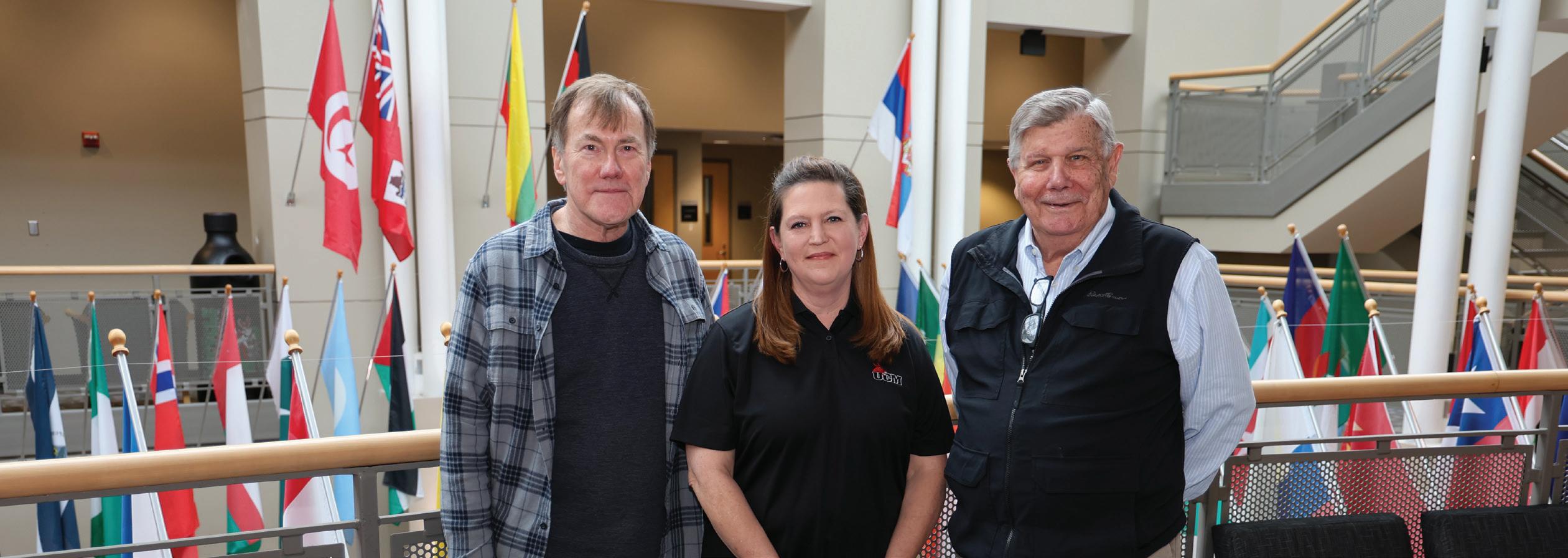
Professor Emeritus Don Wallace, Professor and Department Chair Lynn Urban and Professor Emeritus Dane Miller have helped make UCM’s Criminal Justice and Criminology program one of the most renowned in the nation. Now the program is working with three other departments to offer a Mental Health Certificate.
Beyond Crime and Punishment: Prioritizing Mental Health
By Cloe Pohlman, Public Relations Undergraduate Student
Professionals in many different sectors have been working to address the increased diagnosis rate of mental health issues and the growing need for service providers. According to the Prison Policy Initiative, prisons are the No. 1 provider of mental health services in the United States. Roughly 43% of U.S. inmates have been diagnosed with mental health issues, which is more than 600,000 people.
Scott Chenault, a professor in UCM’s Department of Criminal Justice and Criminology (CJC), knows about the problem firsthand. After two years serving as a corrections officer, including in supermax prisons and on death row, he teaches UCM students about institutional corrections and the myriad of issues they may one day solve.
For the past 12 years, Chenault has taken students to the Missouri Department of Corrections Association Conference — more than 200 students to date. The department is one of five organizations that provided feedback to help develop a new Mental Health Certificate at UCM addressing mental health issues in prisons and beyond. The other organizations providing input were the Johnson County (Kansas) Juvenile Detention Center, Compass Health Network, the Missouri Department of Mental Health and the Missouri Children’s Division.
About 60% of UCM’s CJC majors go into law enforcement after graduation. According
to “Road Runners,” a survey of 355 sheriff’s offices and police departments across the country, approximately one-third of individuals with severe mental illnesses receive treatment for the first time after an encounter with law enforcement. This means police officers often find themselves on the front lines of recognizing symptoms and providing psychiatric care while at the same time upholding public safety.
UCM’s Mental Health Certificate offers current students and working police officers a valuable professional development opportunity.
“There’s a big push in police for CIT [Crisis Intervention Team] intervention,” says Chenault. “If you have someone who’s acting out, let’s treat them as somebody who’s mentally ill, not treat them as a criminal. Let’s interact with them in a productive way.”
Approved by the Board of Governors in December, the Mental Health Certificate is an interdisciplinary offering from the CJC, Human Development and Family Science, Psychological Science, and Social Work programs at UCM.
This certificate is the only one in Missouri offered at the undergraduate level that is specifically for mental health. The 12 credit hours of study include three required 3-hour courses in Criminal Justice and Mental Health Systems, Abnormal
Psychology, and Addiction and the Family. The remaining three credits can be selected from courses pertaining to multicultural approaches, youth services, health, social work and more. Those who would benefit from this certification include working professionals, individuals looking for a career change and current undergraduates majoring or minoring in related areas. The program is offered 100% online, and students who are on campus can choose a hybrid option.
This course of study is intentionally designed to enhance skills that are crucial to the daily operations performed by law enforcement professionals, corrections officials, probation and parole officers, social workers, psychologists, counselors, youth services specialists, support care assistants and health care providers. Additionally, individuals pursuing education or nursing could benefit from gaining skills that will help them differentiate problems caused by mental health issues from other behaviors or illnesses.
“Agencies have been requesting training and information on mental health matters for many years,” says Lynn Urban, professor and chair of the Department of Criminal Justice and Criminology. “We are excited to bring them this opportunity and help our current students prepare for these career paths.”
University of Central Missouri Magazine 7
University of Missouri Magazine
Learn more about the certificate at ucmo.edu/mentalhealthcert.
A Reputation for Justice
By Myah Jolly, ’20, ’22, and Kathy Strickland
UCM's
Criminal Justice and Criminology
(CJC) program has been around for more than 60 years and has consistently ranked among the best in the state and country. One way CJC students have honed their skills and demonstrated their aptitude has been through participation in the American Criminal Justice Association’s Lambda Alpha Epsilon (LAE) competitions.
Since 1966, UCM’s Gamma Epsilon Delta (GED) chapter of LAE has served and prepared hundreds of students for the field of criminal justice. The chapter’s 20-year winning streak at the ACJA-LAE National Conference started in 2003, and Professor Gregg Etter has been leading the team since 2007.
Etter has seen many student members move on to exceptional careers. While these alumni have gone different directions in life — some into law enforcement, others on to law school — all share a common bond that helped prepare them for success.
“CJC is a big tent,” says Etter, who spent nearly 30 years with the Sedgwick County (Kansas) Sheriff’s Office before coming to UCM. “Many students want to become cops; others join wanting to become lawyers, correctional officers, juvenile officers, probation officers and social workers. Criminal Justice and Criminology and LAE encompass all of this.”
LAE is open to all students, yet the majority are CJC majors. Academic exams are a huge part of the LAE competition, and the test material is not new information for CJC students. Team members who have taken courses aligning with the subject matter of the exams have a distinct advantage —
even over heavy hitters like Cal State, the University of New Haven, West Chester University and the University of Central Florida. Unlike in collegiate sports, there are no divisions in the national LAE competition.
Every member of UCM’s team takes seven academic exams covering the following topics: police management, corrections, criminal law, juvenile justice, homeland and national security, forensic psychology, and ACJALAE knowledge. Team members also have the option to compete in firearms, crime scene investigation (CSI), physical agility and academic research.

LAE team members practice for the CSI event with “Dead Fred,” a military-grade moulage kit and various other props. At the competition, a team of three students has about 15 minutes inside the crime scene to look, touch and ask questions. Then they have 45 minutes outside the room to compile a sketch and report.
What follows is the inside scoop on what it’s like to be a member of this nationally recognized team.
Setting the Scene
Three students walk into a room and spot a body lying on the floor, motionless. They use all the skills they’ve been developing to evaluate the “crime scene,” paying close attention to every detail — how the body is positioned, every object that’s askew, every drop of “blood” or “bruise” on the victim. They search under and between the seat cushion of each chair and shake every book upside down, looking for anything stashed inside. After 15 minutes, they leave the room and have 45 minutes to compile a sketch, evidence list and official report.

UCM students have practiced all year on a professional CSI dummy known affectionately as “Dead Fred.” They set up crime scenes in different areas on campus using Fred to visualize different scenarios. Having this prop — as well as militarygrade moulage kits obtained with grant money — elevates the practice experience for UCM’s team.
“We have as much gory stuff as we need to put on a crime scene,” says Emma Klein, ’24, the 2023–24 LAE-GED president, who earned her CJC degree with a minor in Juvenile Justice. “Then we just bring in evidence as we need it. … We use our imaginations a lot.”
Students who choose to participate in the CSI event compete in groups of three: an evidence collector, a report writer and a sketch artist. Klein’s role has been report writer, and she credits a class taught by CJC Assistant Professor Tony Gasaway for helping her learn how to ask the right questions.
The Students, Faculty and Alumni Who Uphold UCM’s Criminal Justice Legacy
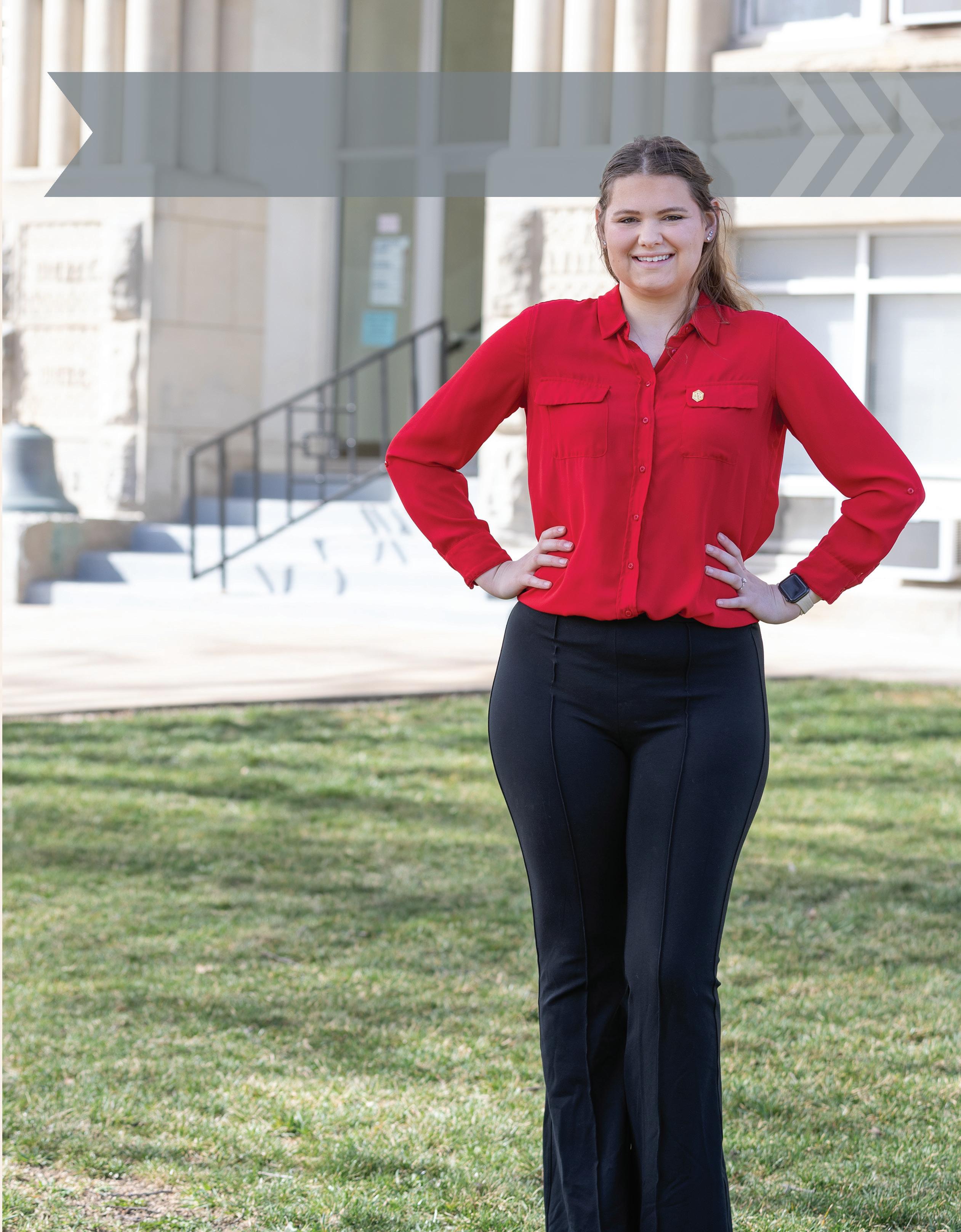
“I’ve learned how to lead a team and get people involved. I’ve strengthened my communication skills and learned how to be patient. I am very grateful for everything LAE has taught me.”
— Emma Klein, 2023–24 President of UCM’s LAE Chapter
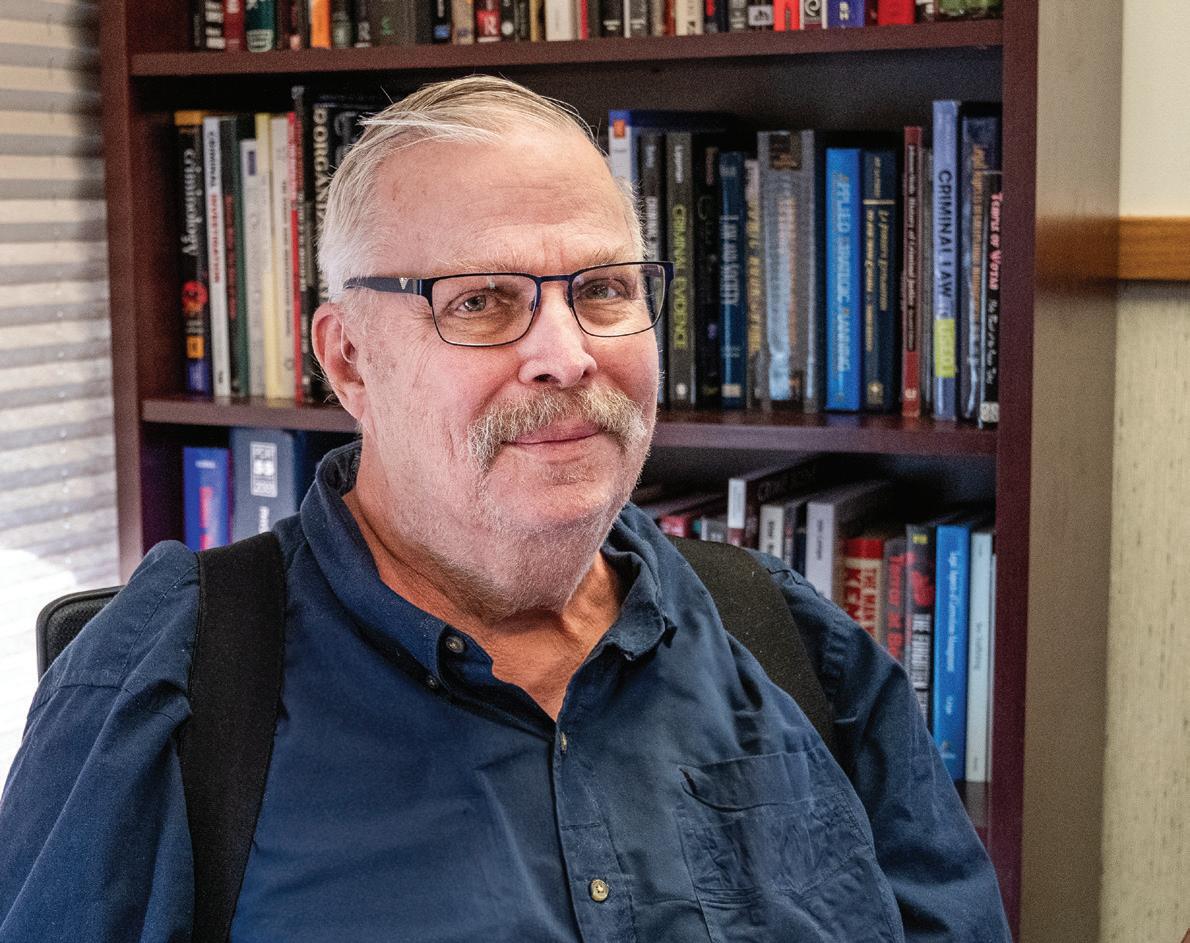
Professor Gregg Etter, who spent three decades with the Sedgwick County (Kansas) Sheriff’s Office, has served as adviser of the LAE-GED team since 2007. In 2017, he received the prestigious Jim Hooker Outstanding Advisor Award, presented to one ACJA-LAE member in the nation annually. Shooting team trainer Richard Gillespie received the award in 2012.

Emma Klein, Lauren Gruber and Taigan Rogers use a quiz app to study for the LAE academic exams that every UCM participant takes at the regional and national competitions.
Gasaway, who also teaches tactical communications and ethics at the Central Missouri Police Academy, worked in federal law enforcement for more than three decades as a U.S. Marshals Service chief deputy and spent seven years as a staff instructor at the Federal Law Enforcement Training Center in Glynco, Georgia. He emphasizes writing as an important skill in any career and brings in alumni as guest speakers from a variety of professions.
“One of the most important things we do here as faculty is to not only directly mentor and guide [students] into their careers but to find people in the field, too, that can do that,” Gasaway says.
Kenzie Williams, ’23, ’24, is one such professional who looks forward to coming back to campus to speak or to recruit students after finishing her academy training this summer for the Johnson County (Kansas) Sheriff’s Office. As a student, she worked for the Department of Homeland Security with FEMA as a remote national preparedness directorate action officer and served as Recruitment Committee chair for the LAE-GED team.
“It allowed me to share my experiences with the program, guide underclassmen in their transition to college life, and be one of the first people that they know and look up to,” Williams says about serving as recruitment chair. She notes that students can participate in an LAE regional conference as early as the first semester of their freshman year.
Williams double-majored in CJC and Sociology and went on to earn her master’s in CJC through the accelerated dual-degree program that allows students to achieve their bachelor’s and master’s in just five years. Not only does this option advance students’ education, but it also eliminates a gap year for those who would graduate with their bachelor’s degree before turning 21, the minimum age for getting POST certified in a police academy in Missouri.
Etter’s graduate-level Organized Crime course was Williams’ favorite class at UCM. She conducted graduate-level research on human organ trafficking and attended a conference of the National Gang Crime Research Center in Chicago with Etter, who is certified as a Level 3 Professional Gang Expert through the organization. Etter selects his top students to accompany him to the three-day annual conference — and all of them have been LAE members.
Real-world experience like this happens on the road and close to home. In keeping with UCM’s motto of “Education for Service,” every fall LAE team members volunteer to act as security at the Warrensburg community’s annual Burg Fest. This helps unite the new team shortly before competing in the nine-state Region 3 conference. Regionals is a three-day competition that UCM’s team has won 22 consecutive times. The fall event primes them for what nationals will bring in the spring.
10 Spring 2024 | ucmfoundation.org/magazine Spring 2024 | ucmfoundation.org/magazine
Practice Rounds
On the eight-hour bus ride to Louisville, Kentucky, 26 determined students quiz one another and study digital flashcards in hopes of securing that 20th consecutive national championship trophy. After months of practice, it is during this competition that the team becomes whole. Spending a week together, the teammates build on their already high morale and trust.
“It’s not until you go to your first competition that you really understand LAE,” says 2022–23 President Josh Terrell, ’21, ’23, a UCM Finance major who went on to earn his MBA.
“That’s what turns us from just a group of people to as close as a family.”
“It’s not until you go to your first competition that you really understand LAE. That’s what turns us from just a group of people to as close as a family.”
and fundamentals classes to learn how to properly use the weapon. They start off with a basic .22-caliber semi-automatic handgun and progress to a 9mm pistol once they have demonstrated competence. They must advance to the 9mm or .38 Special cartridge and appropriate firearm to compete in the ACJA-LAE regional or national conference. Students also need to shoot 240 out of 480 to qualify for the competition, but 300 is UCM’s standard minimum.
– Josh Terrell, 2022–23 President of UCM’s LAE Chapter
Throughout the academic year, Terrell led a study group for the ACJA-LAE knowledge exam, which every member of the team is required to take at the competition. The group prepared using an extensive official study guide that Terrell turned into a quiz app, creating friendly competition while learning.
Any competitive team knows it takes continual practice to have continued success. When it comes to preparing for the optional portions of the competition, such as firearms, CSI and physical agility, practices look a little different.
Before they can even begin shooting, students take three hours of safety
Major Richard Gillespie, ’02, an emeritus of UCM’s Department of Public Safety, volunteers to instruct the university’s firearms team. When he was hired at UCM three decades ago, he vowed to finish the CJC master’s degree he’d taken a hiatus from while serving as chief of the Fulton (Missouri) Police Department. The year after he graduated, he competed in his first national LAE competition, which was
also the first time UCM’s team clinched the Sweepstakes Champion title. He has competed in the professional division of the national competition ever since, maintaining his own 20-year winning streak as the “Top Gun.”
The Johnson County (Missouri) Sheriff’s Office shooting ranges provide a place for the LAE-GED team to practice. Sheriff Scott Munsterman, ’97, and his brother, Warrensburg Police Chief Andy Munsterman, ’99, are both CJC alumni. Scott worked with Gillespie at the UCM Department of Public Safety while earning his degree.


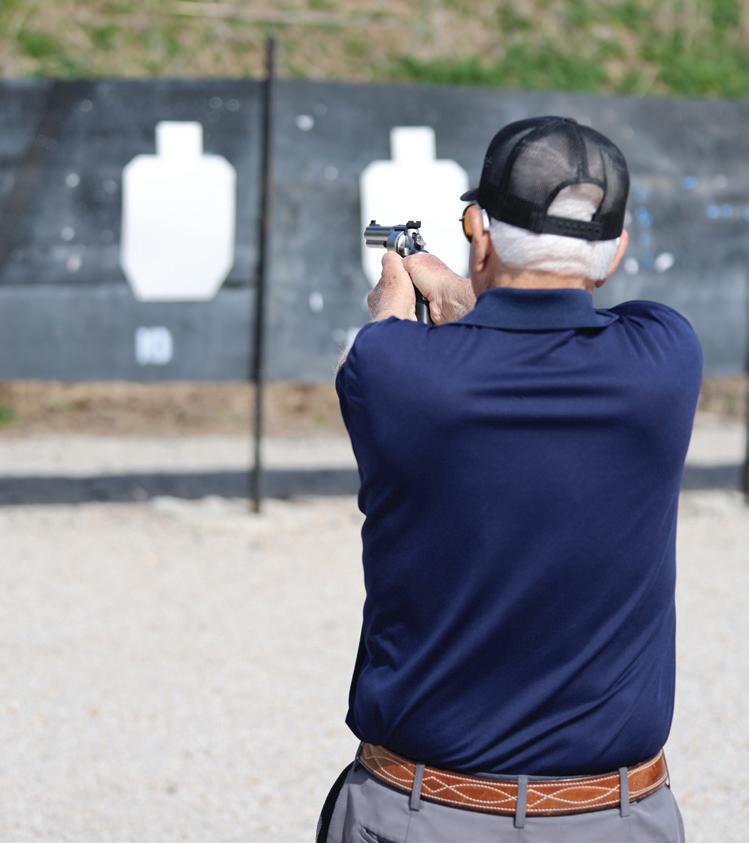
University of Central Missouri Magazine 11 University of Central Missouri Magazine 11
LAE-GED President Josh Terrell, Vice President Taigan Rogers, Sergeant of Arms Lauren Gruber and Historian Marissa Kendrick at the 2023 LAE National Conference.
Above right: Major Richard Gillespie, an emeritus of UCM’s Department of Public Safety, volunteers to instruct the university’s LAE firearms team. Above left: The 2022–23 team is shown here at the LAE Regionals in Fort Hays, Kansas.
The Munsterman brothers and Gillespie are all graduates of the FBI National Academy, which was founded by J. Edgar Hoover in 1935, just two years before LAE was established. At the Quantico Marine Corps Base about an hour from Washington, D.C., working law enforcement professionals go through 10 weeks of intensive physical training, enhance their leadership skills and upgrade their knowledge in some of the same areas as LAE, including forensic science and the terrorist mindset.
Sheriff Munsterman is president-elect of the Kansas/Western Missouri chapter of the FBI National Academy Associates (FBINAA). Fellow CJC alumnus Scott Rhoad, ’87, ’90, who retired in 2021 as director and chief of the UCM Department of Public Safety, currently serves as president of the national FBINAA organization.
In addition to a place to practice, alumni assist the LAE team in offsetting the cost of ammunition. Etter received two donor-funded Opportunity Grants through the UCM Alumni Foundation, and an anonymous alum continues to contribute. The team generally goes through 25 to 30 cases of ammo a year, or about 25,000 to 30,000 rounds.
Competing as part of the firearms team gave CJC alumna Mackenzie (Carreon) Wilburn, ’16, ’17, valuable experience for a career as a crime gun intelligence specialist with the Kansas City Police Department and now for the Bureau of Alcohol, Tobacco and Firearms. LAE sparked Wilburn’s passion for the field of intelligence — specifically for identifying prolific shooters.
“Because of my experiences with LAE, I knew early on in my career what I wanted to do and where I wanted to go,” Wilburn says. “I have been fortunate to find that unique area of criminal justice. … The opportunity I had to bring my individual thoughts and have open discussions really fostered the ability for me to think openly and freely for myself.”
Lifelong Connections
Alumni actively support the CJC program by volunteering time, donating resources and returning for events or to talk with students about their career journeys. Tiffany Sanderson, ’08, is a CJC alumna who works for the Division of Youth Services (DYS) and comes back to campus regularly to speak to classes, take youths in the system on university tours, and attend career fairs.
“I love that I get to collaborate with the CJC department and recruit from UCM now,” she says, noting that the DYS provides internships for residential care providers and sponsors one of UCM’s annual Student Employee of the Year awards.
“CJC is one of the most well-known departments on campus, and UCM’s department is one of the most well-known in the country.”
Erica (McCann) Anderlik, ’20, was part of the CSI competitions, first as LAE-GED Community Service Committee chair, then as chapter president. She got extra practice volunteering for the UCM Police Academy’s role-play scenarios, acting as a suspect, victim or witness to a simulated crime. Anderlik followed in the footsteps of her brother, Ian McCann, ’14.
– Erica (McCann) Anderlik, LAE and CJC Alumna
“It’s like a special bond we share, both being alumni of UCM CJC and both being LAE presidents,” says Anderlik, who is now a paralegal at a personal injury law firm in Liberty, Missouri. “I think the two have shaped me professionally in my career as well. CJC is

Spring
12
2024 | ucmfoundation.org/magazine Spring 2024 | ucmfoundation.org/magazine
Sheriff Scott Munsterman, right, allows UCM’s LAE team to practice at the sheriff’s office shooting ranges under trainer and consistent LAE “Top Gun” Richard Gillespie, left.
one of the most well-known departments on campus, and UCM’s department is one of the most well-known in the country.”
Since 2015, CJC alumni and friends have gathered for an annual Alumni Showcase at UCM. Whether they realize it or not, students attending the reunion have probably never seen so many former FBI agents in one room!
The CJC program has created the Society of Former Special Agents of the FBI Scholarship in honor of these FBI alumni. CJC Professor Emeritus Dennis Anderson is a former agent who established the Criminal Justice Scholar-Athlete Scholarship while still teaching at the university in 2009. Sydney Sahuri, ’23,
was the 2022–23 recipient of this award and a Great Lakes Valley Conference Academic All-Conference honoree and National Tenpin Coaches Association All-Academic bowler for the Jennies. She minored in Juvenile Justice and went on to become a juvenile detention officer with the Madison County Detention Center in Fredericktown, Missouri.
“My goal for the future is to give juveniles the second chance that they deserve,” Sahuri wrote in her thank-you letter for the scholarship. “Kids make mistakes and sometimes bad choices. … I want to help rehabilitate them and give them a chance for a more successful future.”

Students made a float celebrating the 60th anniversary of the Criminal Justice and Criminology program at UCM for Homecoming 2022.

Another CJC scholarship is named after UCM Professor Emeritus Guillermo E. Davila, who is credited with founding the CJC program, then called the Department of Law Enforcement, in 1962 as the sole faculty member. The university’s LAE chapter is named GED in his honor.
“All members know the letters stand for a very dedicated man of criminal justice, who always cared for his students,” Professor Emeritus Roger Pennel wrote in memoriam in 2009. Two years prior, Davila’s family, students and colleagues gathered gifts in order to endow the Guillermo “Bill” Davila Scholarship for CJC undergraduate students. Davila started the program before the 1968 federal Law Enforcement Education Program initiated grants to universities for the purpose of professionalizing law enforcement. Soon after, criminal justice programs started to pop up all over the country.
Not only is UCM’s CJC program one of the oldest; it’s also one of the best. And LAE involvement is the icing on the cake. In the collegiate competition and later in the workforce, being part of LAE is a win-win.
Public Relations undergraduate student Cloe Pohlman contributed to this story.
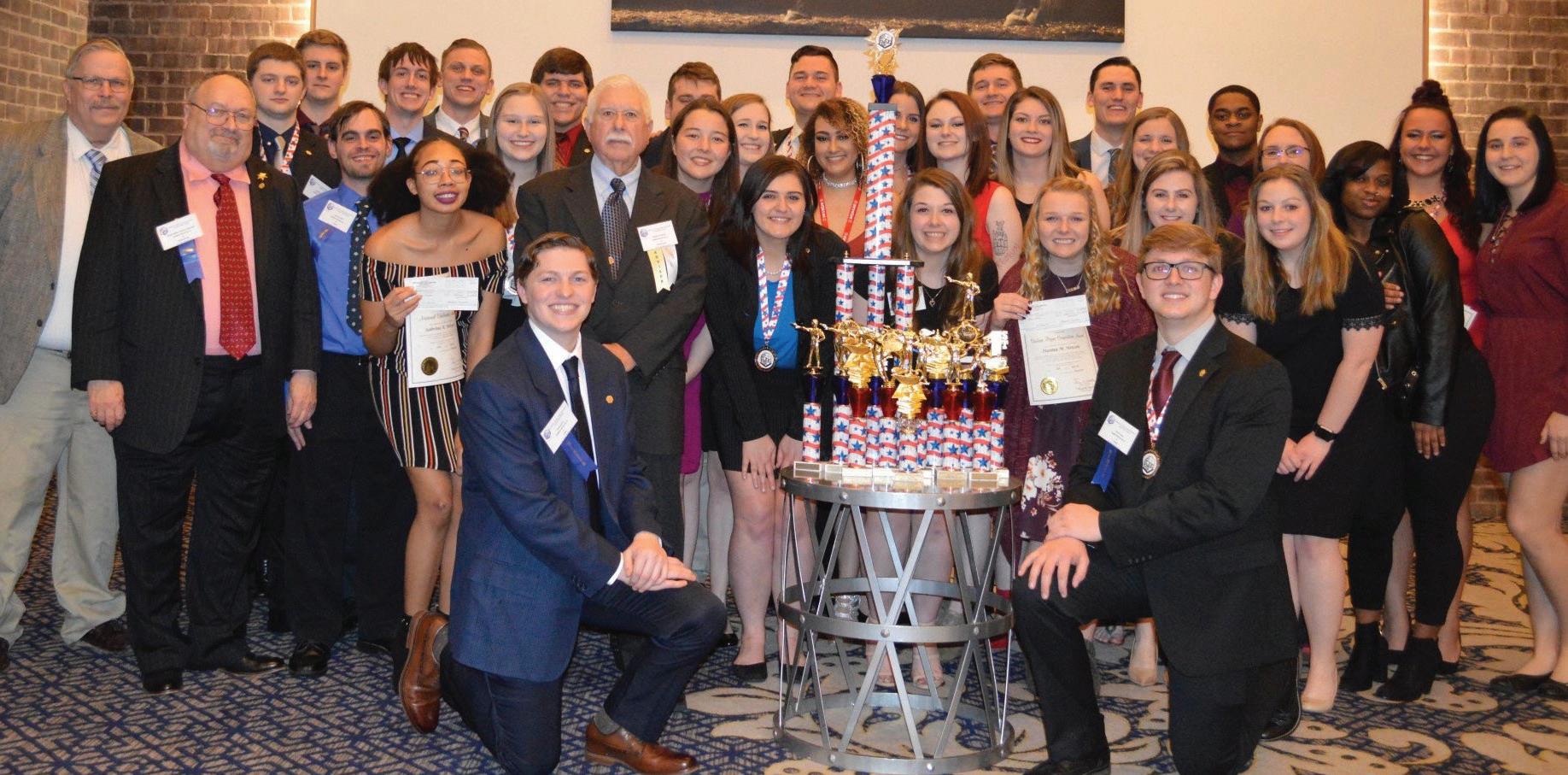
University of Central Missouri Magazine 13 of Magazine
Above left: Chana Erickson, Erica (McCann) Anderlik and Kraig McCoy competed in the CSI event at the 2019 LAE Regionals in Fort Hays, Kansas.
Above right: Anderlik’s team also clinched the national title in Baltimore, Maryland.
When the Crime Scene is Unseen 7
Security and Privacy Best Practices
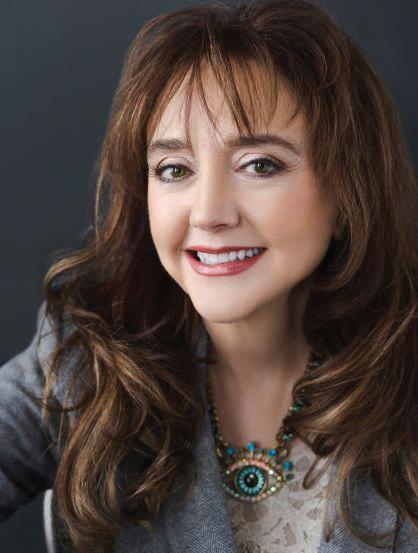 By Rebecca Herold, ’83
By Rebecca Herold, ’83
Rebecca Herold, ’83, CEO of Privacy and Security Brainiacs, frequently serves as a keynote speaker on cybersecurity topics and hosts a radio podcast on VoiceAmerica as “The Privacy Professor.” She graduated from UCM with honors, earning degrees in Mathematics and Computer Science. She was also a member of Alpha Omicron Pi, Kappa Mu Epsilon and the Association for Computing Machinery. She went on to earn her M.A. in Computer Science and Education from the University of Northern Iowa.
Herold has worked with Dell, 3M, DFLabs (now Sumo Logic), QinetiQ, the Computer Security Institute, the Institute of Electrical and Electronics Engineers (IEEE), Principal Finance Group, Los Angeles City College, the National Institute of Standards and Technology (NIST) Applied Cybersecurity Division and more to teach and strengthen cybersecurity practices. She is the author of 22 published books, more than 350 published papers and a masters-level university curriculum. She has also served as an expert witness in eight cases to date involving cybersecurity.

No industry is immune from cyberattacks, and the threat has been growing in the education sector. According to Malwarebytes Threat Down analysts, known ransomware attacks targeting higher education rose 70% year-over-year in 2023, with nearly half of these attacks aimed at U.S. institutions. In higher education or any other field, cybersecurity starts with individuals taking personal responsibility for strengthening their security and privacy. Here are seven core security practices for every person and every organization, from one-person businesses to those with a million employees.

1Use strong passwords, and different passwords for different purposes.
Using passwords is the most basic of cybersecurity practices — and the one that people around the world are horrible at doing well. Researcher Sam Boyd reported in 2023 from his analysis of 18.4 million passwords — 9 million of which were from the general public — the following most-used passwords in each of the associated countries:
USA: password
Germany, Italy and Spain: 123456
Russia: qwerty
France: azerty
The following were the 10 most used passwords globally, in order of frequency, for organizations and individuals combined: 123456; password; 123456789; 12345; 12345678; qwerty; 1234567; 111111; 1234567890; and 123123.
Other studies show that repeated numbers (e.g., 9999999), letters (e.g., bbbbbbbbb) and words (e.g., FirstnameLastname) are also commonly used worldwide.
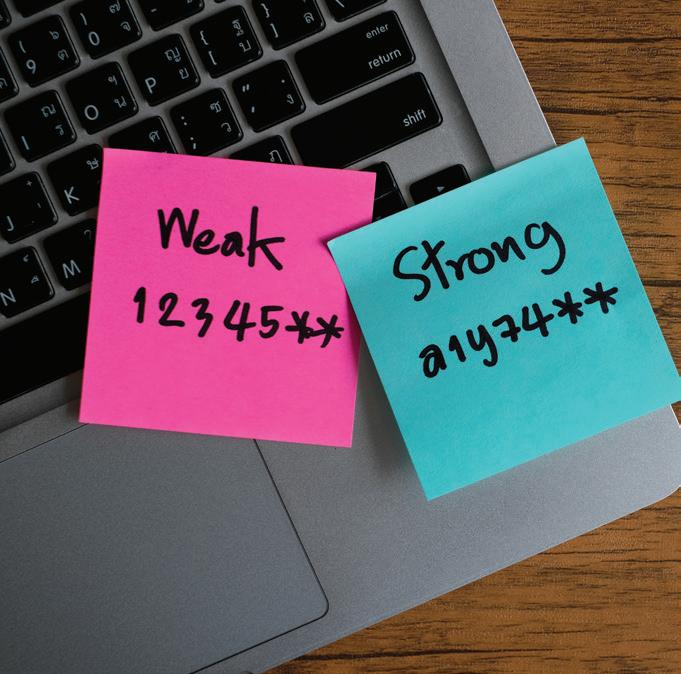
Do you use such passwords? Well, if so, stop doing that! You’re making yourself a sitting digital duck for a cybercrook hunting an easy victim.
To have strong passwords that actually keep people out of proprietary, sensitive, confidential and personal data, at a minimum do the following:
• Create passwords that contain as many characters as possible.
• Make them complex, using upperand lower-case alpha characters, numerals and special characters.
• Do not use anything that can be found in any type of dictionary.
• Make them hard to guess; don’t use the names of sports teams, celebrities, math equations, games or anything else publicly available.
• Use different passwords for different purposes. For example, you should not use the same password you use on TikTok, Facebook or Spotify on your employer’s network; these should also be different from passwords you use for banking, to access your patient data portal, and so on.
• Do not use biometrics as a password substitute, as the sole authenticator. Artificial intelligence (AI) has exposed a large portion of biometric authentication to being susceptible to successful impersonation using AI tools, including for voice, face, fingerprint, iris and other biometric identifiers. Which takes us to the next basic cybersecurity practice.
2
Enable multifactor authentication to prove you are who you say you are online.
Multifactor authentication (MFA) has been proven to be extremely effective in protecting against automated cyberattacks because it takes more than just one authenticator (typically a password) to get access to data and systems. MFA isn’t yet used everywhere, but it is increasing in use and has long been employed in banking, health care, corporate portals, online stores and other favorite hacker targets.
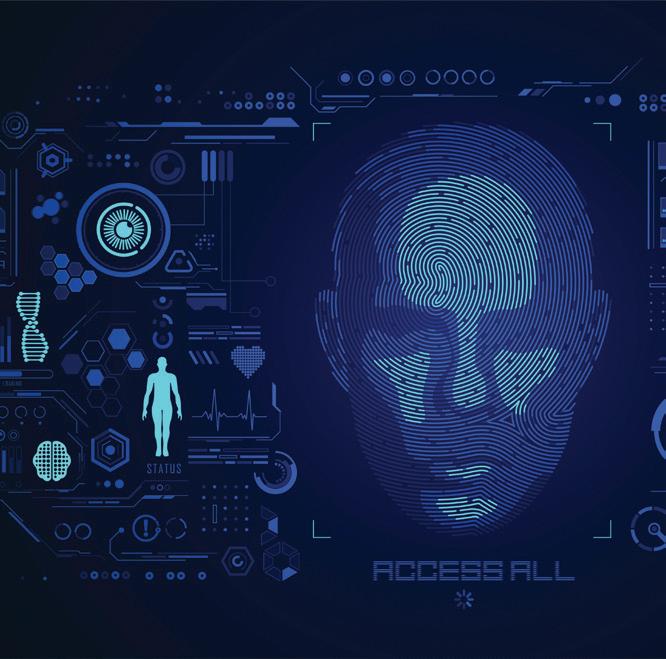
Activate and use MFA everywhere possible. If it is not offered, then request it from the associated site or application.
If you do want to use a biometric authenticator, use it in addition to another authenticator. Using two or more authenticators is generally referenced as multifactor (aka multistep or two-step) authentication. MFA uses a combination of two or more of:
• Something you know, such as a password or PIN number.
• Something you have, such as an authentication app on your phone, a physical device such as a key fob or digital code card, etc.
• Something you are, such as your fingerprint, face or voice.
15
Practice ongoing app security management.
Without looking at your phone, answer this question: How many apps do you have? Write it down.
Now, look at your phone. How many apps do you actually have?

Enable every computing product for automated updates.

Make sure you enable automatic updates when you install new software. If you have not yet set up software for updates, go back and do it now.
Also, set up every type of computing product (laptop, desktop, tablet, smartphone, etc.) to receive automatic updates. Automatic updates are not only needed in your more commonly considered computers, but also in Internet of Things (IoT) products like fitness trackers, digital assistants, security systems and “smart” appliances. All IoT products connect to the internet and other types of networks, making them attack targets.
The most compromised, hacked computing products are those that have not been updated with the latest security and privacy patches. Automated software and firmware updates not only install new capabilities but also fix security and privacy holes that have been discovered. 3
Over the past 20 years, I’ve asked this question many times of my clients, readers, listeners and attendees of events where I speak. With rare exception, everyone has more apps than they thought they did. Why? Two primary reasons:
1. Many people will download an app if they are somewhat interested, and when it’s not something they actually end up using, they leave it on their phone.
2. Often, apps are automatically loaded to your phone from websites you visit, especially those you got to from clicking a link in a social media site, email, text or popup window. So, most people aren’t even aware they were loaded in the first place.
As part of the terms of use required when an app is loaded, many people are thoughtlessly agreeing to let the app access their digital contact lists, GPS/location, camera and microphone, content of their messages, activity logs and even their passwords. If you have this habit of simply agreeing to terms without reading them, you are literally allowing the app providers to do anything they want on your behalf. 5 4

Keep an eye out for indicators you have malicious and/or spying apps on your phone, such as getting unsolicited calls or texts about things that may creepily be related to something you’ve looked at online, or from a location where you’ve physically been. Also look for your camera, video or audio recorder lights turning on randomly; it may be an app activating them and sending the recordings elsewhere.
Here are some steps you can take to protect yourself from malicious apps:
• Immediately disable apps you have never used or haven’t used in the past month or so. Then uninstall those apps.
• Next, delete all associated software and files, which most apps will leave behind to be able to hook the device user back into their digital ecosystems.
• Repeat the above periodically. Remember, you may have had apps installed without realizing it, and apps are still running, even when you don’t use them.
Learn to recognize and report social engineering attacks, such as phishing.
Social engineering tactics, such as manipulating people and tricking them into taking actions that benefit the manipulator in some way, have been around since the beginning of civilization. Old face-to-face methods still work, and more and more digital methods are emerging daily as new tech and new activities emerge.
Social engineers are always looking for new technology related to email, text, social media or your phone to convince you they have a legitimate need for you to click a link or provide sensitive information in some other way. Their strategies are always changing.
16


Keep in mind that AI tools are becoming ubiquitous. If you get any type of request for your money, for sensitive data or for you to urgently perform any other actions, stop before you act. This includes calls that seem to be from family or friends sounding frantic and claiming that they have been kidnapped, are being held in jail, have been in a car accident, or have suffered some other disaster. AI tools can sound and look very convincing. Call the purported requestor to see if it was really them who asked you for the information and/or action.
Don’t forget about physical security.
When people increase digital vigilance for security and privacy risks, physical risks often get put on the back shelf. You must still physically secure information

PRO fessor TIP
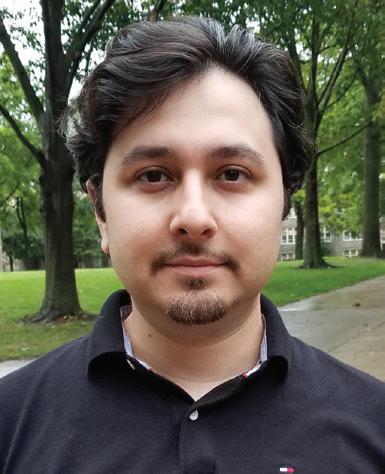
Ahmet Aksoy is a certified network forensic analyst and assistant professor in the Department of Computer Science and Cybersecurity at UCM. He leads the university’s Networking and Machine Learning Lab (netML) and conducts research into network traffic fingerprinting, incident classification, host profiling, genetic algorithms and more. He offers this “PROfessor TIP” on the benefits of automated security.
“In the dynamic and complex digital landscape, the importance of automated cybersecurity cannot be overstated. Consider the constant threat posed by malicious entities employing tactics like Denial of Service (DoS) attacks. These digital adversaries continually adapt, making manual detection methods inadequate. Automated cybersecurity emerges as a critical solution, leveraging advanced techniques to autonomously detect between benign and malicious activities.
Imagine a world where our defenses are equipped with innovative technologies capable of identifying and preventing cyber threats in real time. Research sheds light on the pressing need for such automated approaches where machine learning and genetic algorithms could take the lead against evolving tactics, from DoS attacks to fast-flux techniques.
As we navigate an era of interconnected systems, the conversation surrounding automated cybersecurity becomes pivotal. It prompts us to reflect on the necessity of proactive and adaptive defenses, safeguarding our digital ecosystems from relentless and ever-evolving cyber threats.”
Hear an interview with Ahmet Aksoy at cybersecurityguide.org/ expert-interviews/ahmet-aksoy.
6
Ahmet Aksoy
17
and protect your privacy, along with the privacy of your family, friends and others. This includes keeping information in all forms from being seen and heard.
Here are a few key actions to take to protect yourself:
• Use privacy screens on your phones, tablets, laptops and monitors to keep others from seeing what you have on your screens.
• Configure screensavers to kick in after a reasonable idle period. The more people you have in your vicinity, the shorter the period should be.
• Remove personal information and other confidential information, in any form, from your desktop and other accessible locations.
• Don’t leave computing devices, storage devices or confidential papers unlocked or unattended while traveling, in restaurants, in hotels or at conferences.
• Don’t discuss or show confidential, sensitive or personal information where other people or surveillance cameras can hear and record that information.
Securely dispose of hardware, software, storage devices and print information.

Here’s a case in point: On Feb. 14, 2024, California Attorney General Rob Bonta announced a $5 million settlement against Quest Diagnostics Inc. that, in large part, was for recklessly and in an unsecure manner disposing of protected health information (PHI), as defined by the Health Insurance Portability and Accountability Act (HIPAA) within the security rule that explicitly requires physical security to support the digital security of PHI.
Any size and type of organization is subject to such legal fines under a wide range of legal requirements, as well as being subject to civil suits. Such legal actions are being brought more often as breaches and privacy violations continue to increase.

Take the following actions before giving away, selling, repurposing or throwing away computing devices and associated components and storage devices:
• Decide if you need or want to keep any data on the device. Back it up to a secure (e.g., encrypted) storage device that you have complete control over. This could be a USB drive that you can then keep local (in your home office), offline (not attached to the internet) and secure (locked in a safe). If you choose to save to a cloud service, use a service that at minimum strongly encrypts your data, cannot decrypt your data, and uses MFA.
• Completely remove all data and apps from computing devices, including phones, when you will no longer use them. Doing a reboot or restoring to factory defaults alone will not remove everything. Remove the SIM cards and/ or whatever other storage component is used.
• If you are not sure if all the data and software has been removed and you are disposing of the device, it’s OK to smash it to pieces to the point where the data cannot be accessed even if reconstruction is attempted. However, you still need to make sure you are safe when doing so (wear work gloves, goggles, etc.) and dispose of any type of electronics using a service where the associated chemicals will not poison the ground or water.
The information presented in this article does not constitute legal advice. The views expressed are those of the individual author only and not recommended or endorsed by the University of Central Missouri. All liability with respect to actions taken or not taken based on the article’s contents are hereby expressly disclaimed.
Don’t forget about security and privacy when you no longer will use a computing or digital storage device, or when you are cleaning your home or office. Devices and hard copy documents often contain a lot of personal information. Not only can this data be used for fraud, to gain access into networks, and for other malicious activities; you could be violating any one or more of a large and growing number of personal data protection laws and regulations. Stay up to date on cybersecurity threats by reading alerts and taking security and privacy training. Sign up for Rebecca Herold’s monthly Privacy Professor tips, blog and podcasts at privacysecuritybrainiacs.com.
7
18

UCM
Student is a Top Cyber Sleuth
Cybersecurity Major Excels in National and Global Competitions

Jake Saunders, ’24, was an exemplary student in the University of Central Missouri’s Cybersecurity program. In the fall 2023 season, his CTF team, “Former Gifted Kids,” took first place out of more than 5,000 teams from around the United States in the National Cyber League (NCL).
CTF stands for Capture the Flag, a challenge where competitors find hidden pieces of data called “flags” by hacking into vulnerable websites in a secured system, analyzing log files and network traffic, decrypting messages, reverse engineering computer programs and performing other cyber feats.
In March, “Former Gifted Kids” again took first place in a CTF competition hosted by the Cybersecurity Club at Virginia Tech (CyberVT). As part of the U.S. Cyber Team, Saunders is currently training to compete on a global level in the International Cybersecurity Competition this fall against Team Europe, Team Asia, Team Canada and others in Santiago, Chile.
Approximately 2,000 people from across the country tried out for the U.S. Cyber Team last year, and Saunders was one of only 30 selected. His specialty on the team is web exploitation and attack/defense.
Saunders’ cybersecurity journey began during his junior year at Lee’s Summit High School, when he enrolled in a Summit Technology Academy (STA) computer networking class, taught by UCM alumna Julie Akers, ’84, ’10.
The class was offered at the Missouri Innovation Campus, a cutting-edge facility that STA shares with UCM, which is a designated U.S. Air Force Association CyberPatriot Center of Excellence. Participating in the CyberPatriot program, led at the time by now-retired UCM alumna Lisa Oyler, ’01 and ’02, piqued Saunders’ interest in a field he’s gravitated toward since childhood.
“I’ve always had a knack for tinkering and playing with computers,” says Saunders. “I was always the guy whose parents or cousins or friends would go to if they had issues with their computer.”
After graduating from high school, Saunders enrolled in the Cybersecurity program at UCM, which is designated as a
National Center of Academic Excellence in Cyber Defense by the Department of Homeland Security and the National Security Agency. This spring, UCM earned top rankings in the national Cybersecurity Guide, being awarded the No. 5 position for Best Online Master’s in Cybersecurity and the No. 8 spot for Best Master’s in Cybersecurity.
Saunders led UCM’s extracurricular team, the “Cyber Mules,” to a Top 10 ranking out of nearly 4,000 teams in the NCL competition in fall 2022.
A year later, he traveled with half a dozen other members of the Cyber Mules to Stanford University in California to compete in a regional Collegiate Penetration Testing Competition. On a virtualized network, students hacked as many computers as possible and wrote a report about the vulnerabilities they found and how they could be remediated.
“Solving those problems really makes you use your brain and be creative,” Saunders says.
– Jake Saunders ” “
Solving those problems really makes you use your brain and be creative.
UCM classes like Computer and Network Forensics and an internship with Eagle Technologies, based in Salina, Kansas, helped him prepare for these competitions. He also obtained numerous certifications, including as a Dale Carnegie Scholar through the Delta Chi chapter at UCM and as an Offensive Security Certified Professional (OSCP).
After graduating in May with a degree in Cybersecurity and a minor in Computer Science, Saunders is completing Offensive Security’s Learn Unlimited certification program. He has already founded his own company, Downscope Security Solutions, and is poised for a promising career at the forefront of the cybersecurity workforce of the future.

Members of the U.S. Cyber Team, including UCM student Jake Saunders, take a bowling break during training in Washington, D.C., in February 2024.
Jake Saunders
19
Donors Step Up for UCM Giving Days
Thanks to generous alumni and friends, the University of Central Missouri experienced two successful giving days this academic year. Through the UCM Alumni Foundation’s UCM Gives crowdfunding platform, the collective impact of MuleNation was amplified.
Giving Tuesday Demonstrates Holiday, School Spirit
Giving Tuesday is a global day of giving that happens the Tuesday after Thanksgiving. A total of 360 donors joined the Giving Tuesday festivities on Nov. 28, 2023,
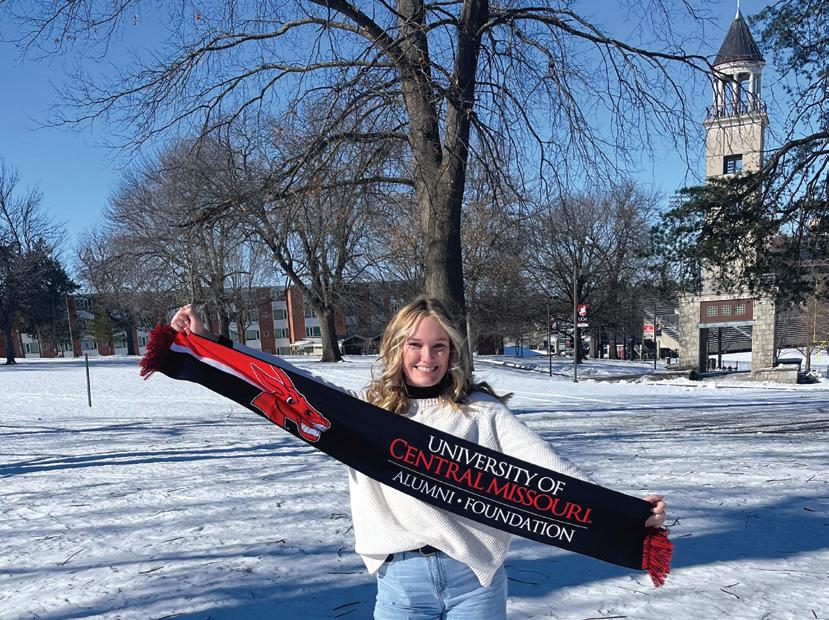
contributing $101,000 to the Central Annual Fund, which is an unrestricted fund established to meet the university’s most immediate needs.
In years past, the giving day has included a “Power Hour” with participation from representatives of the Fighting Mules ROTC, Fashion and Apparel Merchandising, the official UCM Mule Riders and students in the university’s Digital Media Production program. This past year’s Power Hour instead featured a rededication of the James C. Kirkpatrick Library, showcasing capital improvements made possible by donor support.
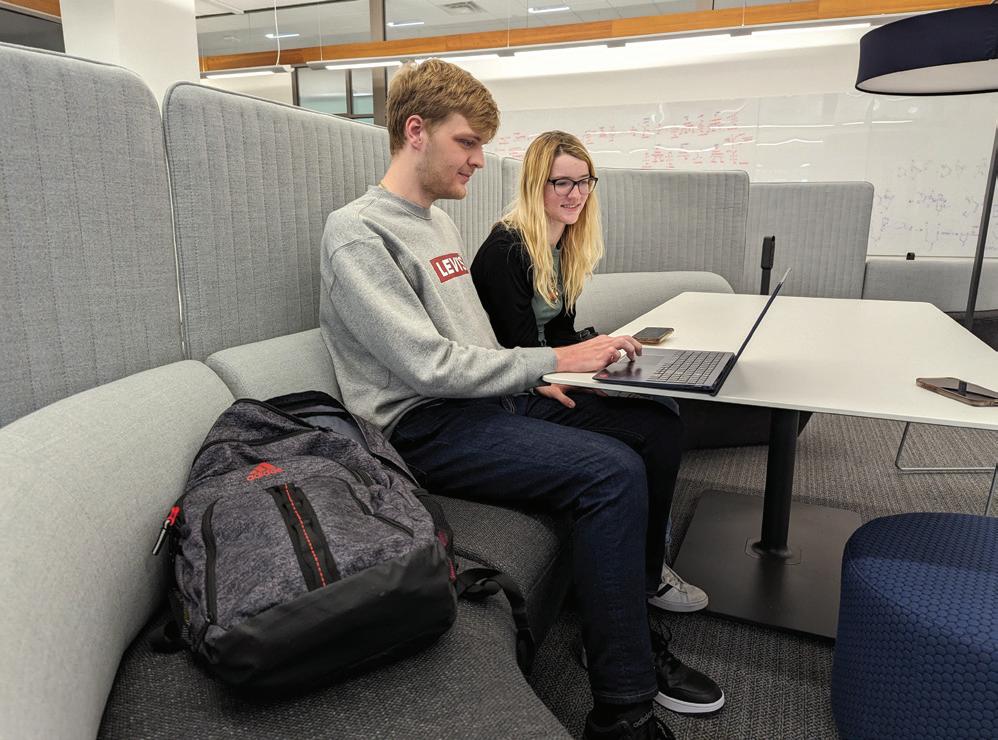
In June 2020, the Koch Family Trust provided a gift of $975,000 to UCM to support library operations. The trust was established by Oliver T. Koch and Mary G. Koch in 1990. Oliver graduated from what was then Central Missouri State Teachers College in 1941 with a bachelor’s degree in Business Administration. With this funding, renovations were made to the first and second floors of the library, including
Alumna Supports Diverse Student Interests
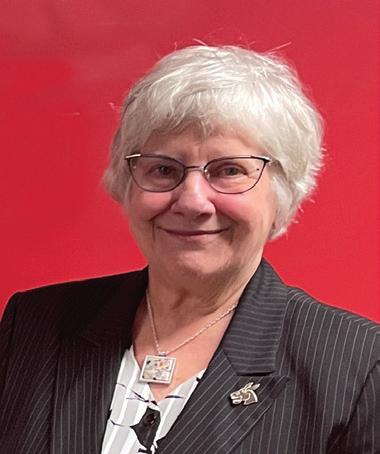
New Endowments
modernized study spaces, collaborative learning environments, private study nooks, a wellness room, sofas and other comfortable furnishings, and bench seating with privacy screens.
President Roger Best and other university leaders spoke at the rededication ceremony, and a video was shown from the March 1999 dedication when construction of the library was completed under former President Ed Elliott. Attendees enjoyed a performance by UCM Music students of “Kirkpatrick Fanfare,” a composition by Andrew Boysen Jr. that was commissioned by
Sarah Bailey, ’70, has established two new scholarship endowments. The Betty Doris Fitterling Smith Scholarship Endowment will provide scholarship support to undergraduate upperclassmen who are actively involved in campus organizations, are pursuing a degree in Fashion and Apparel Merchandising or Family Consumer Sciences Teacher Education, and who, like Betty Dorris Fitterling Smith, have an interest in quilting.
The Sarah Rose Fitterling Bailey Scholarship Endowment will provide scholarship support to a student on the UCM Wrestling team. In making the endowment, Bailey stated, “Wrestling requires dedication by the athletes and those who support them; I feel this dedication and devotion deserves rewarding.”
Bill Kountz, a longtime supporter of KMOS-TV, made provisions in his estate planning to establish the Bill Kountz Jr. Media Fellowship Endowment. Earnings from this fellowship endowment will allow students who work at the KMOS-TV station on campus to participate in internship or apprenticeship opportunities with a major public media entity. The fellowship supports the student recipients by providing funds for travel and living expenses.
Raymond R. Park, professor emeritus of Music, made an estate gift to UCM to establish the Raymond R. Park Music Scholarship Endowment, which will provide scholarships to undergraduate students pursuing degrees in Music or Music Education.
Jim, ’62, and Jeanne, ’63, McDowell, who are passionate about musical theater, have established a quasi-term endowment fund that will be utilized over the next 10 years to enhance UCM Theatre and Dance musical productions.
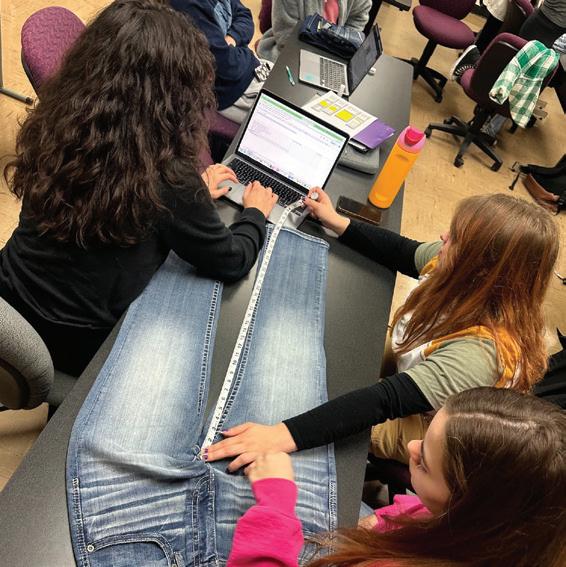
The family of the late Jim, ’55, and Carol, ’54, Pendleton have endowed the Carol Frost Pendleton Scholarship in Music to provide scholarship support to students who are pursuing a degree in music, have a cumulative GPA of 3.0 or higher and have financial need.
20 Spring 2024 | ucmfoundation.org/magazine PHILANTHROPY NEWS
Donors received this scarf as a token of appreciation.
Sarah Bailey
UCM Fashion students repurpose denim.
Students enjoy new study spaces at JCKL.
the university for the 1999 dedication and has since been performed worldwide.
The work honors the library’s namesake, James C. Kirkpatrick, who was a 1929 alumnus of Central Missouri State Teachers College, former newspaper editor and publisher, and public servant who spent 20 years as Missouri’s Secretary of State and 12 years on the university’s governing board. UCM Director of Bands Corey Seapy noted that the piece includes a strain from the song “Danny Boy,” a nod to Kirkpatrick’s Irish heritage.
MuleNation donors committed more than $50,000 in matching gifts for the 2023 Giving Tuesday fundraising event. Special thanks to Chuck, ’80, and Diane, ’81, ’23, Dudley; Phyllis Huang, ’87; Leslie Krasner, ’77, ’78; Tracy Palmer, ’94; and members of the 1871 Society for their matching gifts.
Match Madness is a Game Changer for
UCM Athletics
Match Madness is an annual day of giving that plays off the term March Madness for the time of the year when the NCAA college basketball championships take place.
Alumni Support Student Involvement
PHILANTHROPY
However, instead of benefiting basketball alone, Match Madness raises funds for every UCM Athletics program, with matching gifts to help donor contributions go even further.
UCM Athletics celebrated its most successful Match Madness ever on March 26, 2024, completing the day of giving with more than $77,000 in donations from 724 donors. During the “Power Hour,” where eight coaches and others from UCM Athletics spoke with KOKO radio host Greg Hassler, ’19, at Fitter’s Pub downtown, 262 donors contributed $26,760.
Teams competed to bring in the most donors and dollars through ucmgives.org, raising money for everything from new uniforms to travel expenses to new equipment. The overall donor and dollar winner was the Mules Wrestling team, which was raising money for competition mats, followed closely by Jennies Volleyball, Jennies Bowling and Jennies Softball. Jennies Bowling won the Generational Challenge of raising funds from alumni across decades. Each of these winning teams received an additional $1,000.
Aaron, ’82, and Kimberley, ’88, Slater and family have established the Aaron Slater Scholarship Endowment to support freshman or sophomore students who are involved in a student organization that has the intent and purpose to include a diverse membership, and who are pursuing a degree in Aviation, Business, Computer Information Systems, Computer Science, Engineering, or Health Science. Recipients will be selected based on a personal essay regarding a challenging time they experienced and how they overcame adversity.
Increased Philanthropic Investments
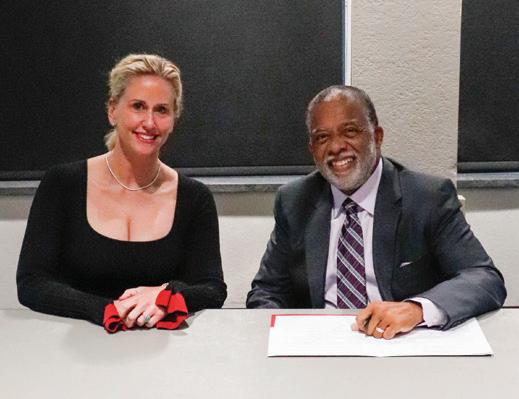
Danny Boston has made a significant contribution to increase the Launa Boston Scholarship Endowment. This scholarship was established in memory of Launa, ’80, ’87, and provides scholarship support to full-time undergraduate students who have a GPA of 3.25 or higher and are pursuing a degree in Sociology. It is Danny’s hope, as it was Launa’s, that future generations of graduates will experience the true spirit of generosity and make a positive mark in the world of social services.
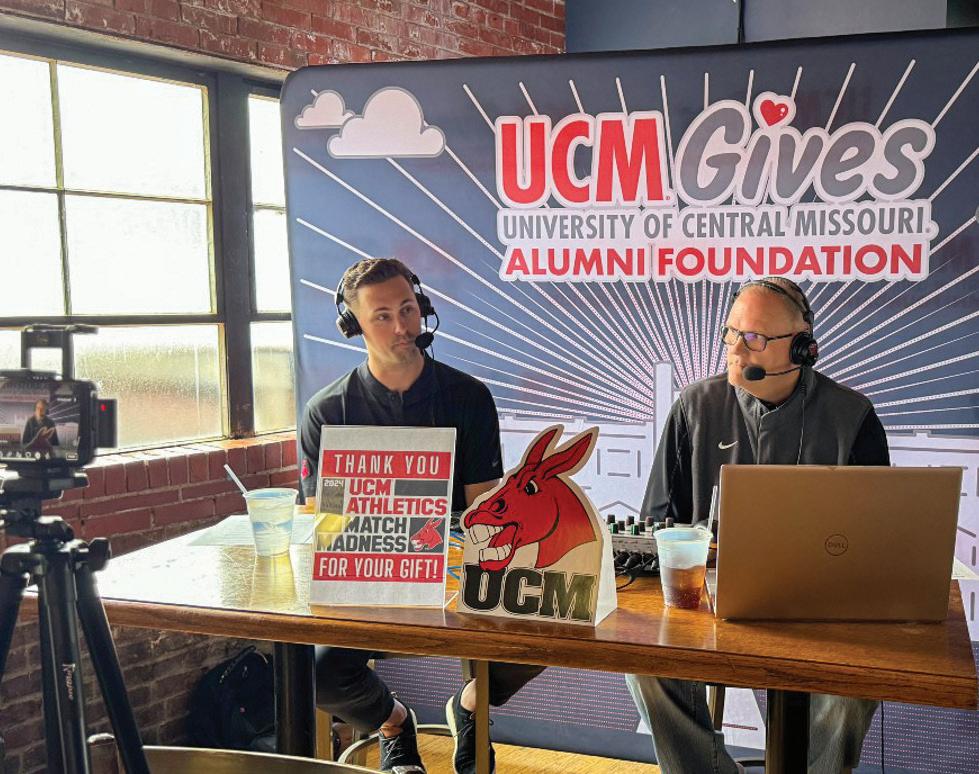
Alumni were also able to compete in Match Madness challenges. Derek Weber, ’05, won the Social Media Challenge, allocating his $250 prize to Mules Basketball. Cole Phillips, ’16, won the First-Time Donor Challenge and gifted his $250 to UCM Track and Field.
Special thanks to the family of the late Mules Wrestling Coach Roger Denker; Jim Brocksmith, ’78; Ken, ’86, and Kim Kempker; Mark Leicht, ’78; Dan, ’73, ’74, and Shirley, ’80, Power; and Larry, ’70, ’81, and Linda, ’70, ’80, Wade for stepping up with generous matching gifts.
Vicki McDonald, ’86, through Brady Commerce Park LLC, donated more than 2,500 straws of Classified cattle semen in support of operations at UCM’s Prussing Research Farm. Student Emily Hinds is pictured halter breaking one of UCM’s home-raised replacement heifers.
Peggy Palmer, ’51, has made significant contributions to support the UCM Baseball scholarship endowment, the Hendricks Hall renovation fund, and the Peggy Taylor Palmer Actuarial Science endowment and scholarship funds.
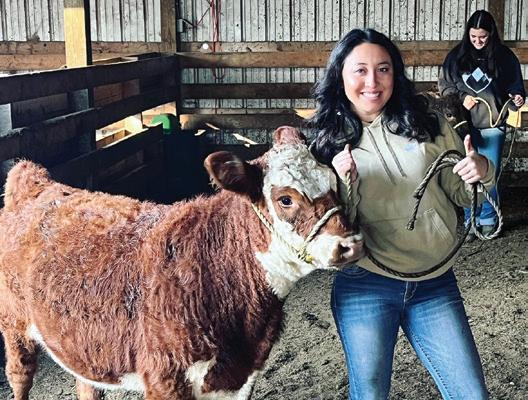
Toshi, ’72, and Chieko Shiohara have made a significant investment in the Maynard and Fern Beardsley Scholarship Endowment for International Students. As an international student attending UCM, Toshi was able to achieve his educational goals with assistance from the Beardsleys. This scholarship was established to honor them.
University of Central Missouri Magazine 21
NEWS
Aaron Slater signs endowment papers with UCM Alumni Foundation Executive Director Courtney Goddard.
KOKO radio covered the Match Madness “Power Hour.”

Mo Goes
GLOBAL
UCM Mascot Travels the World to Recruit Mules and Jennies
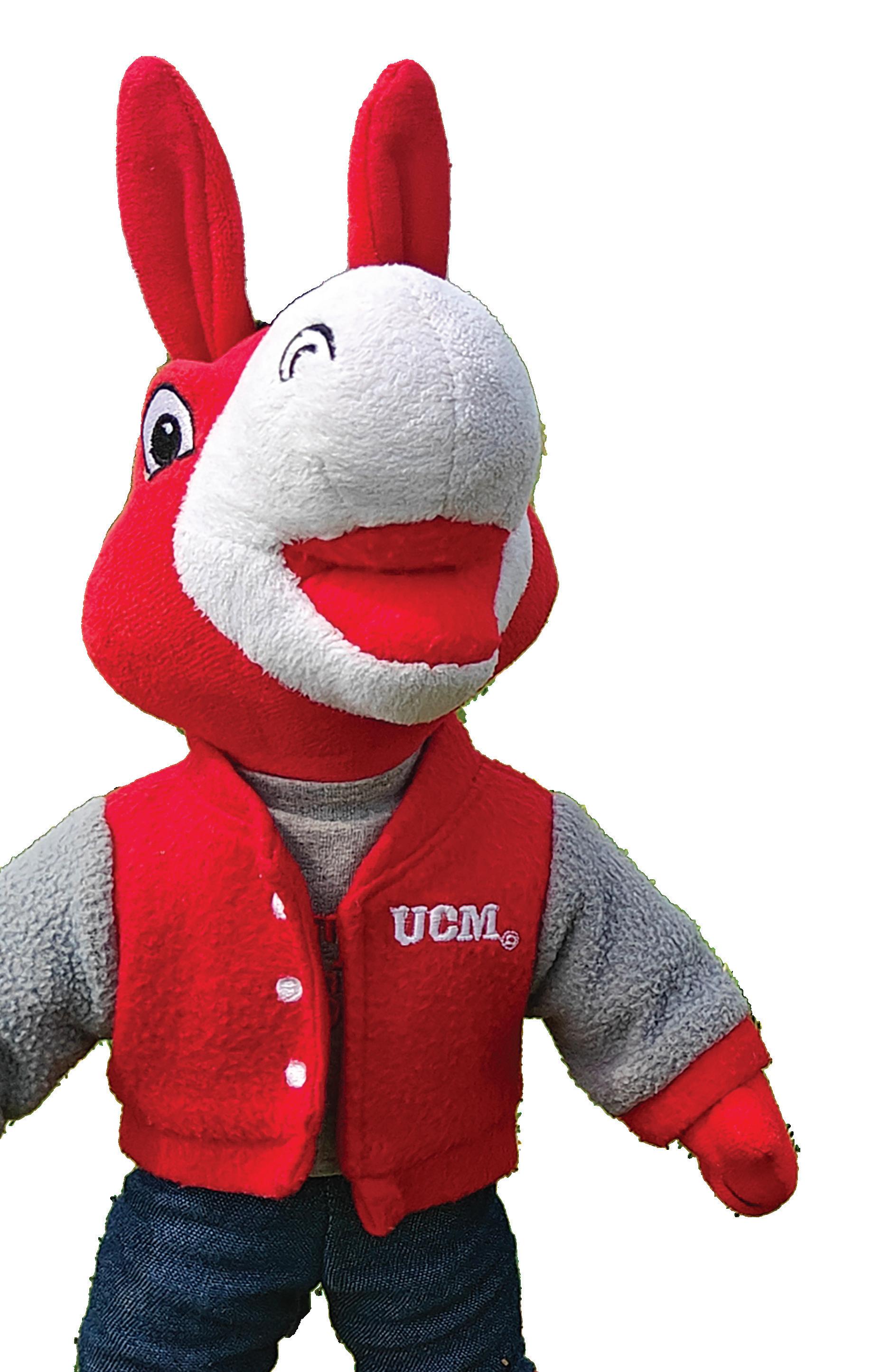
What could be better than getting paid to travel the world?
How about doing it with Mo the Mule?
Two University of Central Missouri employees are lucky enough to have this dream job, although in reality it does require a lot of hard work.
When Phil Hull became director of International Student Services in 2022, he brought with him 15 years of study abroad and international recruiting experience. Previously he served nearly a decade as an English professor.
Greg Holz also joined UCM in 2022 as an international recruiter, bringing 15 years of experience in nonprofit community outreach and teaching English as a Second Language.
Holz and Hull stepped into these positions at a time when UCM’s international student enrollment was experiencing the highest surge in the state.
After a nationwide lull due to the COVID-19 pandemic, Open Doors® ranked UCM as having the sixth highest international student enrollment on its list of Leading Master’s Colleges and Universities in 2022. During the 2021–22 academic year, there were 2,063 international students at UCM representing 35 countries.
A year later, Open Doors ranked UCM as having the third highest international student enrollment among all master’s degree-granting institutions in the U.S. With 3,777 total international students representing 48 countries in the 2022–23 academic year, UCM’s placement was only below Savannah College of Art and Design in Savannah, Georgia, which had 4,342 international students, and San Jose State University in San Jose, California, which topped the list with 4,671 students.
Part of the draw for international students to attend UCM is a flat tuition rate for MBA and master’s-level IT programs at the Lee’s Summit campus, proximity to Kansas City, and exchange and sponsored partnerships that permit students with J-1 visas to study for one to two semesters at the university’s campuses in Warrensburg and Lee’s Summit.
While the largest portion of UCM’s international student population hails from India, Kenya, Nigeria and South Korea, Hull and Holz are constantly recruiting students from as many countries as they can visit. This year they took Mo the Mule along on their adventures.

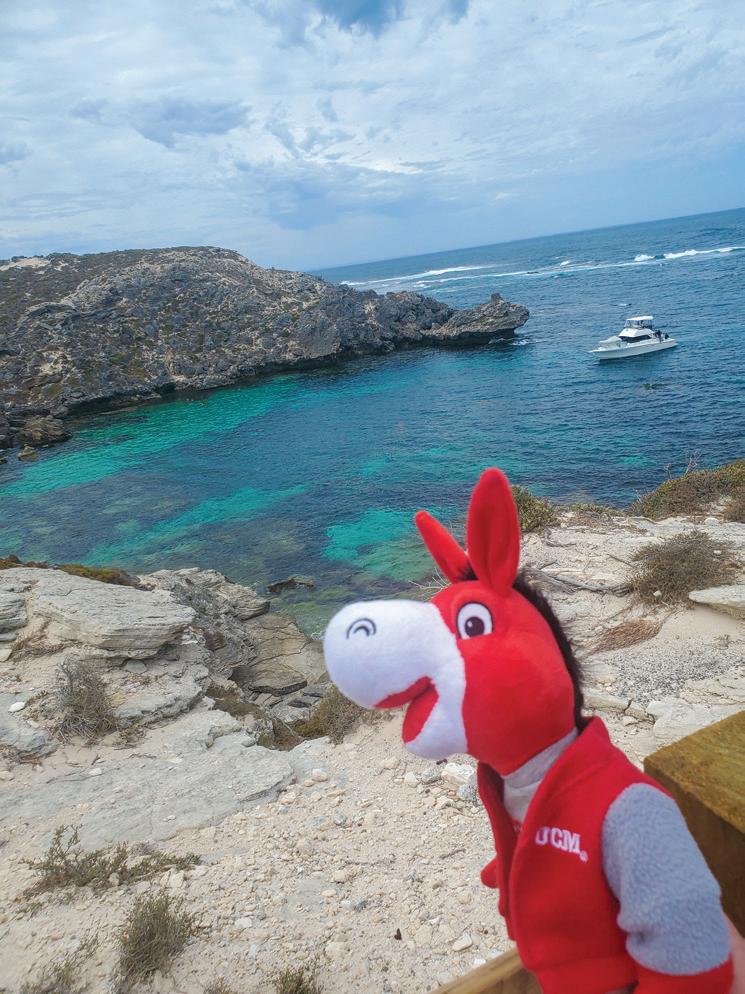


University of Central Missouri Magazine 23
One of the last places Mo visited this academic year with Phil Hull, left, and Greg Holtz, right, was Perth, Australia. They took a side trip to Rottnest Island, named “Rat’s Nest” for the indigenous quokkas the Dutch mistook for rats.
Mo started his travels this past academic year in the Carribean, visiting Aruba and Curacao in August.
of
Rottnest Island
Mo in Asia
Holz lived in Cambodia for 15 years before becoming an international recruiter at UCM. He took Mo to Battambang, Siem Reap and Phnom Penh this academic year, visiting schools and the Australian Centre for Education (ACE), run by IDP Education, a partner of UCM. Based in Melbourne, Australia, IDP operates in 80 countries around the world to place students in study abroad opportunities. Cambodia is the only location for ACE, which provides English language learning programs for more than 20,000 students across Southeast Asia.

Mo joined up with the U.S. Department of State’s EducationUSA East Asia Pacific college fair circuit when visiting Vietnam, stopping in Ho Chi Minh City, Da Nang and Han Noi.
Since 2022, UCM has had an articulation agreement with Taylor’s University in Selangor, Malaysia. This allows students to begin their studies at Taylor’s, then complete their master’s degree in Teaching English as a Second Language within a year on the UCM campus. Also since 2022, a Memorandum of Understanding (MOU) with Hengshui University in China has allowed Chinese students to complete the final year of their bachelor’s degree at UCM, where they continue on an accelerated path toward earning their master’s. Faculty members serve as visiting lecturers on each other’s campuses.
In 2023, UCM signed an MOU with Hiroshima College of Foreign Languages (HCFL) in Japan, allowing students to come to Missouri to pursue a degree or to utilize opportunities available through UCM’s English Language Institute. The institute offers an Intensive English Program, professional language training and short-term cultural programming to help English language learners develop skills they need to succeed in higher education and in their careers.

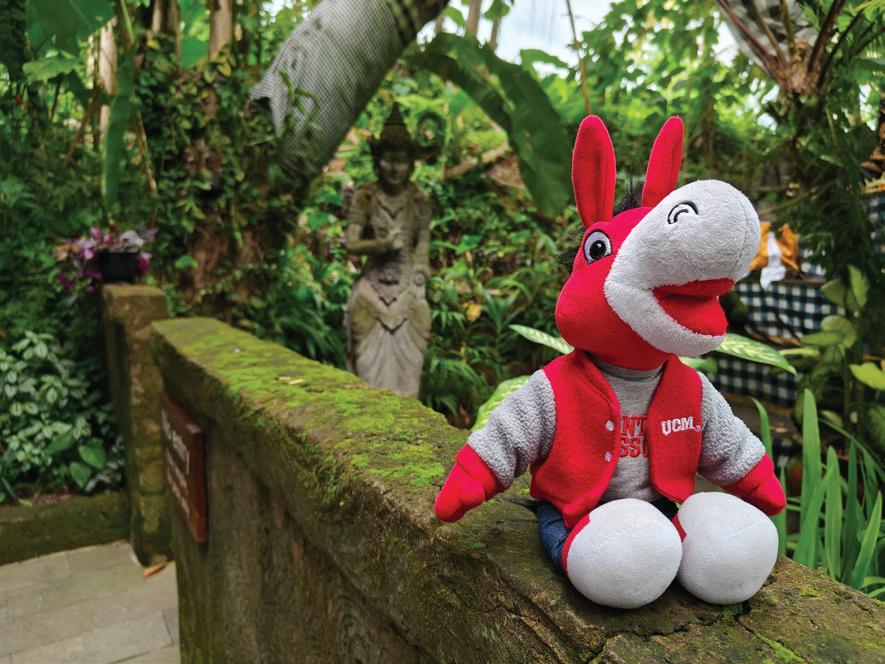


24 Spring 2024 | ucmfoundation.org/magazine
Greg Holz visited WEduAbroad in Phnom Penh, Cambodia, in September 2023.
Mo in Phnom Penh
MoinBattambang
Mo in Indonesia
Mo in Angkor Wat
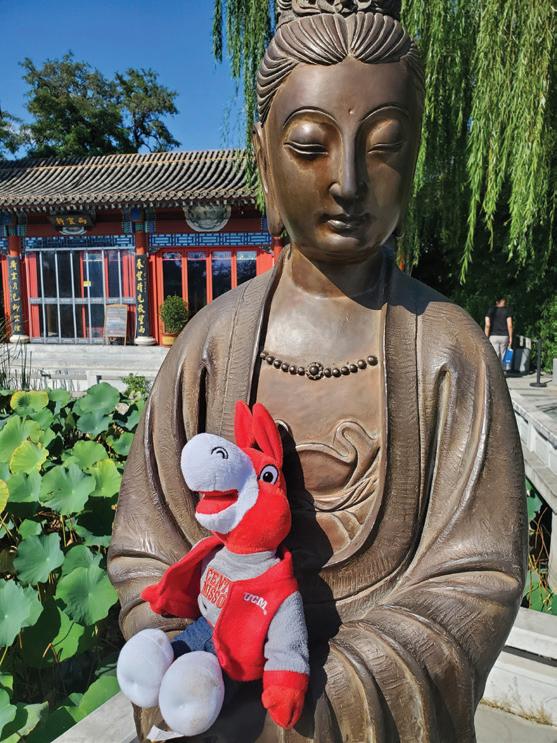



University of Central Missouri Magazine 25
Hengshui
Phil Hull talked with UCM’s partners at Hengshui University in Hebei province, China, in September 2023.
Mo in China
Mo in Vietnam
Mo in the Balkans and Africa
In October 2023, Mo visited the Balkans and Africa. Places he went in the Balkans during EducationUSA’s Southeast Europe tour included Kosovo, Albania, Montenegro, Croatia, Bosnia, Slovenia and Serbia. He also visited the island of Cyprus in the Mediterranean, recruiting at one high school on the Greek side and one on the Turkish side and attending an International Studies Fair in Nicosia.
In Africa, Mo went to Nigeria, Ghana, Kenya and Ethiopia recruiting high school students at Merton International School, Crawford International School, the Aga Khan Academy and International Community School, to name a few.
UCM has long-standing partnerships in Nigeria and Kenya. Its latest collaboration is an MOU with the government of Kenya’s Makueni County, the South Eastern Kenya Economic Bloc and the Global Collaborative Exchange, which is focused on “providing emerging populations with technological infrastructure and modular applications platforms.”
The agreement, launched in January 2021, aims to resolve local challenges through global collaboration. Students at UCM’s Missouri Innovation Campus in Lee’s Summit can work together virtually with students in Kenya toward industry-recognized certifications and accredited degree programs.
As existing partnerships grow and new ones develop, international enrollment at UCM is stronger than ever this spring, with 3,974 total international students from 52 countries. This population accounts for nearly 30% of UCM’s total student body.
Hull credits much of that to word-ofmouth recruitment.
“Good news travels fast,” Hull says, “and our international students have good things to say about their experiences here.”
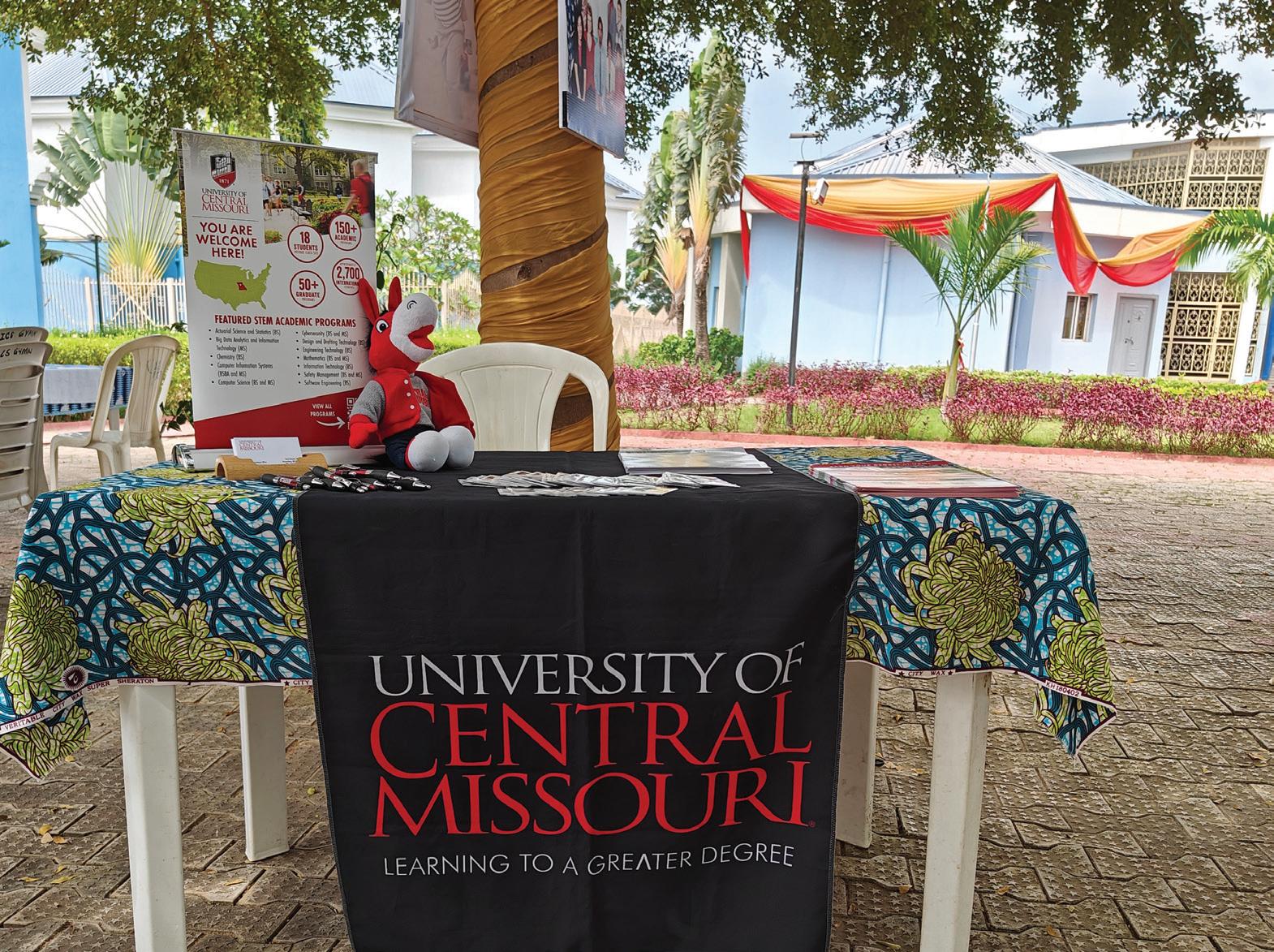

“International students’ presence and their stories show us that the world is, indeed, small and that learning at UCM is both local and global.”
— Phil Hull, Director of International Student Services
Mo on the Lateiner Bridge in Sarajevo, Bosnia, where Archduke Franz Ferdinand was assassinated, launching World War I.
26
2024
Spring
Spring
| ucmfoundation.org/magazine
2024 | ucmfoundation.org/magazine



University of Central Missouri Magazine 27
Mo in Ethiopia
Mo in Croatia
Mo in Ghana
Conversation Starters
One topic on every educator’s mind this year is artificial intelligence. We asked UCM faculty members to tell us how AI is impacting the way they teach, the way students learn and the workforce of the future.
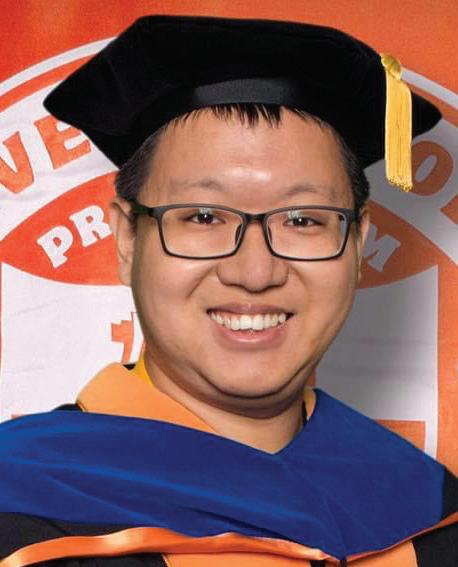
Top Concerns
”The primary concern associated with AI is job displacement, especially for jobs involving routine and repetitive tasks. However, there is no need to be overly alarmed, as AI also holds the potential to create new job opportunities in various industries. With evolving technology, new roles and skill sets may be in demand. Acquiring these new skills requires some training, making education crucial in the future AIdriven world.
The second concern is bias. Since most AI systems are trained using data, they inadvertently inherit and perpetuate biases present in that data. You may have already come across some embarrassing images containing historical mistakes generated by AI. Such biased or unfair outputs can have negative impacts on individuals or groups.
The third concern is the lack of explainability in AI. Most AI models operate as neural networks. Understanding how the parameters inside these neural networks comprehend real-world problems and make decisions remains inexplicable, or at least not easily understandable. This lack of transparency can lead to trust issues in AI systems, especially in critical applications such as autopilot.
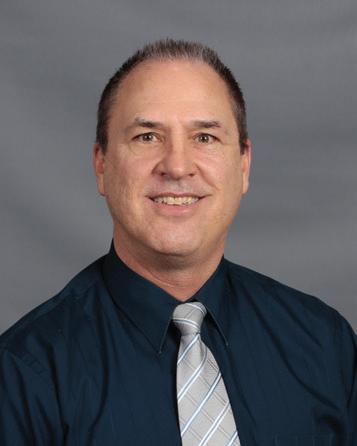 “Charlie Schwepker, Randall and Kelly Harbert Marketing Professor
“Charlie Schwepker, Randall and Kelly Harbert Marketing Professor
“Sales Simulation

AI is a tool that holds much promise in higher education. My son, Anthony, a spring UCM marketing graduate and current MBA student, collaborated with UCM alumnus and former faculty member Stephen “Tyler” Hirlinger to develop a sales role-play tool (salessim.net) that uses AI. I am currently using it to input characteristics surrounding a fictional buying situation that will be the subject of a role-play at a national sales competition. Using a computer or tablet, students practice asking the company’s fictional buyer questions they developed. The AI buyer responds to their questions in real time, allowing them to carry on a conversation in a simulated sales role-play. Moving forward, combining AI with virtual reality will prove useful in conducting simulated role-plays in both industry and the classroom.
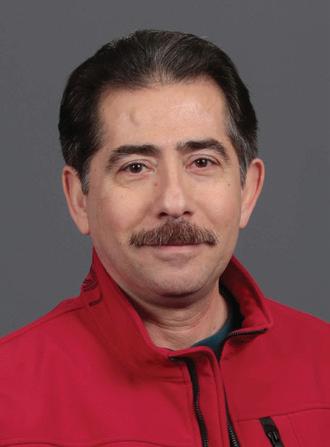 Zaid Mahir, Assistant Professor of English
Zaid Mahir, Assistant Professor of English

Writing Coach
”I have been using AI in teaching since fall 2022. Both in my online and face-to-face classes, using AI has proved to be a rewarding experience. The classes I teach usually require a lot of writing — at least from the student’s point of view — and students are pressured by the requirements of rigorous academic writing. AI helps ease the pressure by providing them with instant feedback, from the moment they start writing to the moment they submit their assignment. The feedback is comprehensive and based on my instructions to the AI learning management system that I use: Packback. It also checks their writing for plagiarism and makes suggestions to the students regarding the credibility of the sources that they consult as part of their research projects. As a result, I get to have more time working with my students on meeting the course objectives.
Linrui Zhang, Assistant Professor of Computer Science
UCM NEWS
28 Spring 2024 | ucmfoundation.org/magazine ”
Spot the Differences
It’s getting easier than ever to create or manipulate a photo using a free AI image generator. Using the generative fill tools in Adobe Photoshop, powered by Adobe Firefly generative AI, we made a few changes to this photo of UCM’s student union, dating to the early 1960s. Can you spot the 16 differences in the second image, which was edited using AI prompts? Some are obvious, while others are more subtle.
Find the answers on the inside back cover of this magazine.


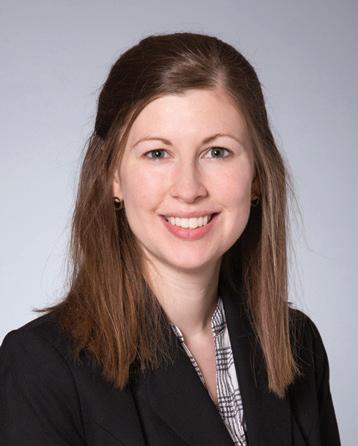 Lauren Hays, Associate Professor of Educational Technology
Lauren Hays, Associate Professor of Educational Technology
“Teaching Tool
In my role working with K-12 educators, we have spent time exploring AI tools this academic year. In the fall, my goal was for students in the course Seminar in Educational Technology to become familiar with many different AI tools. Together, we explored MagicSchool.ai, ChatGPT, Google Bard (now Gemini), Eduaide.ai, Claude and others. This led to students discovering how these tools can be used to support their work as educators through assistance in writing rubrics, letters of recommendation, parent communication, etc. Students also discussed ideas they had for using AI tools with their own students. In a future class, I plan to have students develop procedures for using AI for assessment.

University of Central Missouri Magazine 29
”
UCM NEWS
Faculty/Staff Achievements
Melissa Abner, ’08, associate professor and program coordinator of Fashion and Apparel Merchandising, received UCM’s 2024 Education for Service Award for faculty.
Shari Bax, vice president for Student Experience and Engagement, was named one of Ingram’s 2024 Icons of Education.
Kristy Boney, associate professor of German and chair of the Department of Modern Languages and Interdisciplinary Studies, received the 2024 Byler Distinguished Faculty Award.
Emily Ciesielski, assistant professor of Communication Disorders, was named to the board of the Kansas-Missouri branch of the International Dyslexia Association and received the Award for Continuing Education from the American Speech-Language-Hearing Association.
Sarah Craig, ’06, ’15, director of the Office of Sponsored Programs and Research Integrity, received the 2023 J.P. Mees Award for Outstanding Professional Staff.

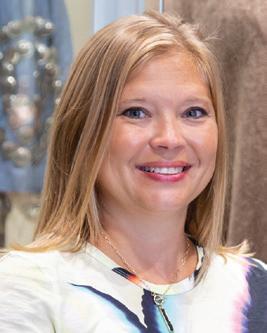
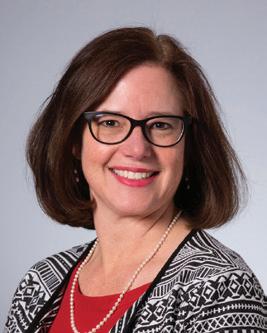
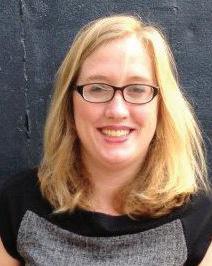
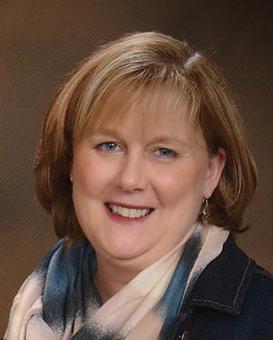
Jaqlyne Jackson, ’09, ’12, associate vice president of the UCM Alumni Foundation, completed her Doctorate of Education in Organizational Leadership in Higher Education through Abilene Christian University.
Woo-young Lee, professor of Sport Management, earned the Best Paper Award at the Sport Entertainment and Venues Tomorrow (SEVT) Conference.
Jeff Murphy, ’80, ’95, director of communications and media relations in the Office of Integrated Marketing and Communications, received UCM’s 2024 Education for Service Award for staff.
Dan Othic, ’96, ’06, received the Clarence M. Kelley Meritorious Service Award from the Kansas/Western Missouri Chapter of the FBI National Academy Associates.
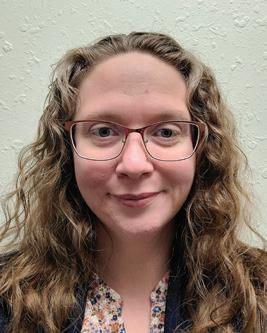
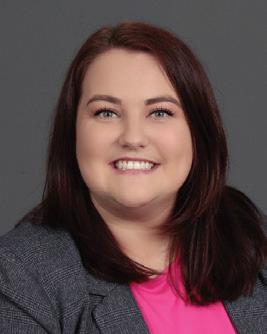
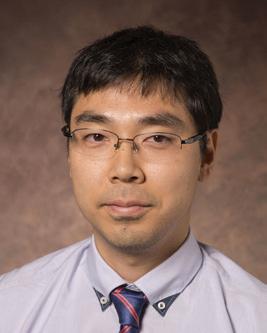
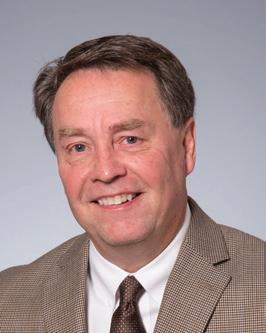
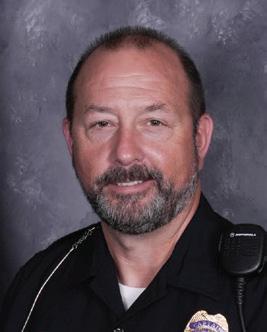
Robert Paul with the Missouri Safety Center was appointed to the Technical Advisory Panel for the Drug Evaluation and Classification of the International Association of Chiefs of Police and the National Highway Traffic Safety Administration.
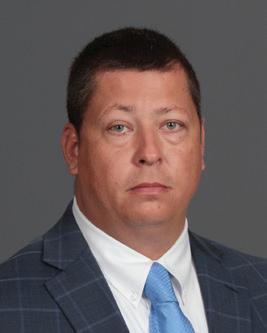
Janice Putnam, a registered nurse and professor of Health Studies, received the 2024 Governor’s Award for Excellence in Education.
An Quigley, ’94, senior designer and brand manager for the Office of Integrated Marketing and Communications, received the university’s 2023 Outstanding Staff Award.
George Tart, program coordinator for the Missouri Motorcycle Safety Program, was selected to serve as chairperson of the State Motorcycle Safety Association’s Policy and Research Committee.
Sushil Thapa, assistant professor of Agronomy, was elected vice leader of the Global Climate Change Community within the American Society of Agronomy.
Lynn Urban, professor and chair of UCM’s Department of Criminal Justice and Criminology, was appointed to the Missouri Chamber of Commerce and Industry Public Safety Alliance.
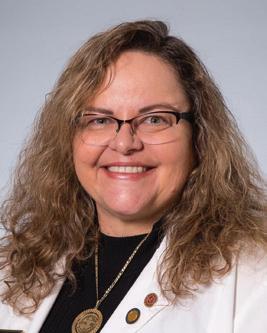
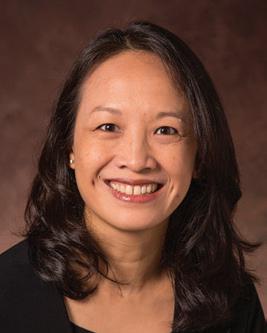
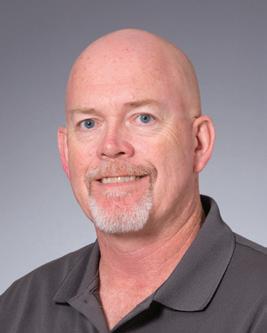
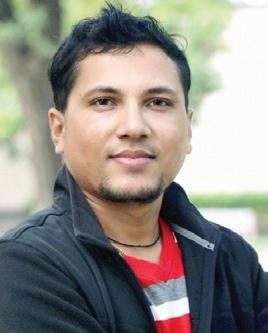
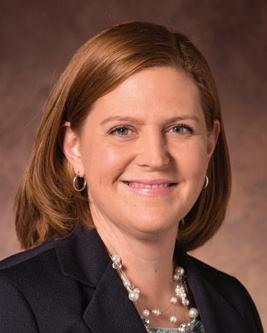
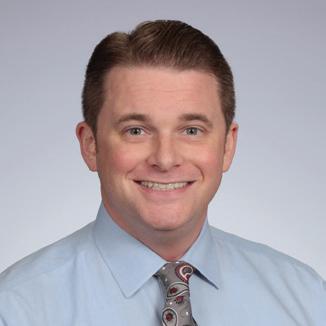
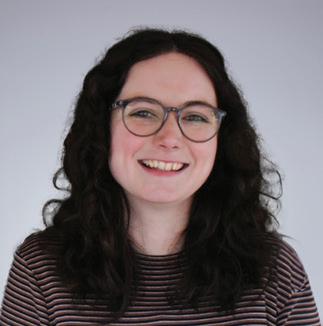
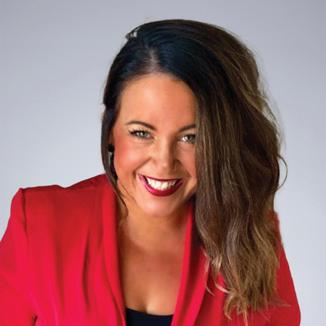

30 Spring 2024 | ucmfoundation.org/magazine
UCM NEWS TYLER HABIGER DIRECTOR OF ANNUAL GIVING UCM ALUMNI FOUNDATION COURTNEY SWOBODA DIRECTOR OF MILITARY AND VETERAN SERVICES REBEKAH MAUSCHBAUGH COMMUNICATION AND EVENTS LIBRARY ASSISTANT LINDSAY TEGTMEIER ADJUNCT PROFESSOR SGT. JOE JENNINGS POLICE SERGEANT Congratulations to these recipients of the Warrensburg Star Journal’s “20 Under 40” Award!
Multipurpose Building Renamed Jerry M. Hughes
Athletics Center
Friends and family of longtime University of Central Missouri Athletics Director Jerry Hughes, ’71, ’79, called UCM’s Multipurpose Building his home away from home. Renamed the Jerry M. Hughes Athletics Center, the building will now remind visitors of his impact on the campus community and beyond.
On Feb. 17, more than 100 people gathered for a ceremony posthumously honoring Hughes’ 40 years of service to the university and inducting him into the UCM Athletics Hall of Fame. Hughes, who passed away in January 2023, will be inducted into the MIAA Hall of Fame on June 3, 2024. The building’s new moniker is permanently displayed on the east side, and a recognition wall can be found inside the main hallway at the northeast entrance.
In his remarks, UCM President Roger Best highlighted the renovation and new construction projects Hughes had a hand in making possible.
“As you look to the west, you see Crane Stadium,” Best said. “If you look to the east, you will see Walton Stadium and
Kennedy Field. If you look to the south, you will see Mules National Golf Course, then to the east and south you will see the South Recreation Complex. … So there is very tangible evidence of Jerry’s involvement and commitment to this university from his years of service. It seems only fitting to me that, in the center of all of that, we have named a facility after him.”
During Hughes’ tenure as athletics director, UCM student-athletes won 179 MIAA championships and 10 NCAA Division II championships, finished in the Top 4 at 50 other national championships, and made more than 300 NCAA postseason appearances.
Hughes was the only athletics director to be named NCAA II Central Region Athletics Director of the Year four times and received the Conference Commissioners Association Award of Merit in 2022. He was also inducted into the Missouri Sports Hall of Fame in 2005 and named a Missouri Sports Legend, the highest honor bestowed by the Missouri Sports Hall of Fame, in 2016.
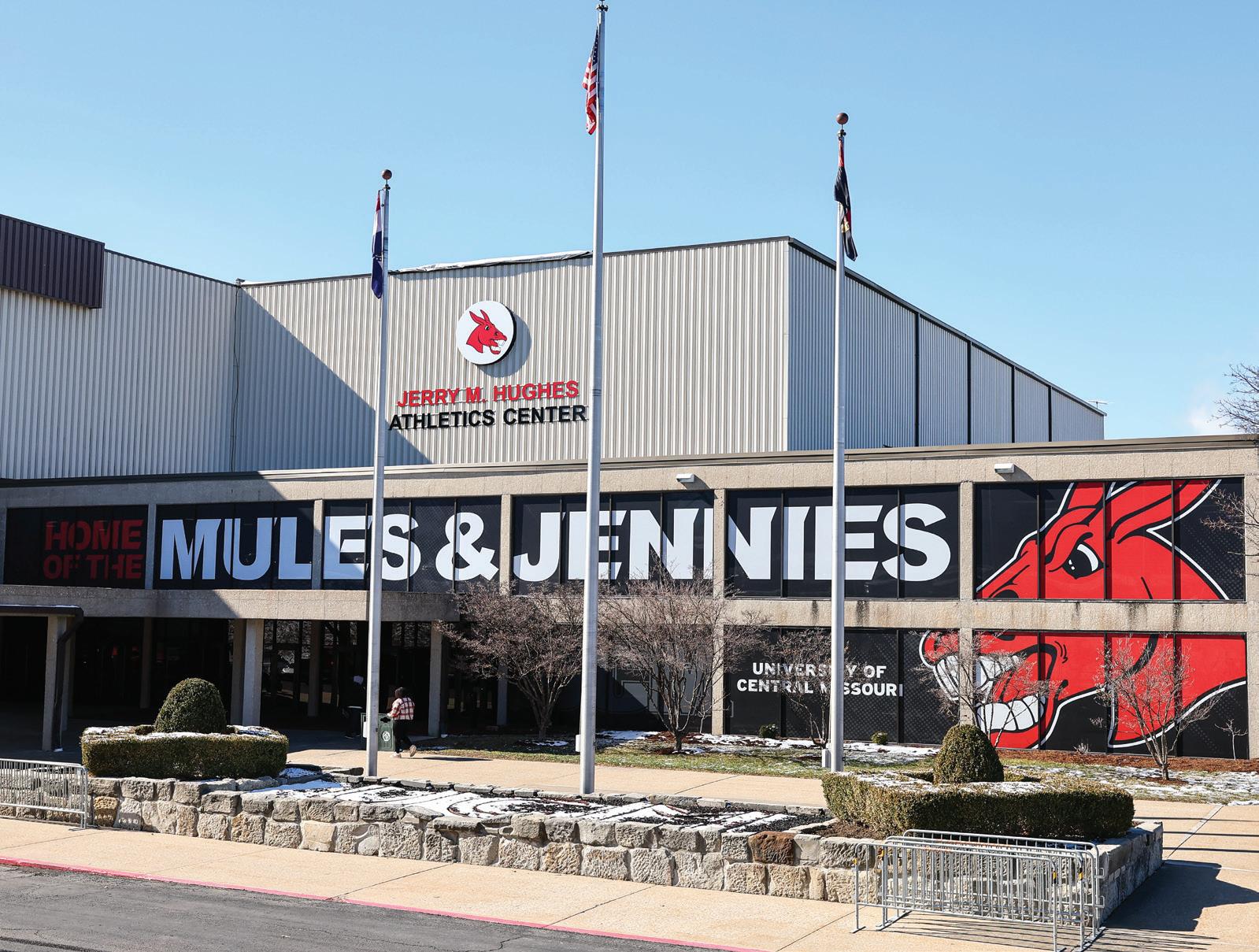
Student-Athletes Take Time Out for Reading
By Jace Uchtman, ’24
For three decades, studentathletes from the University of Central Missouri have been inspiring young readers at Warrensburg elementary schools. The schools create a wish list of reading materials, and UCM provides one book for each classroom. The studentathletes then divide and conquer.
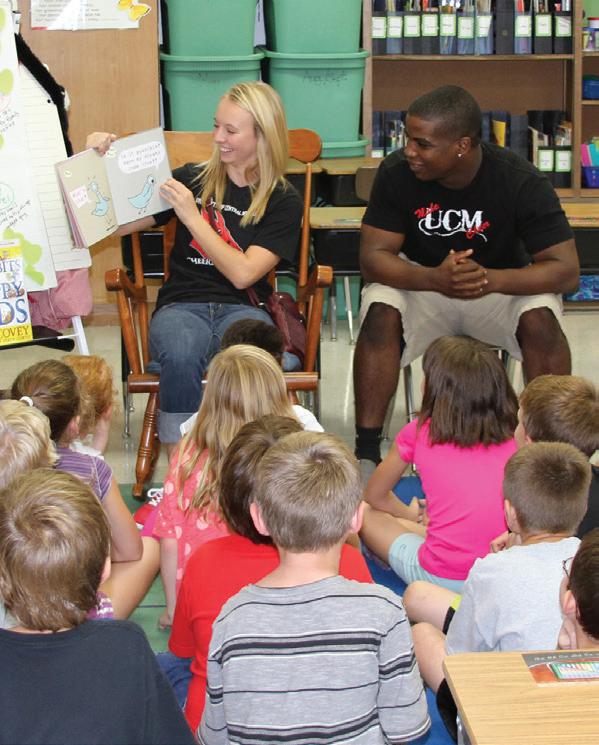
This is the Literacy Team, created 32 years ago by the late UCM Athletics Director Jerry Hughes in memory of his mother, Eleanor Hughes, who was an avid reader, and his first wife, Carol Hughes, who was a reading teacher.
The Literacy Team caught national attention and was named one of 25 finalists for the 2024 NCAA Division II Award of Excellence. Kirsten Shaw, a library media specialist at Martin Warren Elementary, has been working with the team for more than a decade and nominated them for a national commendation from the American Association of School Librarians.
“It’s one of our students’ favorite events of the year,” says Shaw. “When the athletes come in, the students are completely engaged. Some of the athletes stay after school and play with the kids. It’s really cool to see the time they invest with the kids.”
Every UCM sports team plays a hand in the success of the program. This past year, the Literacy Team provided local schools with 81 new books, and over the history of the program more than 25,000 books have been donated. Funding comes from the Eleanor G. Hughes and Carol Dyetta Hughes Literacy Program established by Jerry Hughes, as well as UCM Athletics partners and private donors through the UCM Alumni Foundation.
University of Central Missouri Magazine 31
of ATHLETICS
ATHLETICS
SPORTS HIGHLIGHTS
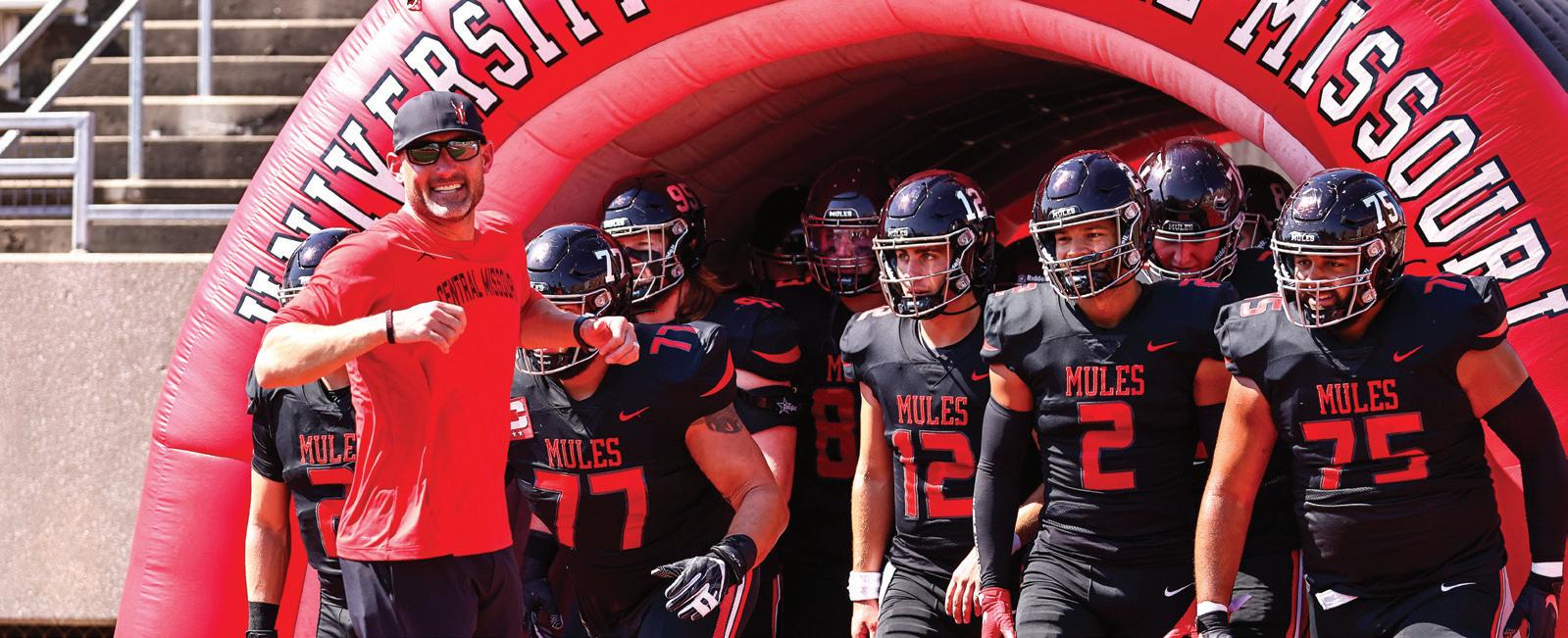
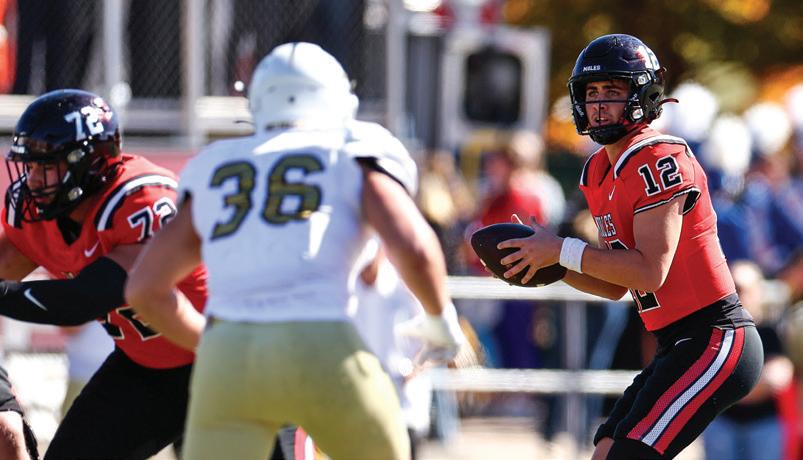
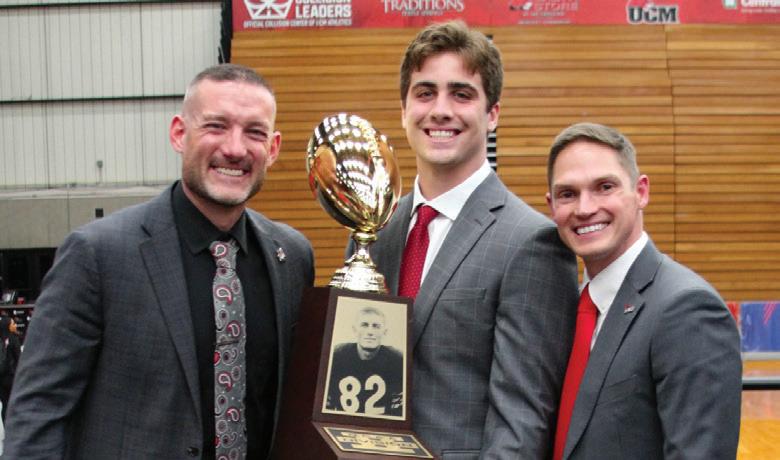
MULES FOOTBALL
University of Central Missouri Mules Football enjoyed one of the best seasons in program history in 2023, compiling an overall record of 11-2 and winning the MIAA Championship with a 9-1 mark in conference play. It was the 14th conference crown in the program’s history. UCM advanced to the NCAA Division II Playoffs second round before falling to eventual 2023 NCAA Division II National Champion Harding University, 35-34. The 11 wins tied a program record.
UCM quarterback Zach Zebrowski became the second Mule to win the prestigious Harlon Hill Trophy as the top player in all of NCAA Division II football. In addition, Zebrowski was named a consensus First Team All-American, receiving All-American accolades from the AFCA, D2CCA and Associated Press. He was named the D2CCA Ron Lenz Division II Offensive Player of the Year, D2CCA Super Region III Player of the Year, MIAA Offensive Player of the Year and NCAA.com Division II Offensive Player of the Year.
In addition to Zebrowski, wide receiver Arkell Smith, offensive lineman Gabe Clark and defensive back Wyryor Noil all received First Team All-American honors. UCM had an impressive 16 student-athletes named All-MIAA.
Head Coach Josh Lamberson earned AFCA Division II Super Region III and MIAA Coach of the Year honors after leading the Mules to the MIAA title and 11-2 record in his second season at the helm.
The Mules set numerous team records in 2023, including most total plays (1,042), most yards gained (7,721), most touchdowns (89), most points (642), most passing yards (5,433), most yards passing per game (417.9), most TD passes (62) and most first downs (398).
UCM led all of NCAA Division II in total offense (598.3 yards per game), scoring offense (49.4 points per game), passing offense (417.9 yards per game) and first downs (398).
The Mules also had several outstanding performances in the classroom, as Curtis Appleton II, Ethan Brown, Gabe Clark, Luke Dobson, Reed Kaburick and Cale Miller were all named to the College Sports Communicators Academic All-District Team.
Clark and Miller both earned College Sports Communicators Academic All-America accolades
FALL 2023
JENNIES SOCCER
Jennies Soccer compiled an overall record of 16-5-2 and went 8-1-2 in the MIAA, finishing second in the conference standings in 2023. The Jennies advanced to the NCAA Division II tournament for the 13th straight year and 16th time in program history, falling in the second round of the Central Regional to eventual national runner-up Washburn University, 3-2 in double overtime.
Midfielder Caroline Cole and defender Emma Burden were named First Team D2CCA All-Central Region while midfielder Andree Orcutt was a United Soccer Coaches All-American and Second Team D2CCA All-Central Region honoree. In addition, nine Jennies earned All-MIAA accolades.
UCM also excelled in the classroom in 2023, as Burden, Cole, Ashleigh Martin, Molly Ricker and Lexie Ruf earned a spot on the College Sports Communicators Academic All-District Team.
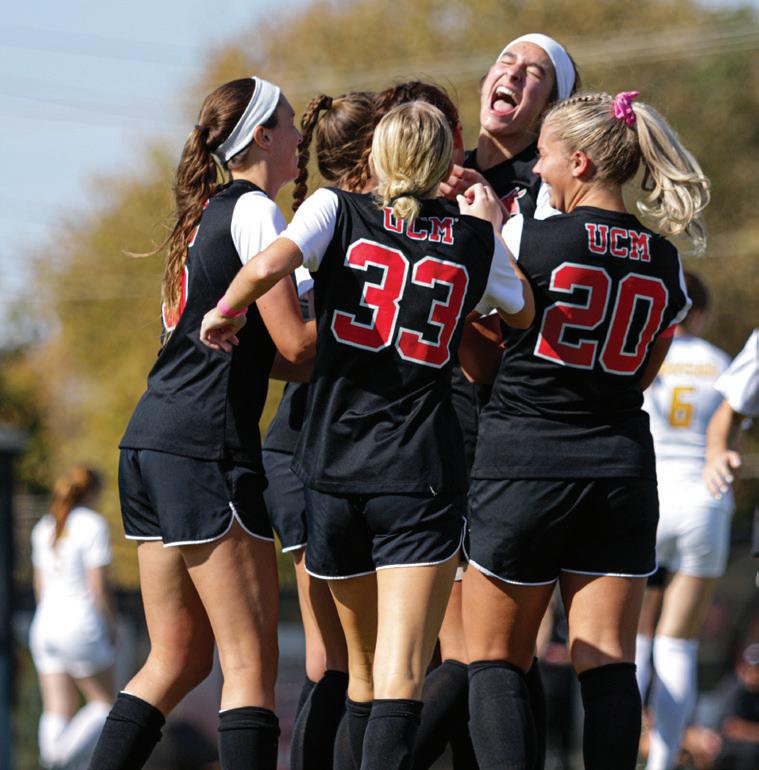
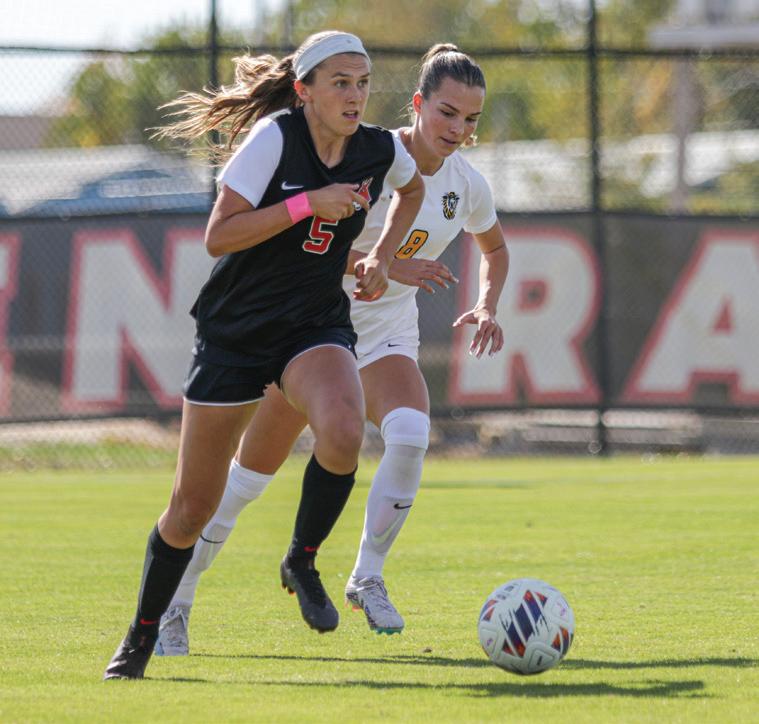
32 Spring 2024 | ucmfoundation.org/magazine
Spring 2024 | ucmfoundation.org/magazine
Mules Football Head Coach Josh Lamberson, quarterback Zach Zebrowski and Vice President for Intercollegiate Athletics Matt Howdeshell at the Harlon Hill award ceremony.
Ashleigh Martin
ATHLETICS
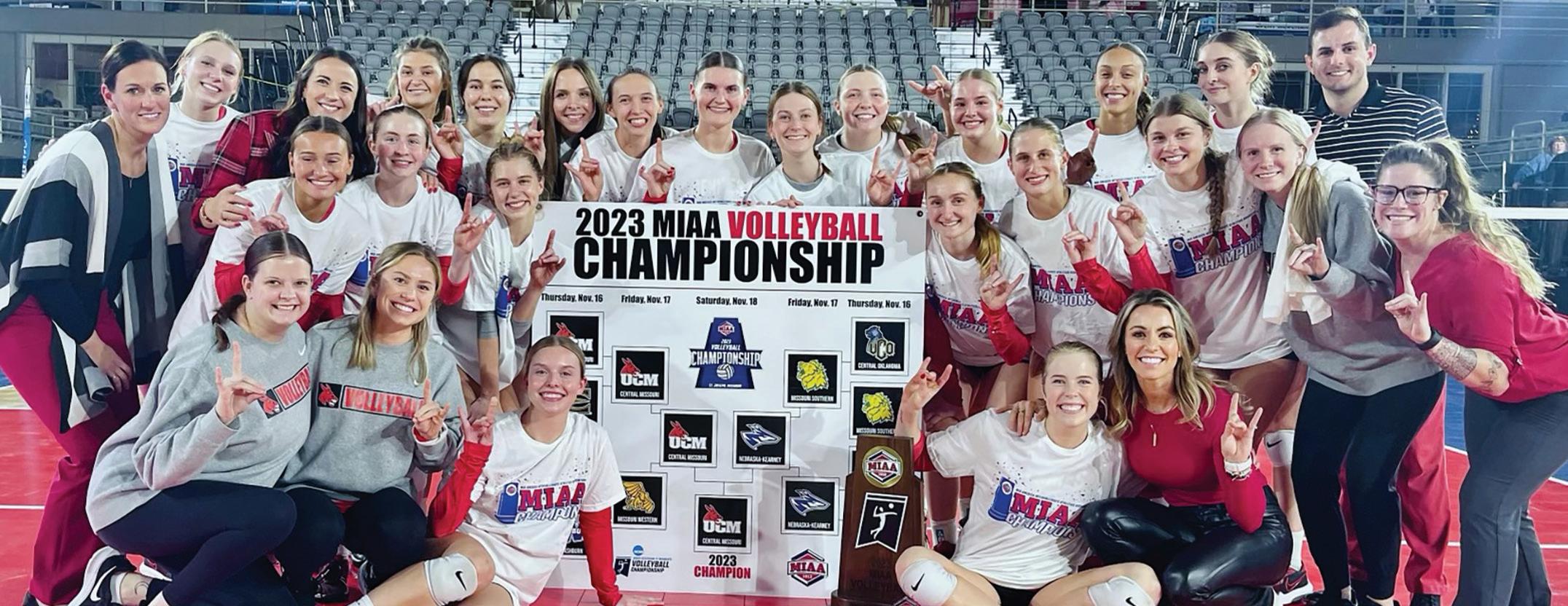
JENNIES VOLLEYBALL
The Jennies finished the 2023 season with an overall record of 25-8, winning their 26th MIAA Regular Season title along with the program’s fourth conference tournament title. Head Coach Caitlin Peterson was named the 2023 MIAA Coach of the Year.
After winning 10 matches against AVCA Top 25-ranked teams, making the program’s 37th NCAA Tournament appearance, the Jennies had three AVCA All-Americans in setter Olivia Olson. Olson was a Second Team selection, while redshirt senior Kersti Nix and middle blocker Elinor Engel received Honorable Mention.
In total, eight players were All-MIAA selections highlighted by 2023 Player and Setter of the Year Olivia Olson, who was one of four First Team members alongside sophomore Rachel Ziesman, outside hitter Kersti Nix and freshman Elinor Engel. Outside hitter Sydney Lierz and freshman Emma Siron were All-MIAA Second Team selections. Middle blocker Grace Southern and libero Grace Winkelmann received All-MIAA Honorable Mention.
UCM MULEKICKERS

For the second consecutive year, the UCM Mulekickers placed in the Top 10 for Open Pom at the Universal Dance Association’s College Dance Team National Championship in Orlando, Florida.
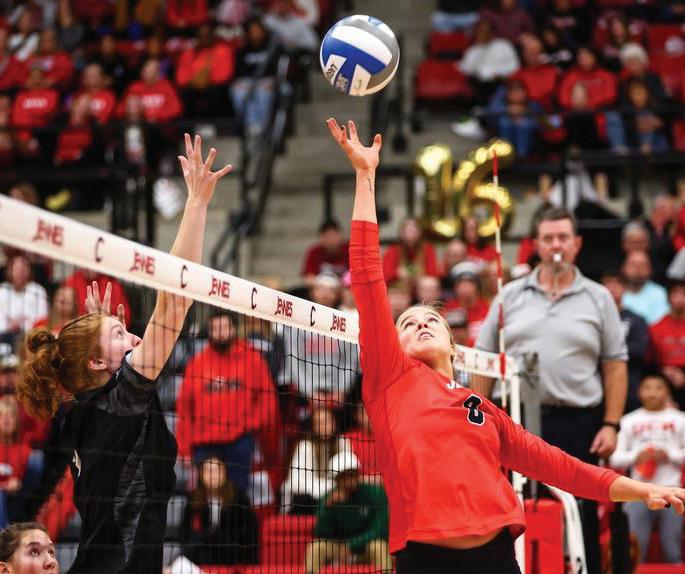
MULES AND JENNIES CROSS COUNTRY
The Mules Cross Country team ended the 2023 season placing 10th or higher in every meet, including a second place finish at the Southwest Baptist University Bearcat Invitational in Bolivar, Missouri, where three individuals placed in the Top 10.
Sophomore Brian Mitei earned All-MIAA honors, finishing in second place at the conference meet. Junior Bryan O’Barr earned All-MIAA Honorable Mention accolades with a 17th place finish. Mitei, a native of Kaptarakwa, Kenya, qualified for the NCAA-II National Championships after placing ninth at the Central Region Championships.
On the women’s side, the Jennies placed 10th or better in every meet, highlighted by a fifth place showing at the Brian T. Simpson Invitational in Columbia, Missouri. UCM had two runners end the season with three Top 20 finishes, including redshirt senior Katie Bean and sophomore Chloee Belgum.


University of Central Missouri Magazine 33
Olivia Olson
Brian Mitei
Katie Bean
Construction Management Golf Tournament in Columbia, Missouri, Aug. 21, 2023
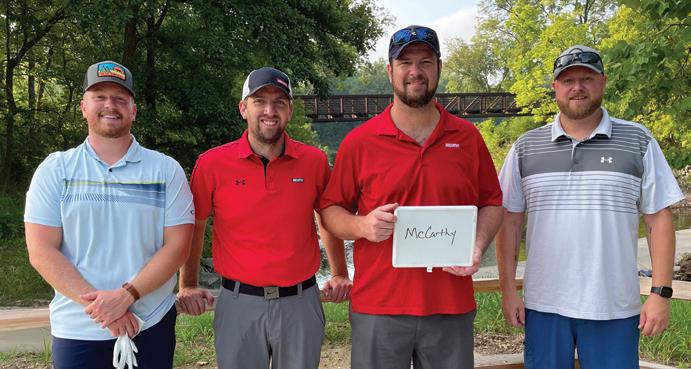
Ethan McCraken, Scott Nuamann, Zach Wheeler, ’12, and Dan Schaefer, ’14.
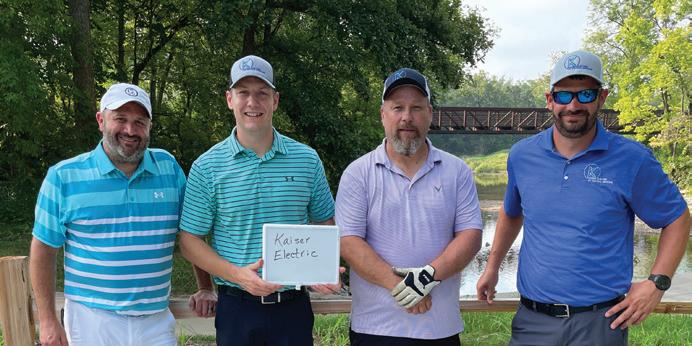
Justin Hatfield, Cole Lodge, Brian Buschjost and Mark Baxter.
MuleNation at the State Fair in Sedalia, Missouri, Aug. 15, 2023
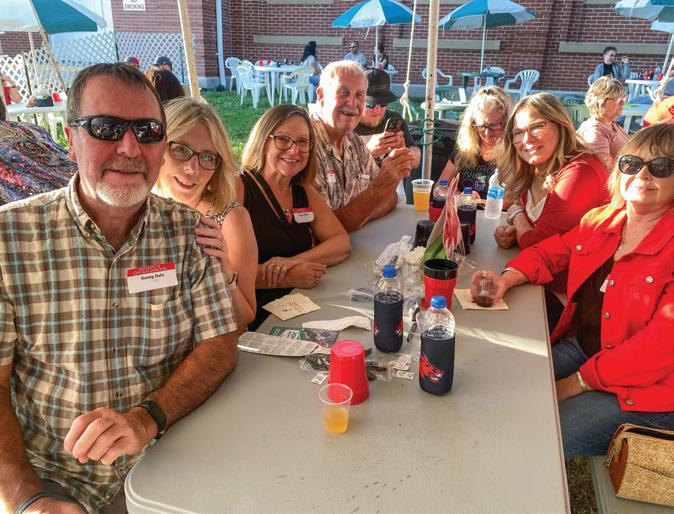
MuleNation in Augusta, Missouri, Sept. 28, 2023
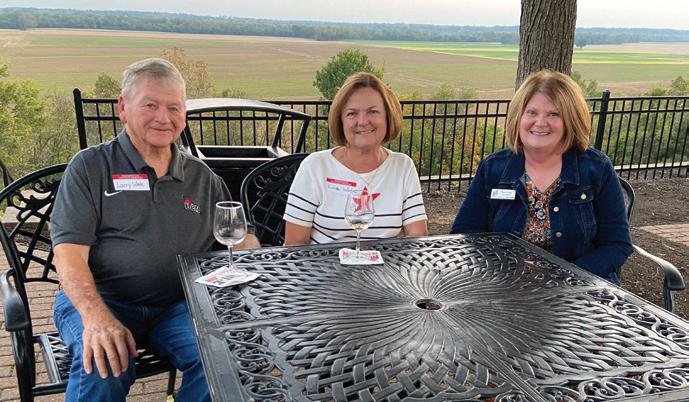
Larry Wade, ’70, ’81, Linda Wade, ’70, ’80, and Darla Harmon.
Alumni Ambassadors’ Signature Event, Town Center Plaza, Leawood, Kansas, Nov. 14, 2023

Emily Miller, Mikayla Stebbing, Rebecca Eidson, Brea Parnell, Carson Couch, Ashley Kippes, Rebecca Tumusifu, Morgan Starbuck, Tracy Palmer, ’94, Karson Weymuth, Andrew Wania, Tiffany Cochran, ’05, ’23, Jackie Jackson, ’09, ’12, and Paige Shinn, ’23.
MuleNation Kansas City at Boulevard Brewing, Dec. 7, 2023

Alex Nuelle, ’19, Jordan Gilbert, ’20, Adrianna VanLue, ’20, and Christina VanLue, ’19.
MuleNation St. Louis at The Fountain, Dec. 6, 2023
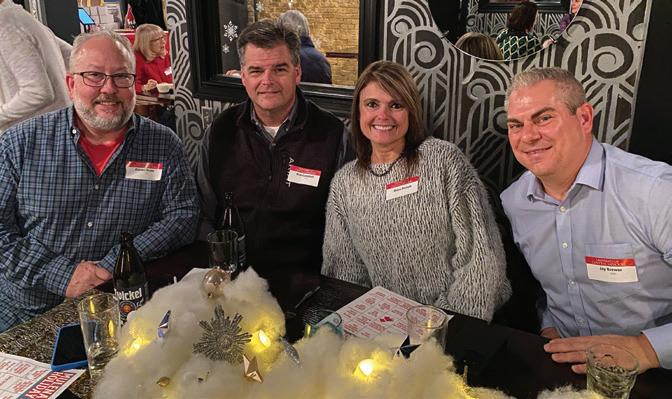
Darren Scotti, ’93, Rick Campbell, ’92, Diana Daniels and Jay Brewer, ’00.
MuleNation Kansas City at Pierpont’s, Sept. 21, 2023
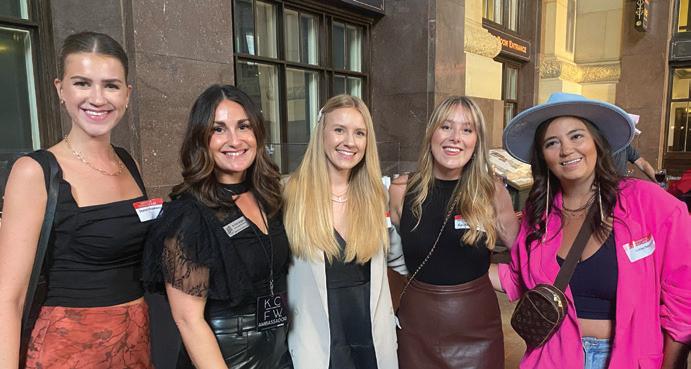
Stephanie Whitmore, ’18, Erica Spurgeon, ’09, ’17, Nikayla Rourke, ’18, Tiffany Anderson, and Ashley Donnell, ’11.
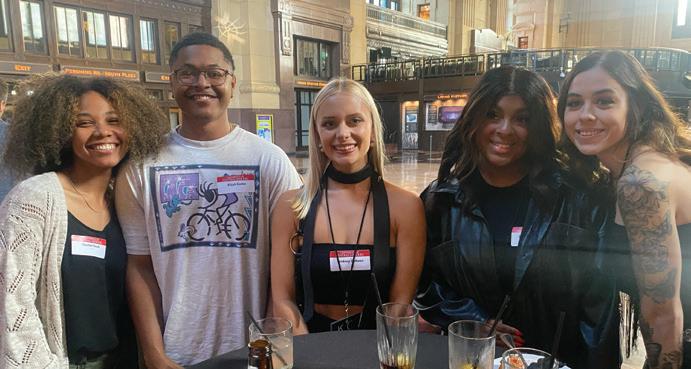
Rachel Seals, ’22, Elijah Carter, Lindsey Dobson, Nikaylah Gadson, ’24, and Aubrey Summers, ’24.
MuleNation in Phoenix, Arizona, Jan. 12, 2024
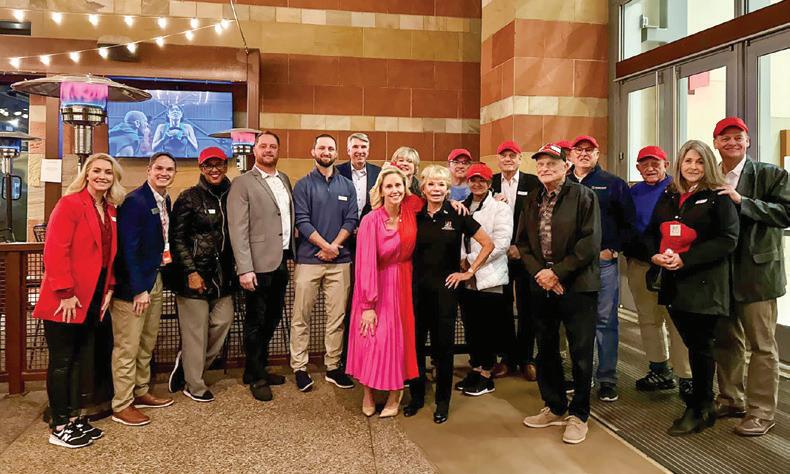
MuleNation in Washington, D.C., March 13, 2023
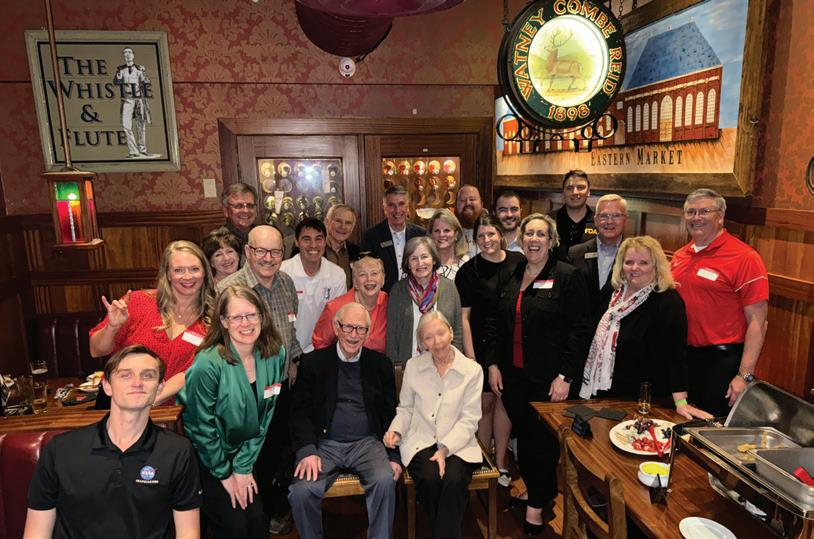
34 Spring 2024 | ucmfoundation.org/magazine
NEWS
MuleNation in Brea, California, Nov. 10, 2023
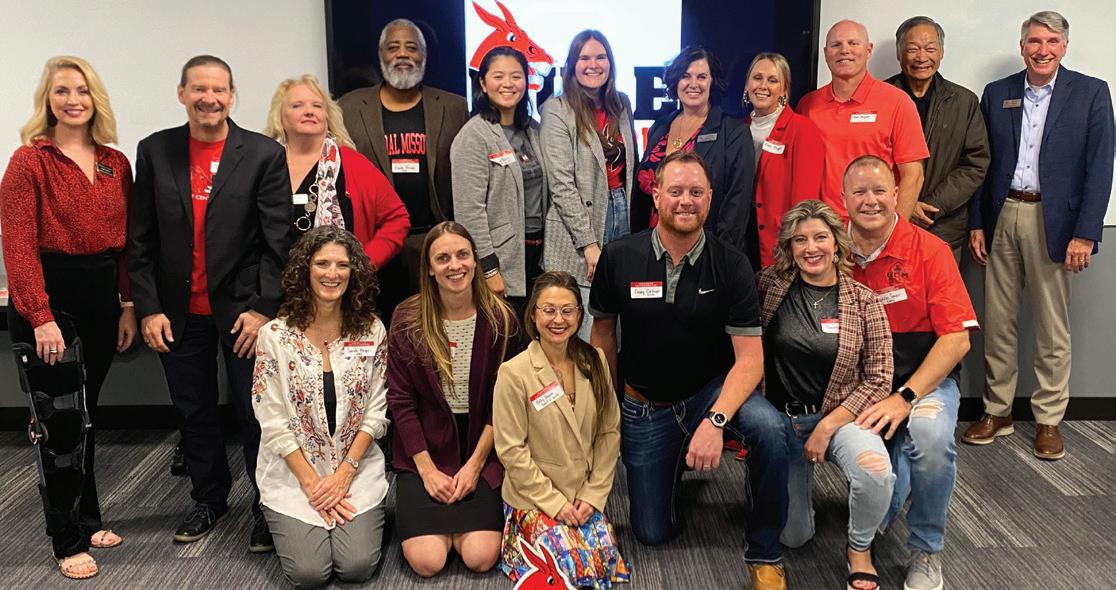
UCM Spirit Squad Reunion at UCM, March 2, 2024
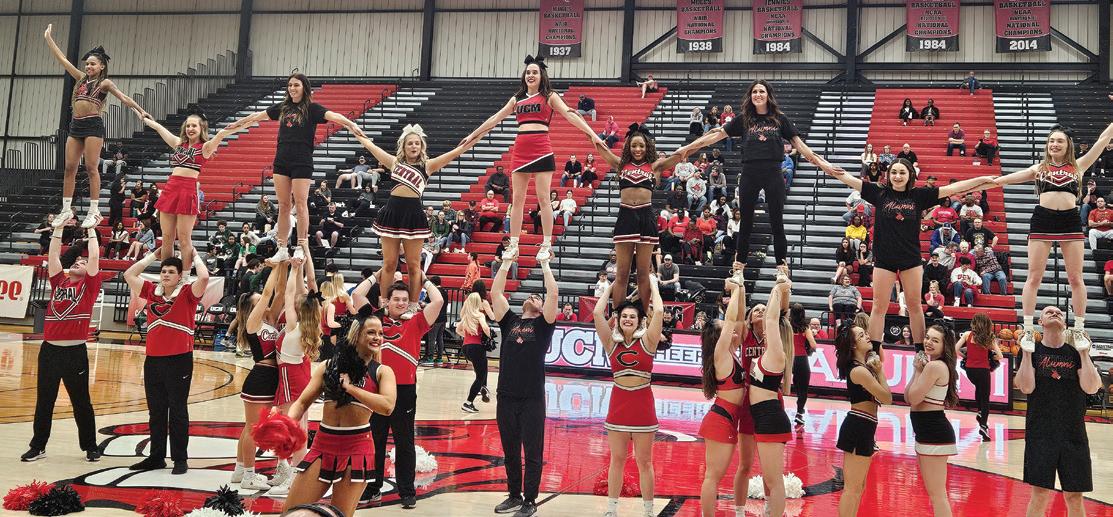
MuleNation in St. Pete Beach, Florida, Feb. 6, 2024

Tiffany Cochran, ’05, ’23, Craig Hibdon, Sherri Hibdon, ’80, ’01, Dene Williamson, ’00, Courtney Goddard, Dennis Evans, ’73, Naomi Williamson, ’71, ’81, ’92, Katie Evans, Kenneth Keth, ’64, Carol Keth, ’63, and Casey Cochran, ’05.
MuleNation in Fort Myers, Florida, Feb. 8, 2024
Mules Football Reunion Celebrating 1983 MIAA Champs at UCM, Sept. 16, 2023
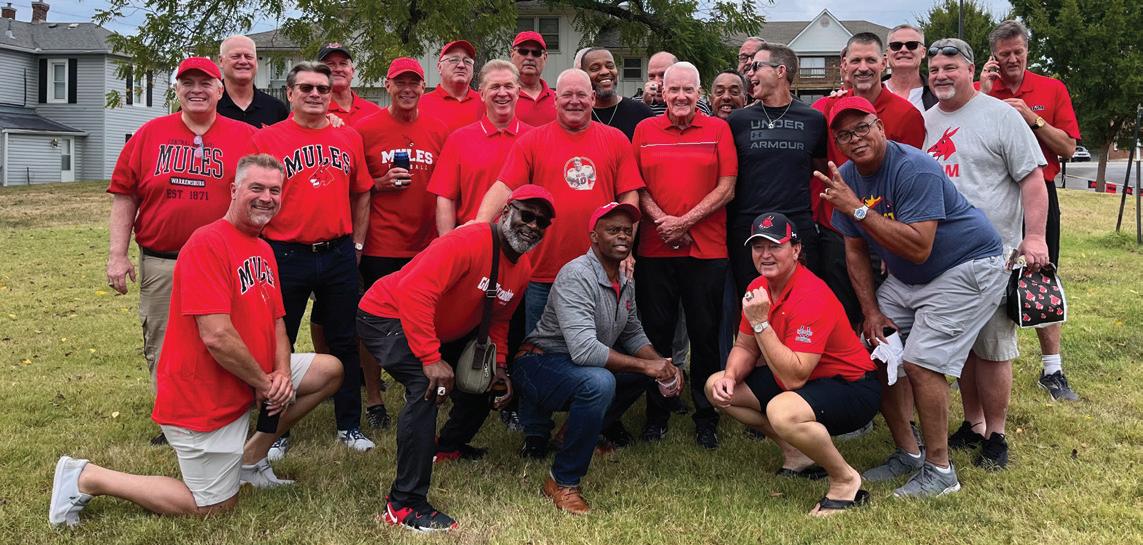
Mules Basketball Reunion Celebrating ’84 and ’14 NCAA-II Champs at UCM, Feb. 16-17, 2024
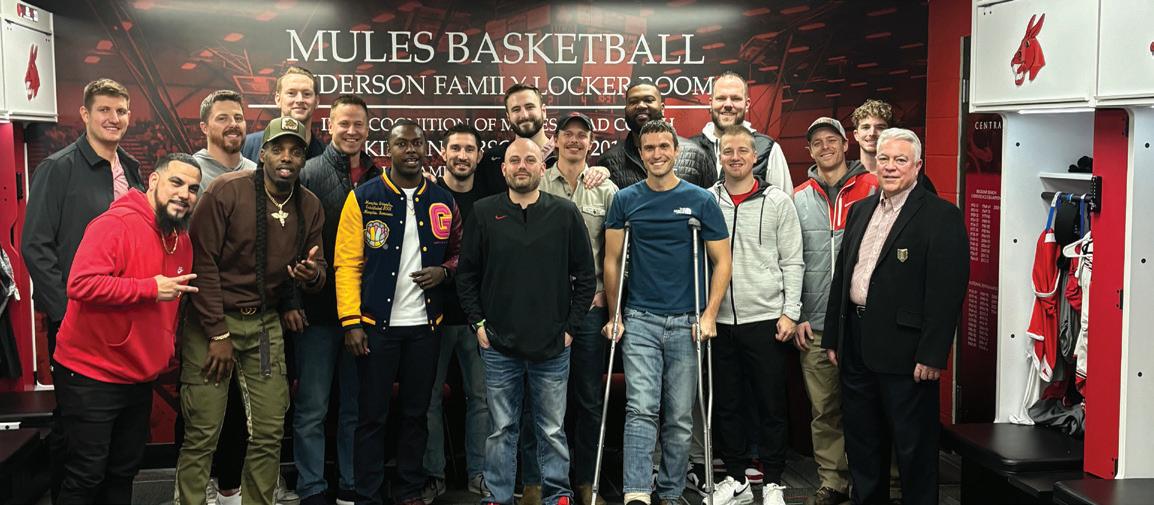
MuleNation at the Houston Winter Invitational, Feb. 3, 2024
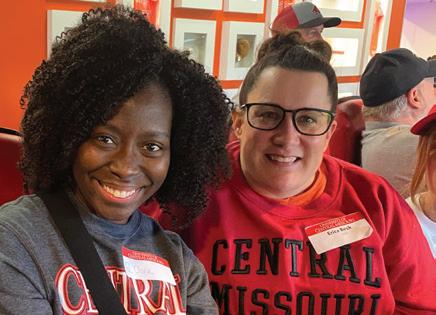
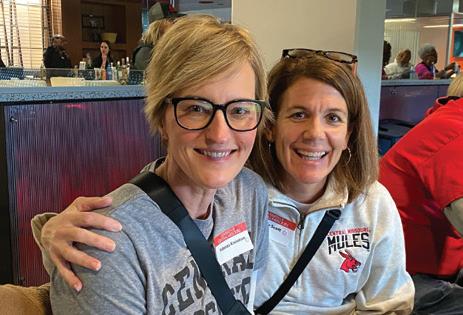

University of Central Missouri Magazine 35
Q. Olivia Rivers, ’08, and Erica Beck, ’07.
Rebecca Kreisman and Jeanie Scott.
NEWS
Alumni News
David See, ’69, ’72, ’74, was recognized as a Clinton (Missouri) Veterans of Foreign Wars Teacher of the Year.
Steve Hancock, ’72, received the Head, Heart and Hands award from College of the Ozarks in Point Lookout, Missouri.
Scott Burgess, ’76, was recognized with the Above and Beyond Servant Leader Board Member award from the Alliance for Life Missouri.
Steven Dust, ’76, was named executive director of the Lake of the Ozarks Council of Local Governments.
Susan Hinck, ’77, was named president of the International Home Care Nurses Organization.
Charles E. Lane, ’79, is the new vice president and chief operating officer at the California Institute of Technology (Caltech).
Christopher Hicks, ’85, became a member of the Health and Hospital Advisory Board for St. Louis County.
Stephen Belt, ’88, has been selected as Saint Louis University’s 2023 Nancy McNeir Ring Award recipient.
CLASS NOTES
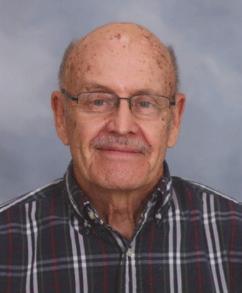
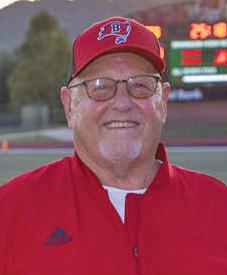
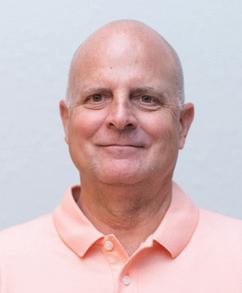
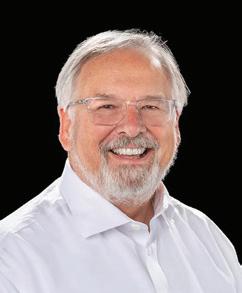
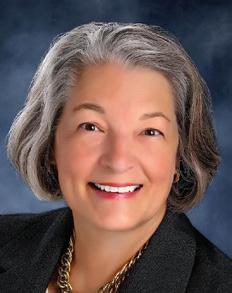
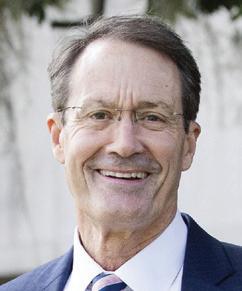
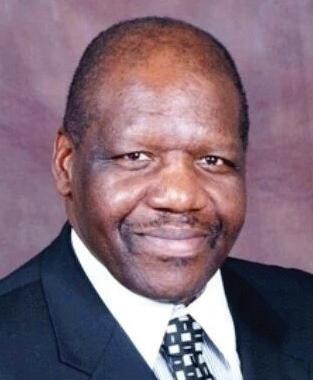
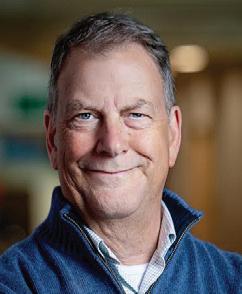
Michelle Froese, ’88, has been named the University of Missouri–Columbia’s new interim dean of students.
Kevin Cullum, ’89, ’92, president and CEO of Nissan Motor Acceptance Co. and INFINITI Financial Services, was named Black Book’s 2023 Auto Finance Executive of the Year.
Brent Ross, ’89, ’90, was promoted to vice president of power production services at Associated Electric Cooperative Inc. in Springfield, Missouri.
Jamie Hulet, ’91, was appointed group sales and VIP manager for Visit Horse Country in Lexington, Kentucky.
Jason Olson, ’92, celebrated the 20th anniversary of his company, Duplication Media, in Urbandale, Iowa.
Jeff Haldiman, ’93, took a job as research and content writer for the Missouri Chamber of Commerce and Industry.
George Harding IV, ’94, is the new animal care chief for San Bernardino County in California.
Todd Proffitt, ’94, professor and senior assistant dean for the College of Liberal Arts and Sciences at SUNYFredonia, received UCM’s Dr. Ed See Outstanding Theatre Alumnus Award.
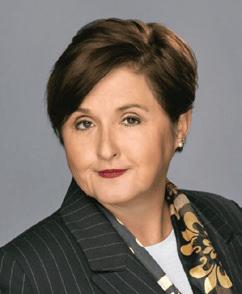
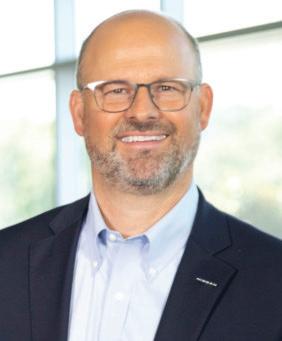
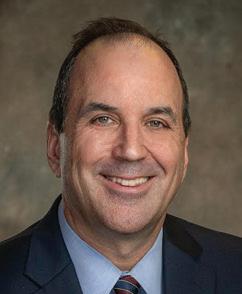
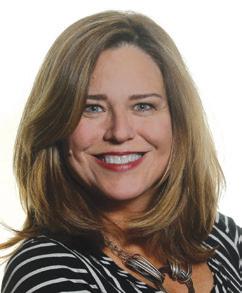

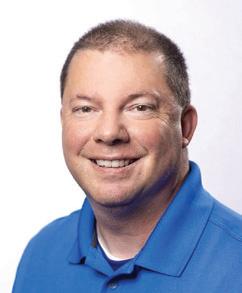
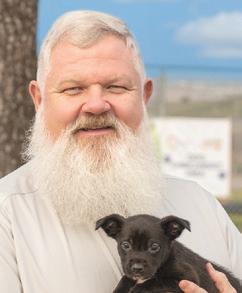
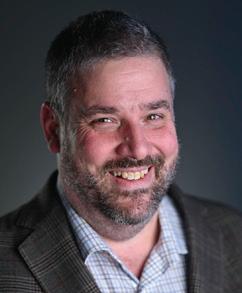
Rick Carpenter, ’95, was named executive director of operations for Springfield (Missouri) Public Schools.
Lloyd Wells, ’96, was selected as the new city administrator for Houston, Missouri.
Melissa Cooper, ’97, ’06, became the first woman to be named director of aviation for Kansas City, Missouri.
Charles Ware, ’98, ’09, was appointed Area 1 trustee on the El Dorado County Board of Education in California.
Dawn Bell, ’99, has been named community development director for the city of Rolla, Missouri.
Jamie Lucero, ’99, was named project director for the Alliance to Advance Climate-Smart Agriculture.
Leslie (Barton) Meyer, ’99, was appointed a vice chair of the Agriculture and Rural Affairs Steering Committees of the Missouri and National Associations of Counties.
Jeremy Van Ommeren, ’99, has been promoted to divisional vice president of Westlake Ace Hardware, overseeing 108 store locations.
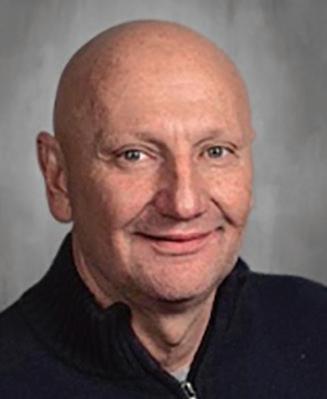
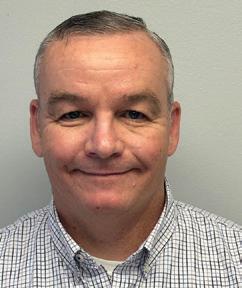
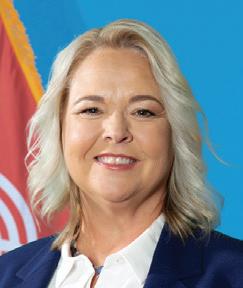
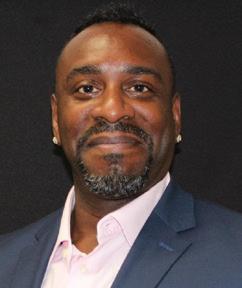
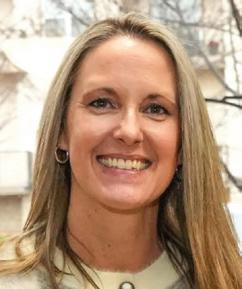
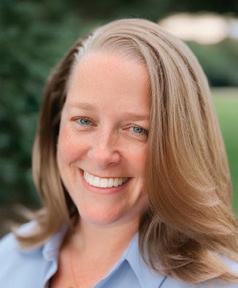
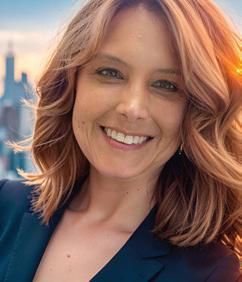
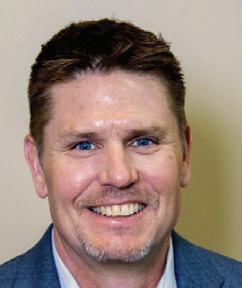
36 Spring 2024 | ucmfoundation.org/magazine
Mike Mabe, ’00, will take over in July 2024 as the Union (Missouri) R-XI superintendent.
Chadwin Sandifer, ’02, was recognized as an Education Hero on the New Jersey NJBIZ journal’s 2023 Health Care Heroes list.
Daniel Holt, ’03, was named vice president of finance and administration at Missouri Western State University in St. Joseph.
Haley O’Neill, ’03, has been hired as an energy industry attorney for the Murchison Law Firm in Dallas, Texas.
Carrie Livengood, ’04, has been hired as principal of West Nodaway R-I High School in Burlington Junction, Missouri.
Shanna Goodman, ’06, is the new executive director of the Pottawatomie County (Kansas) Economic Development Corporation.
Angela Danley, ’09, was named interim chair and director of Clinical and Field-Based Experiences at Avila University in Kansas City, Missouri.
Stacee Arnold, ’10, was awarded a grant during the Palo Verde Fiesta Bowl Charities Wishes for Teachers Draft Day to buy materials for her first grade class at Imagine Desert West Elementary in Phoenix.
Lori Pigue, ’11, earned a doctorate degree in Astronomy and Planetary Science from Northern Arizona University.
CLASS NOTES
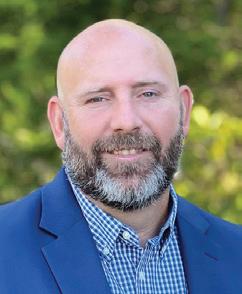
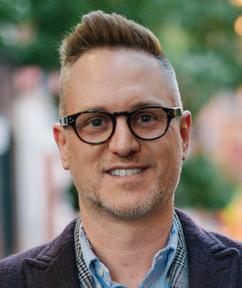
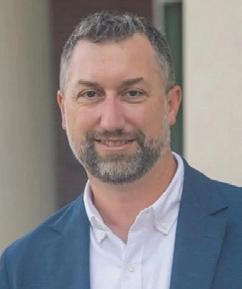
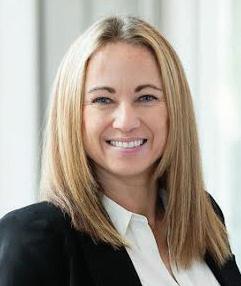
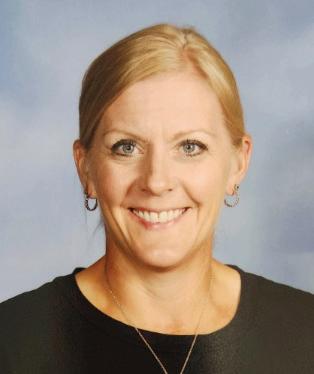
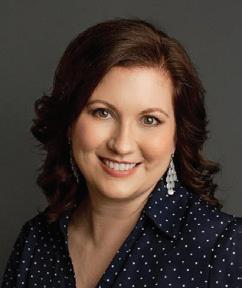
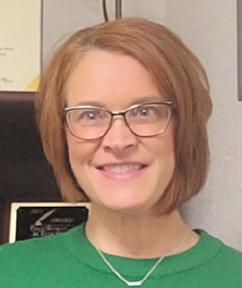
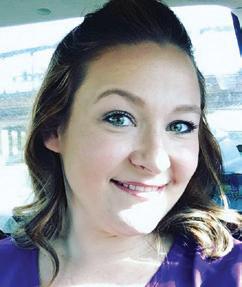
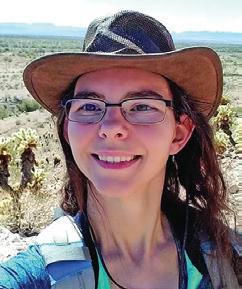
Amanda Bylczynski, ’12, was hired as associate vice president of Academic Affairs at Augusta Technical College in Georgia.
Brandi Miller, ’12, was hired as the promotions coordinator for KMOS-TV, the University of Central Missouri’s PBS station.
Bethanie McDowell, ’16, was named vice president of patient care/CNO at Salina Regional Health Center in Kansas.
BabyCorner
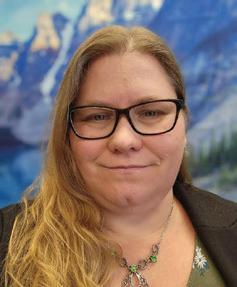
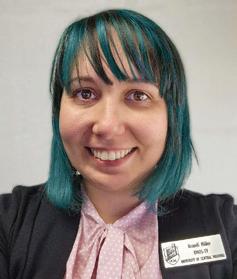
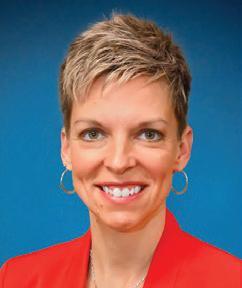
Sanna Muñoz, ’16, was appointed deputy director of the Rehabilitation Services and Programs Division of the Hawaii Department of Corrections and Rehabilitation.
Ashley Lewis, ’20, won the University of MissouriKansas City Patient Counseling Competition and represented the university at the 2024 APhA national conference.

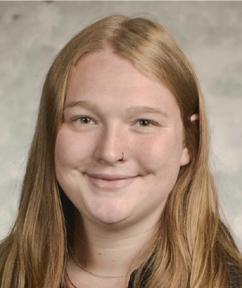
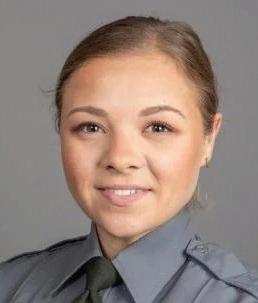
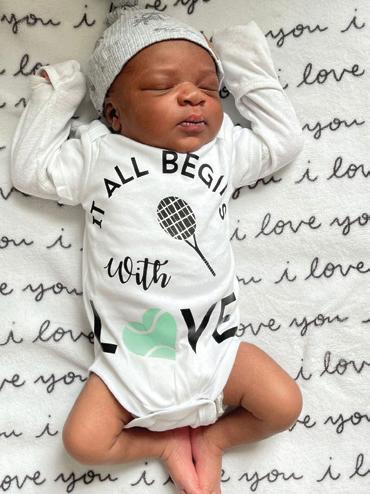
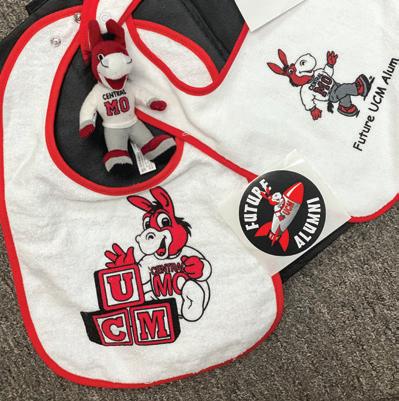
Adesubomi Atika, ’05, and Gregory Isabwa welcomed Jayden Atika-Isabwa in February 2024. Are you the proud parent or grandparent of a new arrival? Get a free UCM bib when you share your news and a baby picture at ucmfoundation.org/baby-news.
Sierra Page, ’21, was hired as the new conservation agent for Cass County by the Missouri Department of Conservation. While UCM Magazine comes out twice a year, the alumni community’s conversation goes on year-round. Visit @ucmalumnifoundation on Facebook and @UCM_Alum on X and Instagram to stay connected! Submit news of your promotion, new job or other achievement at ucmfoundation.org/class-notes.
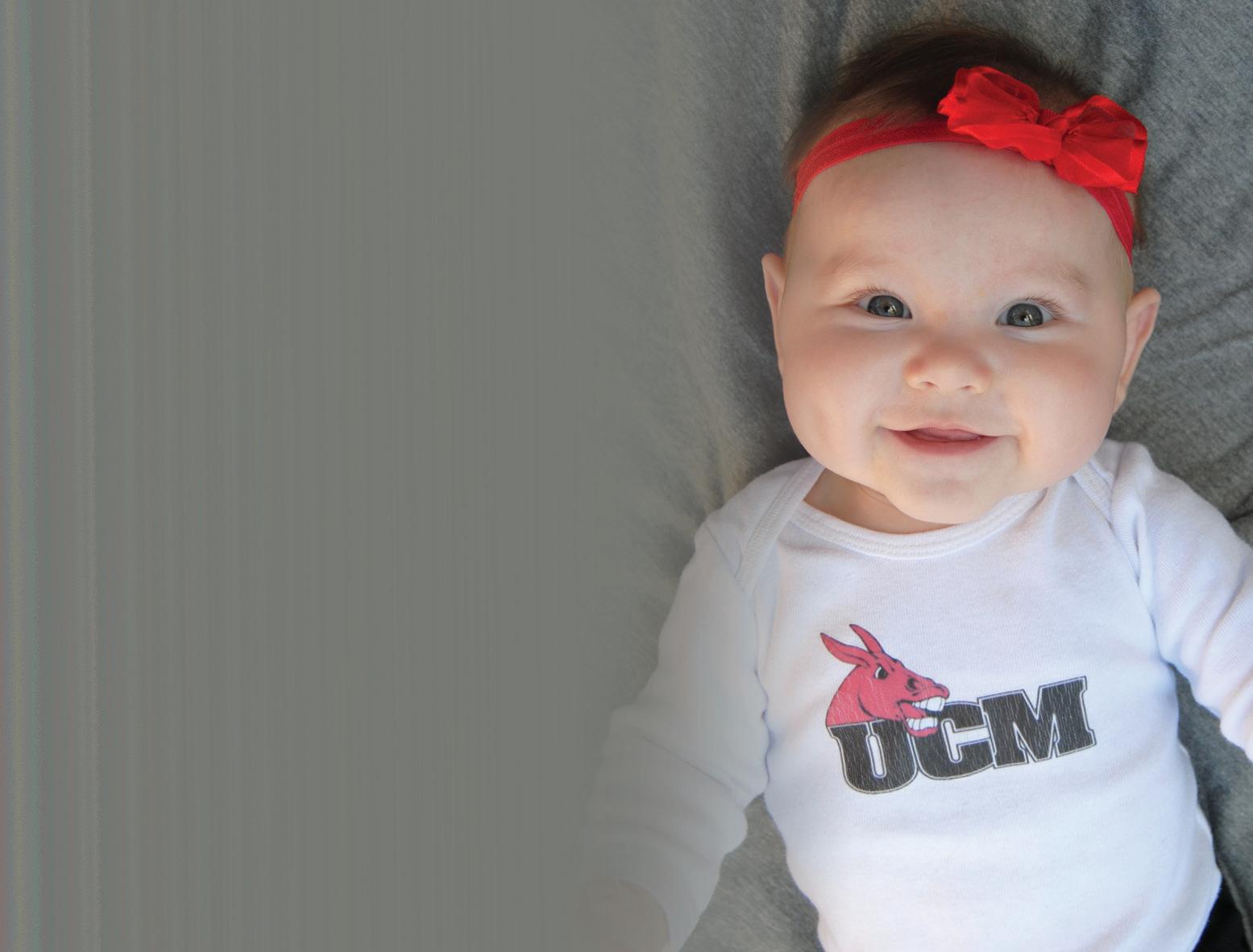
University of Central Missouri Magazine 37
Breaking Barriers
Alumni Couple Creates Scholarship to Support Students From KC’s Operation Breakthrough
You may know the story of Hallmark company founder Joyce Clyde Hall, who arrived at Kansas City’s Union Station carrying nothing but two shoeboxes full of picture postcards he hoped to sell. After a 39-year career at Hallmark, Homer Kay knows this story well — and has one of his own.
“My father was one who kept the books by putting the receipts in one shoebox and the disbursements in another, and that’s how he knew if he was making any money,” he says. “So I started doing the books for him.”
Becky Kay was also drawn to bookkeeping in high school, and the couple met at the University of Central Missouri in an accounting class taught by the late Professor Emeritus Kenneth Stone. They both worked in the Humphreys Building — Becky for the Reserve Officers’ Training Corps (ROTC) and Homer for the testing center — and walked across the quad together.
Becky grew up in Russellville, Missouri, and Homer is from Knob Noster. Both were
the first in their families to graduate from college, earning their Accounting degrees from the University of Central Missouri (then Central Missouri State University) in 1978. After graduation, Becky took a job with a small accounting firm in Kansas City and later became chief financial officer for Water District No. 1 of Johnson County, Kansas. Homer moved to Jefferson City to work in the Missouri State Auditor’s Office. When the two started dating, Homer decided to relocate to Kansas City and got hired at Hallmark in 1980, the same year he and Becky got married.
In 1994, Homer was promoted to a CFO post with the U.K. branch of Hallmark, and they moved with their young daughter and infant son to Bath, England. There they met and became friends with fellow U.S. citizen Mary Esselman, celebrating “American holidays” with her family.
Although their British neighbors did not observe all the same holidays, “Hallmark moments” were not lost on them. Homer’s team did a focus group when researching the market for ornaments in London, and participants were asked to bring something meaningful to them. He says 90% of attendees brought greeting cards they had saved.

Becky can relate to this sentiment, as greeting cards are still a Kay family tradition. Her son, daughter and five grandchildren cherish each card — and always look on the back for the Hallmark logo.
“When I get a handwritten note from someone, it’s much appreciated,” Becky says. “And we have every singing snowman

the world has ever seen. And a tree full of hundreds of Hallmark ornaments we’ve collected.”
When Homer retired as CEO of Hallmark International, responsible for business in more than 100 countries, he and Esselman were neighbors again in Kansas City. Esselman is now president and CEO of Operation Breakthrough, a not-for-profit organization providing quality child care, advocacy, STEM
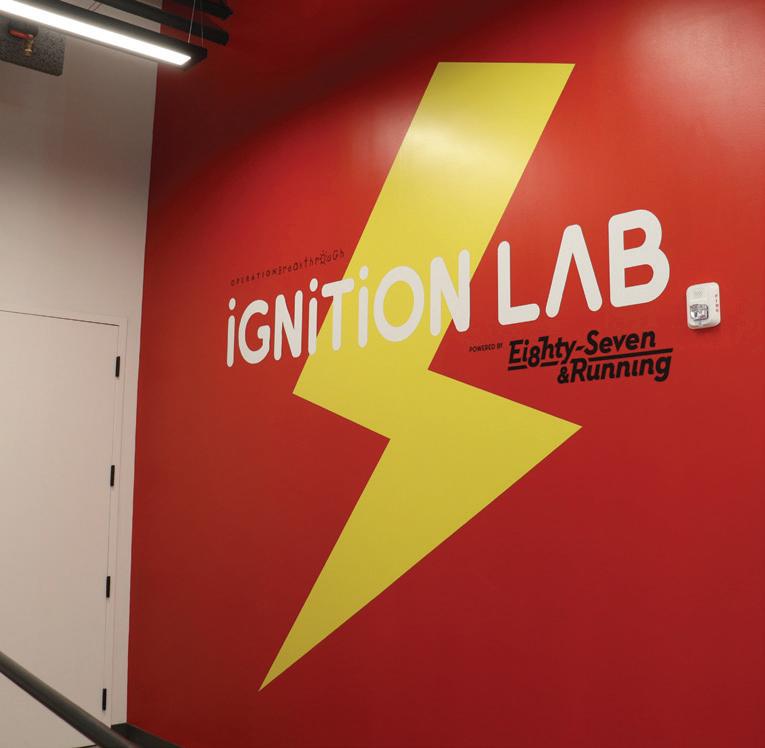
38 Spring 2024 | ucmfoundation.org/magazine PLANNED GIVING
Becky and Homer Kay sign the scholarship endowment with Courtney Goddard, executive director of the UCM Alumni Foundation.
PLANNED GIVING

education, emergency aid and health and wellness outreach to families living in poverty in the inner city.
In 2021, with support from Kansas City Chiefs tight end Travis Kelce’s Eighty-Seven and Running Foundation, Operation Breakthrough was able to renovate an old muffler shop located about a mile from Hallmark’s headquarters at the Crown Center. The facility now serves as the Ignition Lab, a learning environment and makerspace for area youth who have aged out of Operation Breakthrough’s after-school Science, Technology, Engineering and Mathematics (STEM) programs for prekindergarten through middle school students.
De’Vante James (D.J.) McNeal was one of more than 700 underprivileged students annually who participate in
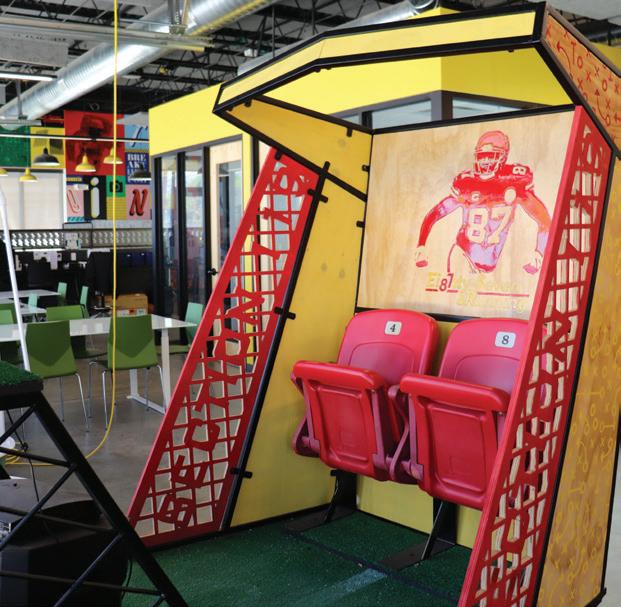
these programs, developing skills in coding, robotics, engineering, agriculture, culinary arts, digital media, construction and more. He is also the first recipient of the Homer and Becky Kay “I Matter” Scholarship for Ignition Lab participants enrolling at UCM.
“A lot of the students at Operation Breakthrough never dreamt of getting to go to college,” Homer says. “We think, ultimately, education can be the big difference maker.”
McNeal, who attended the Ewing Marion Kauffman School from grade 6 to 12, just finished his freshman year as a Music Technology major at UCM. His drive and enthusiasm caught the attention of his teachers in the Ignition Lab’s digital media after-school program.
“Before we had a full-time after-school program, D.J. was helping younger students learn music technology while also self-learning his own skills in music production,” Ignition Lab teacher Ian O’Neill says. “D.J.’s first project was to finish building an electric guitar in the electronics program and write a performance piece with it. Over two years in the Ignition Lab, D.J. went from little music production knowledge to being able to write his own pieces for his Music Tech audition.”
The Kays heard McNeal play at a fundraiser for Operation Breakthrough in June 2023. After establishing the Homer and Becky Kay “I Matter” Scholarship, they were thrilled to learn that he would be the first recipient.
The scholarship will be awarded each year to a student who participated in Operation Breakthrough’s Ignition Lab and is seeking a degree from UCM. It is just one of many ways the Kays have given back to their alma mater. As president of the UCM Alumni Foundation Board of Directors, Homer understands the importance of making a planned gift.
“We found each other at UCM, we’ve lived a pretty charmed life together, and we hope that our small part can do that for other people going forward,” Homer says. “This is something that can last forever, way beyond our lifetime.”
Have you considered a Charitable IRA Rollover? There are many ways to leave your legacy!
Individuals age 70½ or over can give up to $105,000 from their IRA to support the University of Central Missouri without having to pay income tax on their gift. Also known as a qualified charitable distribution, this method of giving can reduce your annual income level, which can lower your Medicare premiums and decrease the amount of Social Security subject to taxation. Your gift will be put to work immediately, allowing you to see the difference you are making for UCM students.
Ready to talk about a Charitable IRA Rollover or other ways to make a planned gift? Contact the UCM Alumni Foundation at 660-543-8000, giving@ucmo.edu or ucmo.giftlegacy.com.
UCM does not provide legal, tax or financial advice. It is strongly recommended that you consult professional advisors on all legal, tax or financial matters, including planned gift considerations.
University of Central Missouri Magazine 39
De’Vante James (D.J.) McNeal is the first recipient of the Homer and Becky Kay “I Matter” Scholarship.
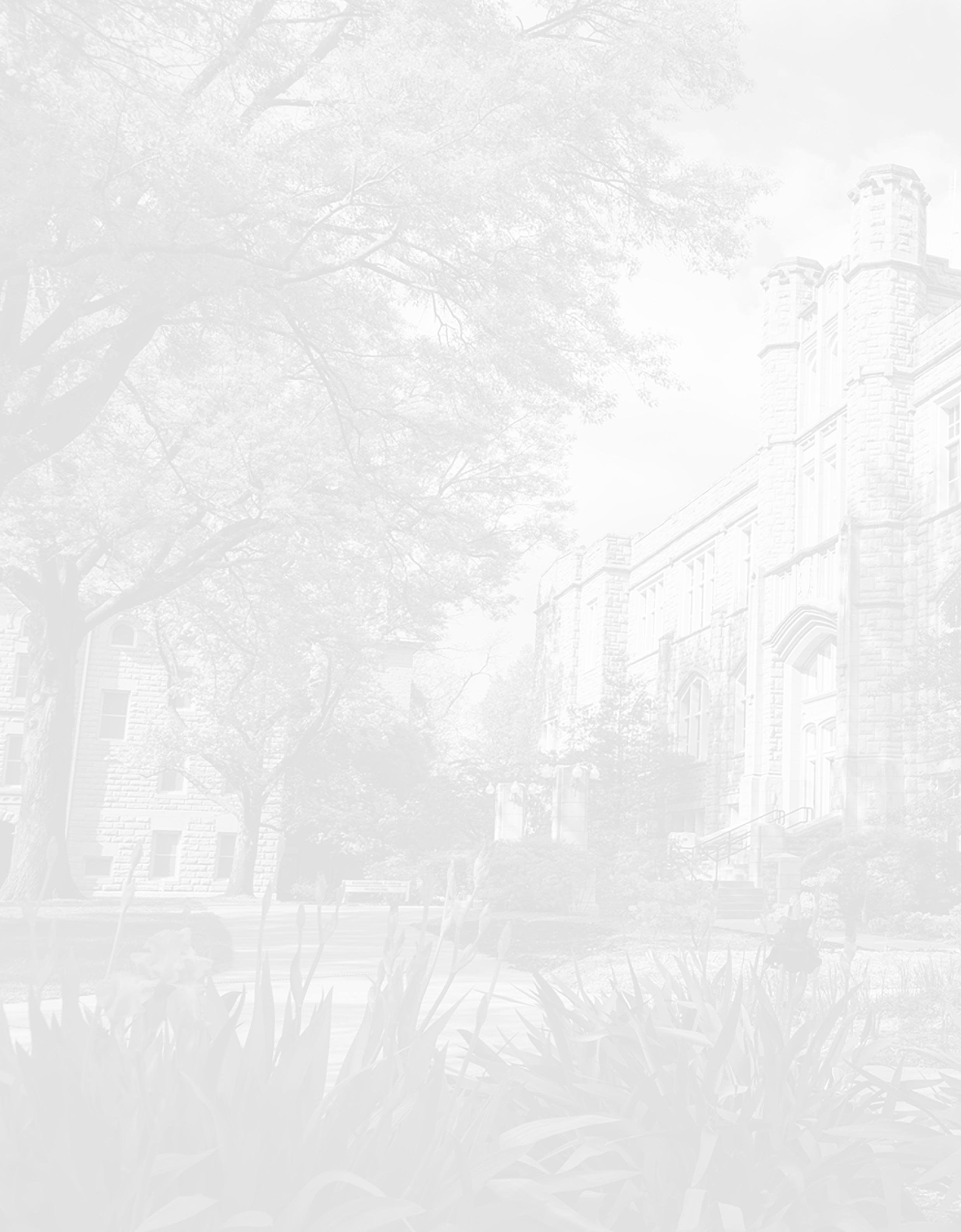
IN MEMORIAM
The UCM Alumni Foundation holds dear the memory of emeriti, alumni, faculty and friends who have passed away. Every person listed here was an integral part of the university family and will be missed.
Eugene Aist
Eugene “Gene” Hiatt Aist, age 85, was born June 10, 1938, in Cheltenham, Maryland. As a youth, Aist moved with his family from Maryland to Indiana, then settled in Arkansas, where he became the first member of his family to attend college. He completed an associate degree from Arkansas Tech University; bachelor’s and master’s degrees from the University of Arkansas; and a doctorate from Arizona State University. In 1971, Aist joined the University of Central Missouri as an assistant professor of Instructional Technology and coordinator of Instructional Production Services, retiring in 1985. In addition to his full-time role in education, he served on the university’s faculty senate and executive committee, and had an impact on his profession at the state level as an editor of the Missouri Journal of Instruction.
Bonnie Sue Braun
Bonnie Sue (Fitterling) Braun, age 76, was born Sept. 27, 1947, in Warrensburg. She earned her bachelor’s and master’s degrees in Home Economics Education from the University of Central Missouri in 1968 and 1971 and served UCM as an instructor of Home Economics before earning her doctorate in Vocational Education from the University of Missouri–Columbia. During college, she was inducted into Kappa Omicron Nu and named president of the American Home Economics Association, which would launch her into leadership on a national level as president of the American Association of Family Consumer Sciences. Braun joined the faculty at Oklahoma State University and was instrumental in developing the 4-H Extension there as well as later in Virginia and Maryland. Awarded a W.K. Kellogg Leadership Fellowship, she traveled the world for three years in search of lessons that could be applied for the betterment of families and communities in the U.S. Under the Reagan administration, she served as interim extension deputy administrator for home economics and human nutrition in the U.S. Department of Agriculture, collaborating on the development of the USDA food pyramid and healthy school lunch nutrition policies. In 1991, Braun was honored with UCM’s Distinguished Alumni Award, and a few years later she became the first associate dean for outreach in the College of Human Ecology at the University of Minnesota. Her career culminated in her appointment as the first endowed chair and founding director of the Herschel S. Horowitz Center for Health Literacy at the University of Maryland.
Larry Alan Cammack
Larry Alan Cammack, age 84, was born Aug. 7, 1939, in Marion, Indiana. He earned his Bachelor of Arts and Bachelor of Science degrees from Phillips University in Enid, Oklahoma, and
master’s and doctorate degrees from Kansas State University. Cammack joined the University of Central Missouri’s Department of Mathematics and Computer Science in 1972, becoming a full professor in 1993. He was a sponsor of Kappa Mu Epsilon on the UCM campus and also a member of the American Mathematical Society of America, the Sigma Chi Scientific Research Society, and the Phi Kappa Phi Honor Society. In 1979, Cammack served as a visiting professor at Cornell University in Ithaca, New York, on a one-year National Science Foundation-funded study leave sabbatical. He retired from UCM in 2006 after 32 years of service.
Carrie Lee Dunson
Carrie Lee Dunson, age 73, was born April 19, 1946, in Kansas City, Missouri. She earned an Associate of Art degree from Metropolitan Community College in Penn Valley; a Bachelor of Arts in Psychology from Lincoln University in Jefferson City; Master of Science and Education Specialist degrees in Criminal Justice in 1975 and 1976 from the University of Central Missouri; and a Doctor of Philosophy from the University of Missouri–Kansas City. She also held certifications as a nursing assistant and in health care administration. Dunson served her alma mater as a professor of Criminal Justice and an advisor for a number of student organizations, including Lambda Alpha Epsilon, from 1974 to 2005. She volunteered with a number of national and local community, religious and civic agencies.
Linnette Rose Garber
Linnette Rose (McClure) Garber, age 70, was born March 8, 1953, in Boonville, Missouri. She joined Alpha Omicron Pi and was a member of the Marching Mules at the University of Central Missouri, graduating in 1975 with a bachelor’s degree in Textiles and Clothing. After graduation she married Randy Garber, ’75, and moved to St. Louis, where she worked as a retail buyer. They then moved to Montgomery County, Maryland, where she earned her Juris Doctor at American University’s Washington College of Law. A member of the Maryland and District of Columbia Bars, Garber became a partner at the Bethesda law firm of Kaslow, Chernikoff & Garber. In 2001, they moved to Orange County, California, where she volunteered extensively, particularly with the Meals on Wheels program. Continuing her commitment to her alma mater, she served on the UCM Alumni Foundation Board of Directors.
Kenneth A. Gordon
Kenneth A. Gordon, age 76, was born Aug. 4, 1947, in Cleveland, Ohio. A graduate of Kent State University, the University of Michigan, the Ohio State University and the University of California–Santa Barbara, he joined the faculty at the University of Central Missouri in 1981. He
became a full professor in 1993, the same year he was named chair of the Department of Modern Languages. Ken was a world traveler, fluent and literate in several languages, and a scholar of European literature, culture and history. During his time at the university, Gordon traveled to Canada, Mexico, Europe, South America and Cuba to conduct research, for personal study, and to direct study abroad programs. He also served Winthrop University in Rock Hill, South Carolina, and during his lifetime participated in humanitarian trips to Cuba.
Justyn Lair Graham
Justyn Lair Graham, age 96, was born Oct. 7, 1927, in Hutchinson, Kansas. Upon turning 18, Graham joined the Navy Reserves and served in California. He then earned bachelor’s degrees in both elementary and secondary education from Northwest Missouri State University. During his first year teaching at an elementary school in Atchison, Kansas, he was recalled to active duty to serve in Japan and Korea. Graham went on to pursue a master’s from the University of Colorado–Boulder and a doctorate from the University of Northern Colorado in Greeley. After teaching in Independence, Missouri, and serving as an elementary school principal in Savannah and University City, Missouri, Graham joined the faculty at the University of Central Missouri in 1967. His 29 years at the university included serving as director of the University High School, followed by full-time teaching and supervising student teachers in the Department of Curriculum and Instruction. He became coordinator of field experiences for the department in 1989 and served in that capacity until his retirement in 1996.
Cliff Harris
Cliff Harris, age 63, was born Jan. 27, 1960, in Warrensburg. He became a heavy equipment operator before embarking on a career in the automobile industry. He got his start at Summit Ford before moving to Independence Lincoln/ Mercury and Odessa Chrysler, eventually purchasing Warrensburg Chrysler in 1997. He purchased Warrensburg Ford in 2005, expanded into Marshall in 2006, and to California, Missouri, in 2020. In 2023, his dealership in Warrensburg was recognized by the Chamber of Commerce as its “Business of the Year.” His successes allowed Harris to be involved in his community in many ways, including through Big Brothers Big Sisters, Project Graduation, the Warrensburg School Foundation, Wounded Warriors, Band Car, UCM Athletics, Main Street, Central Missouri Speedway, Gage Gymnastics, the Johnson County Rodeo, the YES program, the Johnson County Cancer Foundation, the American Heart Association Heart Walk and many others. He was also a major donor to the University of Central Missouri.
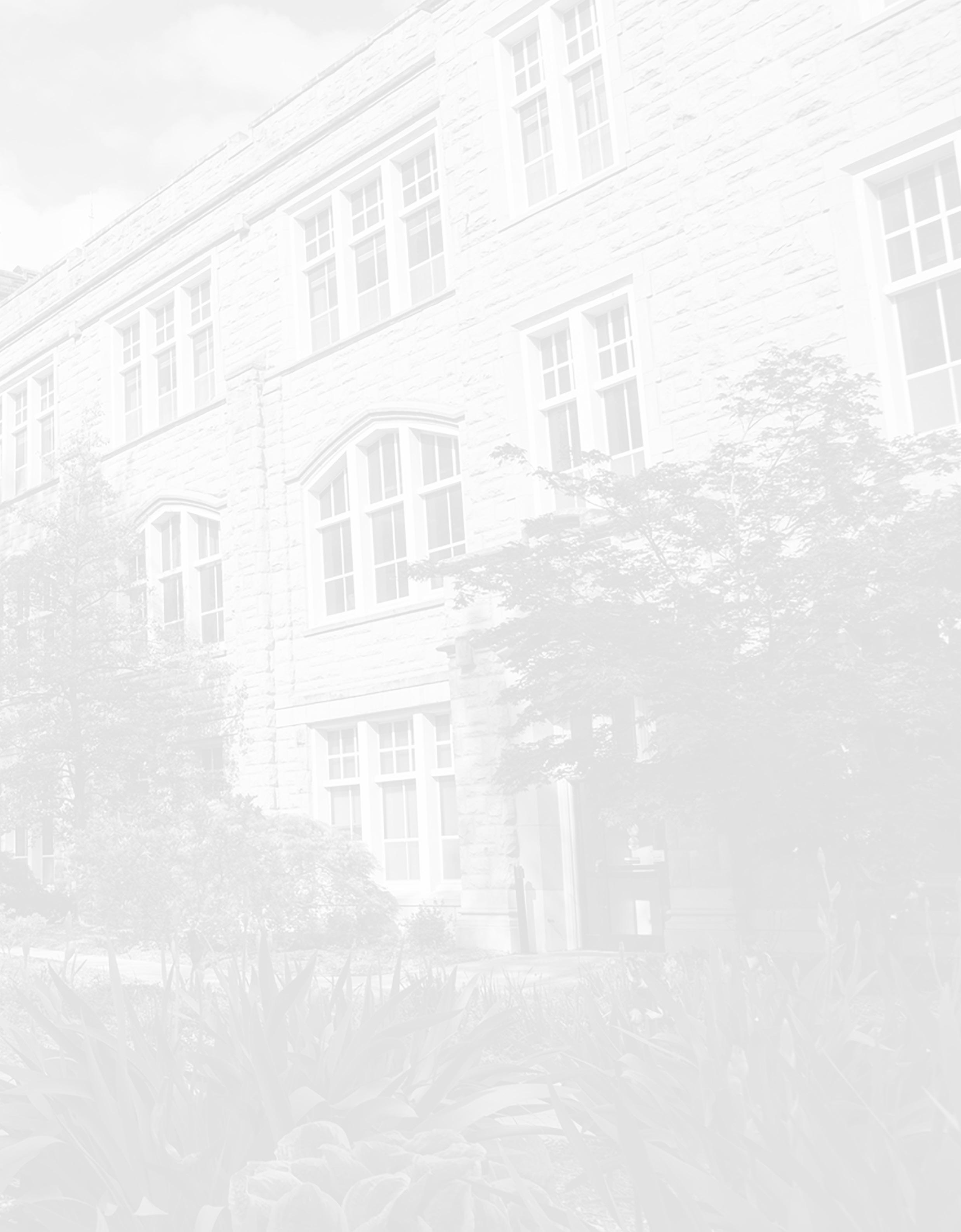
Ed Harris
Edward “Ed” Harris, age 95, was born Jan. 21, 1928, in Niles, Ohio. After high school he joined the Navy, serving active duty in 1945-46 and as a reservist until his honorable discharge in 1952. He attended the University of Miami, Kent State University, Emporia State University and Colorado State University, earning a total of one bachelor’s degree, three master’s degrees and a Doctor of Education. Harris joined the University of Central Missouri in 1971 as an assistant professor of Speech Pathology and Audiology after previous positions that included serving as director of the Speech and Hearing Clinic at Colorado State University; teaching at colleges in San Antonio, Texas, and San Jose, California; and providing speech and hearing therapy to the Salem (Ohio) Public School District. After being promoted to associate professor, he became assistant to the vice president for academic affairs and was assigned to Educational Media Services. His appointment as director of Ward Edwards Library followed, a position he held while continuing to teach. He later became coordinator of Community Services at the university, developing continuing education classes, the Elderhostel Program, and administrating offices at Whiteman Air Force Base and in St. Louis. He briefly returned to full-time teaching in 1988 and retired in 1990.
Walter Ray Hicklin
Walter “Walt” Ray Hicklin, age 84, was born July 19, 1939, in Gilliam, Missouri. He graduated from Missouri Valley College, then went on to earn a Master of Science in Education from the University of Central Missouri in 1964. After teaching mathematics and serving as the athletic director, assistant principal and head football coach at Lee’s Summit High School, Hicklin joined UCM as Mules Football’s head coach in 1976 and earned an Education Specialist degree that same year. He continued his passion for teaching mathematics within the Department of Academic Enrichment before becoming assistant, then interim vice president of student affairs. Hicklin mentored hundreds of students and was instrumental in the design and implementation of a program that led to the Noel Levitz National Award for student retention. He was honored as the first recipient of the J.P. Mees Award for Outstanding Professional Staff in 2003 and retired in 2006 after 30 years of service. After retiring, Hicklin was appointed to the UCM Board of Governors, serving two terms as president during a span of 12 years. Among his many accolades, Hicklin received the Student Government Association’s James C. Kirkpatrick Excellence in Governance Award, and SGA subsequently honored him through the establishment of the Walter Hicklin Excellence in Service Award, first presented in 2022.
John Milton Inglish
John Milton Inglish, 76, was born Feb. 26, 1947, in California, Missouri. He grew up in Moniteau County and earned a Bachelor of Arts from the University of Central Missouri in 1969. An honor graduate of the U.S. Air Force Photography School at Lowry Air Force Base in Denver, he served in Vietnam from 1969 to 1973, and was in the inactive reserves until 1975, attaining the rank of staff sergeant. After basic training at Lackland AFB in San Antonio,
IN MEMORIAM
Texas, he served as a portrait and assignment photographer at Offutt AFB in Omaha, Nebraska, and later produced precision aerial reconnaissance photographs for use by the Pentagon and the White House. Inglish returned to Warrensburg to pursue graduate studies while serving as the university’s news bureau manager and publications manager. He earned his Master of Arts in 1975 and was promoted to assistant director of public relations that year. In 1986 he was promoted to director of public relations, and in 1997 he became the institution’s first administrator to earn the title of university director. Inglish retired from the university in 2000 as university director emeritus of public relations. Upon retirement, Inglish established the Foster/Inglish Fund within the UCM Alumni Foundation to annually recognize a staff member who has demonstrated excellence in public relations.
Michael Dale Jeffries
Michael “Mike” Dale Jeffries, age 68, was born Oct. 24, 1954, in Camdenton, Missouri. He earned a Bachelor of Arts in Psychology, Sociology and Music from the University of Central Missouri in 1980. His career spanned more than 30 years in education, and he served the university from 2002 to 2016. Positions he held at the university include director of Central Net, where he managed the Blackboard and Macromedia Breeze programs on campus, maintained Interactive Television and Video Tele-Conferencing facilities and collaborated on opportunities to provide distance learning. He also served as an innovation and academic technology specialist, assisting faculty members with the integration of technology to enhance teaching and learning. In addition to his work on campus, Jeffries became a leader in distance learning statewide and helped create the Missouri Distance Learning Association.
Jeanne McDowell
Donna “Jeanne” Jean (Blackwell) McDowell, age 83, was born Oct. 6, 1940, in Kansas City, Missouri. She earned her degree in 1963 from the University of Central Missouri, where she met and married Jim McDowell, ’62. She became a high school math teacher while Jim embarked on a career at Hallmark. When she left teaching to raise her two daughters, she became a “career volunteer,” serving as a leader in the New Theatre Guild, Kansas City Young Matrons, Fireside Committee and American Royal Ambassadors. McDowell also gave her time and support to Kansas City Hospice, Midwest Ear Institute and the UCM Alumni Foundation, among other organizations.
Betty Sue Meyer
Betty Sue (Henks) Meyer, age 84, was born April 17, 1939, in Norborne, Missouri. She learned to play the piano at an early age and went on to become a teacher of music. She graduated from the University of Central Missouri in 1960 with a Bachelor of Science in Music Education and married Ted Meyer, ’62, the following year. Betty Sue and Ted became teachers in Kansas City Public Schools while earning their master’s degrees in
1965 and 1967, respectively. In 1966, they started a business together called Meyer Music, which has locations today in Blue Springs, North Kansas City and Overland Park, Kansas. Betty was an active community leader and received numerous awards and recognitions, including Outstanding Young Woman of Blue Springs from the Jaycees, Citizen of the Year from the Blue Springs Chamber of Commerce and the Distinguished Alumni Award from the UCM Alumni Foundation.
James Terrell O’Malley
James Terrell O’Malley, 92, was born July 12, 1931, in Lexington, Missouri. He attended the University of Central Missouri, where he was a member of Kappa Sigma Kappa and Theta Chi, graduating in 1953 with a Bachelor of Science in Education in Social Studies and in 1958 with a Master of Science in Education in Human Services/Guidance and Counseling. He completed a doctorate at Arizona State University, where he met Eleanor (Fitzgerald) O’Malley, ’70, and started working at UCM that same year. Previously, O’Malley taught social studies at Braymer High School and served at Fort Osage High School as the district’s first counselor, in addition to coordinating the distributive education program. He also served as a school counselor at Dana Junior High School in Arcadia, California. O’Malley retired as a professor of Psychology and Counselor Education in 1996, after nearly 30 years of service to UCM. He was a licensed psychologist, a licensed professional counselor, and a lifetime member of the American Psychological Association.
J.O. Miller Jr.
J.O. Miller Jr., age 94, was born Oct. 27, 1929, in Benton County, Missouri. He earned a Bachelor of Science in Education in 1956 and a Master of Science in Education in 1959 from the University of Central Missouri. He then went on to complete a Doctorate of Education at Oklahoma State University. Miller joined UCM’s faculty in 1962 and retired as an associate professor of education in 1992, after 30 years of service. He was an avid supporter of UCM Athletics and an avid reader. He also enjoyed hunting, fishing and wood carving.
Sue Ellen Sundberg
Sue Ellen (Tuttle) Sundberg, age 78, was born Dec. 31, 1944, in Doylestown, Pennsylvania, and also spent her childhood in Sharon Hill, Pennsylvania, and Huntington, New York. She earned a Bachelor of Arts in Mathematics from Stony Brook University in 1966, followed by an M.Ed. in Mathematics Education, an MBA in Management and a Ph.D. in Mathematics Education. After serving as an associate professor of mathematics at Northwest Missouri State University, Sundberg joined the University of Central Missouri faculty in 1989. Her tenure at UCM included two prestigious honors, the Byler Distinguished Faculty Award and the Governor’s Award for Excellence in Teaching. Her campus involvement outside of teaching included time on the faculty senate and involvement in events that encouraged young people, especially women, to pursue careers in mathematics. Sundberg retired as a full professor in 2011.

Don Fount Wyss
Donald “Don” Fount Wyss, age 94, was born April 28, 1929, in Enon, Missouri. After attending the University of Central Missouri for less than a year, he taught at the Surprise one-room school in Moniteau County from 1947 to 1950. He then returned to UCM to complete bachelor’s and master’s degrees in education in 1952 and 1955, respectively. Wyss served in the U.S. Army during the Korean conflict before going on to complete a doctorate in education at the University of Missouri–Columbia in 1960. He dedicated his life to educating Missouri students, teaching in Smithton and serving as superintendent and boys basketball coach in Jamestown, where he led teams to the state championships. He also served as superintendent in Owensville and Boonville before becoming vice president of financial affairs at UCM. He retired from the university in 1983.
1940-1949
Gerald B. Young, ’41, ’52
Dorothy Dell (Osborn) Norcross, ’45
Mary “Peggy” Margaret (McCarthy) Robinson, ’46
Edward “Ed” George Schwerdt, ’47
Mildred M. (Fredde) Brockemeyer, ’49
1950-1959
Ellen Louise (Buck) Harmsen, ’50
Anna Laura (Bancroft) Kizer, ’50
Dorothy Faye (Mantzey) Maupin, ’50, ’63
Ina “Jane” (Billingslea) Bryan, ’51, ’60
Mary Lee (Sampson) Heide, ’52
Paul Martin Rowland, ’52
Jim R. Bodenhamer, ’53, ’61
Donald “Don” C. Chamblin, ’53
Elizabeth “Ann” (Roberts) Schumaker, ’53
Mary “Cathy” Catherine (Waters) Snow, ’53
Doris Elsie (Hodge) Stroh, ’53
Eugene Augustine Bambic, ’54
Ronald K. Anderson, ’55
Gordon “Arnie” Arnold Brooks, ’55
Virginia “Ginger” R. (McDaniel) Bure, ’55
Mary Katherine (Rausch) Gray, ’55
Wanda Lou (Wood) Brooks, ’56
Orvil Emanuel, ’56
Waneta Irean (Schroder) Dudley, ’57
Shirley Jean (Huffman) France, ’57
Laura “Erlene” (Bruemmer) Leake, ’57
George Wendell Morrison, ’57
Charles “Chuck” M. Kelly, ’58
Donald Lee Parman, ’58
Carolyn Elizabeth (Bauer) Swartz, ’58
Miriam (Hemphill) Curran, ’59
Marvin “Moe” DeWayne Hogan, ’59
Betty Jane Hopkins, ’59
Ruth Ann (Rohovit) Horner, ’59
1960-1969
Jimmie “Jim” Deane Dahman, ’60
Beverly Jean (Stakley) Eversole, ’60
Mary Ann (Adams) Holman, ’60
Mary Lou (Lenox) Long, ’60
IN MEMORIAM
Minnie Belle (Robbins) Schmidt, ’60, ’70
Paula Elizabeth (Bruce) Weir, ’60
Kara Lee Austin, ’61
Delbert Ray Kaise, ’61
Wayne A. McMurtrey, ’61
Wayne Woodford Stackhouse, ’61
George Edward Walz, ’61
Imogene L. (Walker) Clark, ’62
Gayanne (Gill) Ferguson, ’62
Gerald Edwin Partridge, ’62
Carol Ann (Michalls) Renshaw, ’62
Janice (Walker) Actkinson, ’63
Agnes Marie Anderson, ’63, ’67
Robert “Bob” Eugene McHenry, ’63
Flora (Reser) Wyatt, ’63
Patricia Ann (Tebbenkamp) Edwards, ’64, ’85
Barbara “Barb” Mae (Yates) Foley, ’64
Carl Robert Hoehn, ’64
Richard Clair Montee, ’64
Kenneth “Ken” Eugene Baker, ’65
Edward “Ed” Morgan Finke, ’65
Lois Aileen (Wolpers) Loy, ’65
Karla L. (Poore) Merriam, ’65, ’68
Dale Preston Reith, ’65
David Louis Studyvin, ’65
Larry Albert Balke, ’66
Norva “Eloise” (Middaugh) Clevenger, ’66
Yvonne (Leiter) Fowler, ’66, ’68
William “Bill” Joseph Greim, ’66, ’70
James “Jim” Calvin Hixson, ’66
Mary Lee (Thompson) Kachur, ’66
Daphene L. (Stober) Lockard, ’66, ’75
Robert Stanley Rages, ’66
Delmar “Del” Charles Rinne, ’66, ’68
R. “R.C.” Clyde Shipley, ’66
David L. Springer, ’66, ’68
Geraldine “Geri” Rose (Baker) Crouch, ’67
James Aubrey Dilley, ’67
Timothy “Tim” Allen Green, ’67, ’72
Linda K. (Palmer) Woodall, ’67
Dennis Carlyle Elam, ’68
Rodney Bruce Farmer, ’68, ’72
Kenneth “Ken” W. Frerking, ’68
William “Bill” Lewis Hammond, ’68
Charles “Wayne” Shippy, ’68, ’72
Joanna Lahvie (Davidson) Walker, ’68, ’74
Frank Paul Alberico, ’69
Larry Wayne Allen, ’69
Almeda “Jeanne” Jean Angell, ’69, ’73
Karen Lee (Caruthers) Carter, ’69
Carol (Chilcote) Duncan, ’69
Charles Robert Hogan, ’69
Gary Dean Ivy, ’69
Charlotte Ann (Williams) King, ’69
Marc Andrew Miller, ’69
Dennis L. Oyler, ’69
1970-1979
Yolanda T. (Toth) Dolecki, ’70
William “Bill” Earl Holman, ’70
Walter “Walt” Austin Meador, ’70
John “Doug” Douglas Miller, ’70
Sharon K. (Dameron) Miller, ’70
Alice Faye Pulley, ’70
David Wayne Turner, ’70
Dennis John Williamson, ’70
Ellen Marie (Lindstrom) Cope, ’71, ’80
Mary Ann (Engles) Eggleston, ’71
David “Dave” Leo Heiser, ’71
Laura “Juanita” (Johnson) Hutchings, ’71
Gretchen Irene (Woolf) Ison, ’71
Paul L. Penner, ’71
Kenneth D. Peoples, ’71, ’73
George Ruthven Reid, ’71, ’73
John “Jack” L. Rouchka, ’71
Louis “Billy” William Sassi, ’71, ’73
Felicia (Gore) Thornhill, ’71
Walter Leon Banks, ’72
Linda Rae (Langdon) Crowley, ’72
Kenneth “Kenny” Wayne McAfee, ’72
Robert “Bob” Richard Robinson, ’72
David William Schlomer, ’72
Robert “Bob” Dean Settles, ’72
Martin Adam Strauser, ’72
John Leroy Wright, ’72
David Martin Duff, ’73, ’75
Beth S. (Elson) Miller, ’73
Marvin Louis O’Briant, ’73
Lawrence “Larry” Francis Perreault, ’73
Mary “Cathy” Catherine (Hoppe) Swanagon, ’73, ’90
Lowell “Fred” Fredric Wagner, ’73
Ray “Sonny” E.H. Walters, ’73
Ronald "Ron" Wayne Wineinger, ’73, ’76
Wendell Wray Wolfe, ’73
Martin Dale Bowie, ’74, ’76
Raymond Blair Bryant, ’74
Nancy L. (Markle) Cornwell, ’74
Pamela “Pam” Jo (Waters) Davidson, ’74
Billy “Bill” Joe Fort, ’74
Earl “Bud” D. Greer, ’74
Michael Patrick Kraus, ’74
Rickey “Rick” L. Riley, ’74
Marion H. Stanfield, ’74
Michael Dean Summers,’74
Bertha Lee (Hale) Buckner, ’75
Robert “Bob” Louis Hasty, ’75
Gary "Gary Bob" Robert Lakey, ’75
Ralph Wayne Robinett, ’75
Janet “Janie” C. (Woltkamp) Thacker, ’75
Dennis “Pete” William Torrey, ’75
Carolyn Ann (Moore) Wadhwani, ’75
Stuart Carlton Weddle, ’75
James “Bob” Robert Campbell, ’76
Bobby “Bob” W. Eades, ’76
Kathryn “Kathy” Ann (Rooney) Hughey, ’76
Leland “Jack” Jackson Ryan, ’76
Carolyn “Joan” (Hatchitt) Smith, ’76
Albert “Chuck” Charles Zeikle, ’76
Andre Vance Clair, ’77
Glenda Kay (Harris) Knoth, ’77
Sheree Lynn (Bales) Runyan, ’77
Bradley “Brad” Eugene Thomas, ’77
Stephen Perry Wasson, ’77
Karon Kaye (Champion) Wheat, ’77
Shirley (Hoffmann) Will, ’77, ’83
Bobby Glen Bryant, ’78
Jeffrey “Jeff” Alan Harbin, ’78
Jean (Robbins) Hoak, ’78
Gerald “Jerry” Walter Lawo, ’78
James “Jim” Edwin Meyer Jr., ’78, ’80
Shirley Ruth Willcockson, ’78, ’80
Lloyd Richard Best, ’79, ’88
Gregory “Greg” Alan Chapp, ’79
Herbert “John” Hahn III, ’79
Vivian Jean (Truelove) Kendrick, ’79
Floyd Jeffery Moore, ’79
Valerie (Valentine) Moore, ’79
Nelson “Kirk” Morehead, ’79
1980-1989
Mary Frances (Utter) Brand, ’80
Vernon Lee Cull, ’80
David Andrew Quinn, ’81
Julie A. (Reece) Attaoui, ’82
John Albert Crawshaw, ’82, ’83
Janet V. (Maitland) Price, ’82
Beth Renee (Maxwell) Burk, ’83
Scott S. Crawford, ’83
Barbara Jann (Finney) Hageman, ’83
Donald “Don” Dean Smiley, ’83
Sara Ann Butler, ’84
Robin Roy Fisher, ’84
George Franklin Glaspie, ’84
Melissa Renee (Day) Clarke, ’85
Penny Lue Garver, ’85
Beverly Ann (Summers) Richtermeyer, ’85
Cheryl M. Albin, ’86
Melissa Ann (Rice) Bodenhamer, ’86
William “Bill” E. Foster, ’86
Waynetta Lynn (Barham) Johansen, ’87
Richard Gary Randall, ’87
Robert Wesley Sights, ’87
Dean Allen Dohrman, ’89, ’91
Christopher “Chris” Gilbert Guerra, ’89
1990-1999
Scott Joseph Denney, ’90
Brian Lee Spratt Sr., ’90
Cindy Renee Roy, ’91
Malene Ejlersen (Simonsen) Cavin, ’92
Nathan Allen Fischer, ’92
Connie Lou (Stickelman) Mellencamp, ’92
Pamela “Pam” Jane (Pascal) Rush, ’92
Angela Kay (Coulter) Skrzypczak, ’92, ’96
Barbara “Lee” (Arthaud) Grinde, ’93
Harry Lee Hargrave, ’93
Esther J. Winter, ’93
Billie “Bill” Gene Duncan, ’94, ’95
Oliviu Muja, ’94, ’96
Joseph Lee Smith, ’95
Donna Kay (Reed) Wiedeman, ’96
Mary Lou (Swearingin) Smithpeter, ’98
2000-2009
Brandon Franklin Starks, ’05
Holly Leanna (Zumbach) Iben, ’07
Ashley Nicole Hayde, ’09
Jarod Clark Stockton, ’09
2010-2019
Margaret “Ann” (Dumsky) Taylor, ’10
John William Winters, ’12
Alyssa Hailey Ward, ’17
Leslie Jean Hunter, ’18
Emily Grace Hintz, ’21
Adonis Laurence Knight, ’22
IN MEMORIAM
Faculty/Staff
Dale John Bachman
Eugene “Gene” Milo Bozarth
Dean Allen Dohrman
Margaret “Maggie” Ann (Ehrich) Stone
William “Bill” Phillip Ward
Esther J. Winter
Former Students
Steven Wayne Abbott
Steven Lewis Alkire
Robert “Bob” Jewell Anderson
Nick Anthony Arello
Theodore J. Aubin Jr.
Jessie (Miller) Bailey
Hellen I. (Estevez) Barnes
Cecilia Denise Barr
Patrick “Pat” Allen Benedict
Shirley Jean (Ringen) Briggs
James “Jim” Richard Callaway
Terry R. Carlson
Wesley “Wes” Clay Colyer
Roger Hal Cornell
Leslie Ann (Phillips) Coslet
Roger D. Davis Jr.
Delbert L. DuBois
Donald Eugene Duncan
Gregory (Greg) Alan Durrwachter Jr.
William “Bill” Ward Duvall
Sherry Sue (White) Edde
Judy Kay (Jensen) Engelbrecht
Thomas Hartwell Epling
David Blain Francis
John Gregory Frazier
Jon Stephen Grote
Melissa Jane Haile
Billie Karyn (Oster) Hampton
Dean Edward Harkrader
Margaret Louise (Hampson) Harlan
Delbert “Wally” Wallace Hawthorne
Carol Joyce (Binkley) Hayden
Matthew Hays
Benton “Ben” Bert Holt Jr.
Donna Lynn (Duke) Howerton
Mary Ann (Pipal) Hyatt
Chester “Chet” L. Hymes
Jerry Paul Jennings
K. Wayne Jennings
David George Johnson
Chester A. Kirkpatrick
Mary Ann (Hill) Kresse
Shirley Lee Kutowy
Hubert Lambert Jr.
Mary Phyll (Dreyer) Lippelman
Jan F. (Hamilton) Long
Jeannine Virginia (Wehmeyer) Lueken
Emma Belle (Hardin) Massey
William “Will” Ernest Masters
Bonnie J. (Beary) McCalley
Lynn Frances (Baker) McKinnis
Edward T. McMullen
Janet Lee (Haley) McNeil
Sue Ann (Cunningham) Mullins
Kathleen “Kitty” Maurie (Wolf) Munkres
Paul Raymond Neitzert
Donna Lee (Glick) Overbey
Eric Stephen Parker
Evelyn Ann (Ruffin) Parrish
Nancy A. (Rae) Perrin
Joe Penn Pritchett
David Elliott Proske
Ronald “Ron” Dwayne Rector
Elizabeth Maureen Rosanbalm
Shirley Ann (Lobb) Schnieders
Ruth Elizabeth (Lamb) Schumacher
Doris “Lorraine” (Baucom) Scott
Diana (Dilks) Shopper
Paul Calvin Shrout
Basil “Vic” Victor Sirna Jr.
Robert “Bob” Lawrence Stephens
Warren Douglas Stephens
Gary Scott Townsend
John “Johnny” Michael Van Camp
James H. Westbrook Jr.
LaFrances “Frannie” C. (Cassody) Winter
Pamela Joy (Barnes) Wiskur
Cooper Wayne Wright
Frances “Fran” (Fields) Yoder
Orena Elda (Albrecht) Young
College High Alumni
Steven Lewis Alkire
Miriam (Hemphill) Curran
Shirley Jean (Huffman) France
Delbert “Wally” Wallace Hawthorne
Norma Ann (Wagoner) Pryor
Ruth Elizabeth (Lamb) Schumacher
Marion H. Stanfield
Dennis John Williamson
Friends
Norma Dean (Sapp) Bennett
Hazel “Earlene” (Simmons) Brown
Peggy Jeanne (States) Bruno
Dennis “Denny” S. Chesnut
Mary “Lougene” (Eads) Geary
Ann R. Graves
Rosemary Kathleen Hopper
Beverly (Sharp) Jackson
Rose Mary (Bradbury) Kelley
Wanda Jean (Johnson) Kreisel
Judy (Woods) Marshall
Robert “Bob” Dean Marshall
Cora Jeannene (Pollard) Phillips
Helen Frances (Fitzgerel) Shackelford
William “Bill” Alford Shull III
Jimmie “Jim” Dale Stewart
Rodger “Rod” Dee Taylor
Marilyn F. (Prewitt) Williams

Make a gift to UCM in a loved one’s memory at ucmfoundation.org/give/in-memory.
PARTING
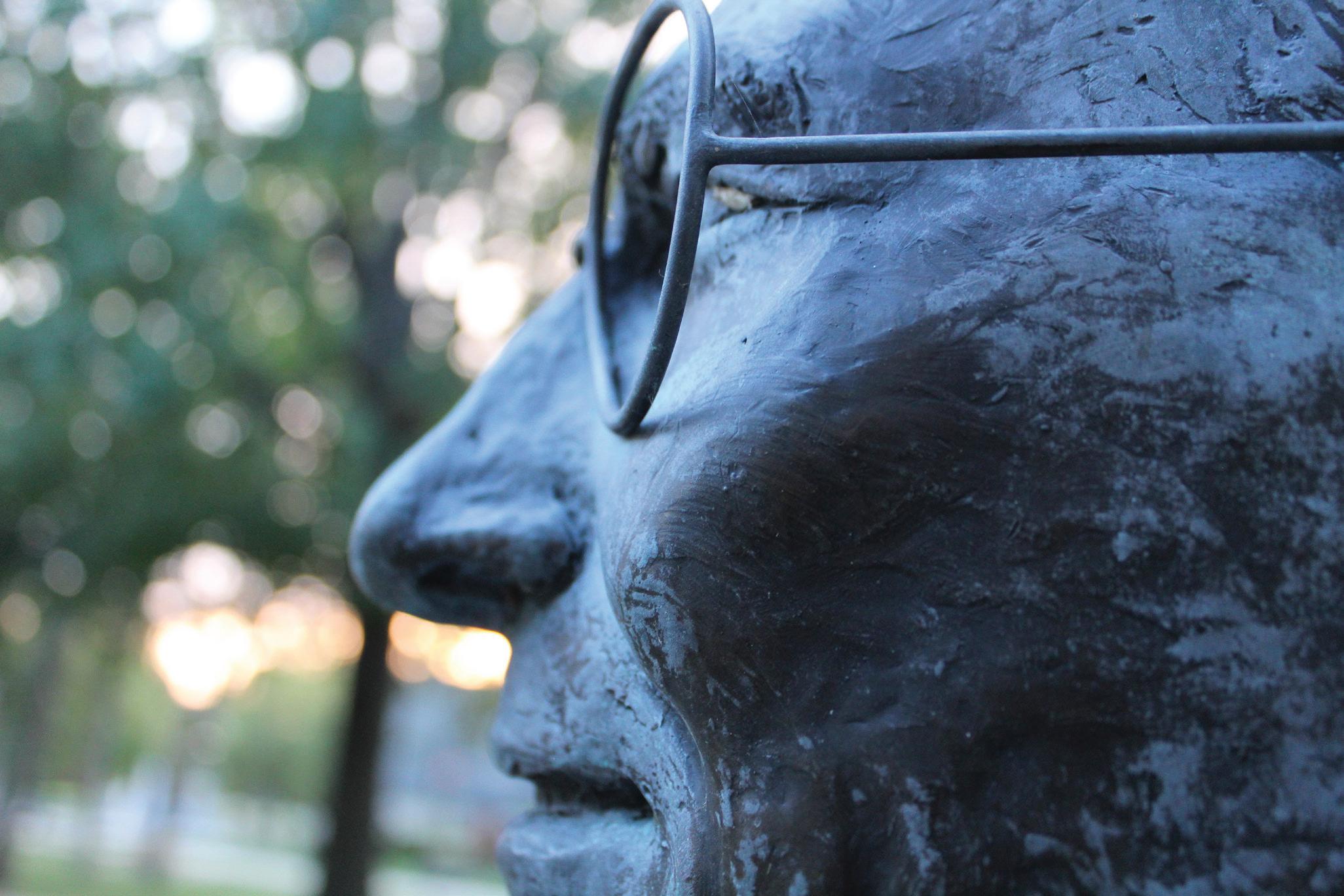
Carnegie Closeup
By Preston Brouillet, ’24
Preston Brouillet of O’Fallon, Missouri, is a May graduate of the University of Central Missouri’s THRIVE program. He followed in the footsteps of an older sister and cousin who also attended UCM.
In their second year of the THRIVE program, students do an internship each semester. Brouillet worked at the front desk of UCM’s Office of Student Activities. Something he did above and beyond his job duties was take photos of student life on campus.
Brouillet took this photo for an assignment in UCM Art and Design Associate Professor Jeremy Underwood’s Photography 1 class in fall 2023. Underwood applied for and received a donor-funded Opportunity Grant in 2023 to develop a Photography Equipment Suite for students.
The suite includes a cutting machine, digital-to-analog Polaroid lab, portable projector and motion-tracking camera to provide students access to a diverse contemporary tool set in one space.
“The photography equipment suite has provided students with an expanded skill set, allowing for more complex and nuanced creations in their art-making process not previously seen before,” Underwood says. “Student interest in these new tools is high, promoting stronger student engagement and providing a more active learning environment.”
Want to show off your photos? Parting Shots are open to alumni! Submit your UCM-related photography to ucmmagazine@ucmo.edu for a chance to be featured.
44 Spring 2024 | ucmfoundation.org/magazine

IT’S BEEN A MINUTE!
Is your information out of date? Let’s catch up!
To update your information and be sure you are receiving event invitations, our MuleNation Monthly e-newsletter and announcements from your alma mater, visit ucmfoundation.org/update.
Do you have news to share?
Submit a Class Note!
If you have earned a promotion, taken a new job, retired or received recognition within the past year, let your alumni community know. Submit your announcement, along with a photo, for potential inclusion in the magazine at ucmfoundation.org/class-notes.
Student riding hoverboard
Squirrel breaking through rocks
Fish bowl on table in place of ashtray
Rug in center of room
Headset on man on back couch
Ostrich peeking through railing
Metal versus wooden railing
iPad and headphones on table in place of ashtray
Red loveseat in back of room
Clock on wall in back of room
Red chair across from couple by windows
Additional ceiling lights
Painting on back wall
Bonsai tree on table in center
Two coffee cups on same table*
Flat-screen monitor on back wall

Spot the Differences Answer Key from page 29 1 1 2 3 4 5 6 7 8 9 10 11 12 13 14 15 16 2 3 4 5 6 7 8 9 10 12 11 16 13 14 15 *Fun Fact: The back wall is now a Starbucks!
P.O. BOX 800 WARRENSBURG, MO 64093-5038
If this is addressed to an alum who no longer maintains a permanent address at your home, please notify the UCM Alumni Foundation at alumni@ucmo.edu or 660-543-8000.
Spring 2024 | ucmfoundation.org/magazine
Together, we redefine opportunity so students can define their future Make a gift to the Central Annual Fund to invest in the university’s greatest needs and prepare students for a future where anything is possible. Visit ucmfoundation.org/give/magazine.
46
Non-Profit Organization U.S. POSTAGE PAID Warrensburg, MO 64093 Permit No.
102











 Roger J. Best, Ph.D. UCM President
Roger J. Best, Ph.D. UCM President


 Members of the fledgling team at the 2000 ACJA-LAE Regional Championship in Sheridan, Wyoming: from left, Erin Pape, Greg Roman, Melissa Bauer, Eric Doerflen, Scott Chenault, Chris Peterein, Johan Nystrom, Brian Lick, Josh Peery and Jordan Hargove (kneeling).
Students who led UCM’s LAE team at the 2000 Regional Conference: Scott Chenault, vice president; Erin Pape, secretary; and Darrell Schmidli, president.
Members of the fledgling team at the 2000 ACJA-LAE Regional Championship in Sheridan, Wyoming: from left, Erin Pape, Greg Roman, Melissa Bauer, Eric Doerflen, Scott Chenault, Chris Peterein, Johan Nystrom, Brian Lick, Josh Peery and Jordan Hargove (kneeling).
Students who led UCM’s LAE team at the 2000 Regional Conference: Scott Chenault, vice president; Erin Pape, secretary; and Darrell Schmidli, president.




















 By Rebecca Herold, ’83
By Rebecca Herold, ’83










































 “Charlie Schwepker, Randall and Kelly Harbert Marketing Professor
“Charlie Schwepker, Randall and Kelly Harbert Marketing Professor

 Zaid Mahir, Assistant Professor of English
Zaid Mahir, Assistant Professor of English



 Lauren Hays, Associate Professor of Educational Technology
Lauren Hays, Associate Professor of Educational Technology







































































































